By Prof. A. P. Buddhadatta, Maha Nayaka Thera
Seventh Edition第7版
(Published by Singapore Buddhist Meditation Centre, 1998)
Foreword前言
By Dr. G. P. Malalasekara
University College, Colombo
I consider it a great honour that I should have been asked to write this foreword. The eminence of Rev. A. P. Buddhadatta Thera as a scholar is far too well-known in Ceylon and elsewhere for his work to need any commendation from others. His books, particularly the Pālibhāshāvataraṇa, have for many years now been a great boon to students of Pali. The fact that they are written in Sinhalese has, however, restricted their use only to those acquainted with the language. Rev. Buddhadatta has by this present publication removed that disability. As a teacher of Pali, chiefly through the medium of English, I welcome this book with great cordiality for it would considerably lighten my labours. It fulfils a great need and I wish it success with all my heart. I would also congratulate the publishers on their enterprise in a new field.
G. P. Malalasekara.
University College, Colombo.
17th June, 1937.
Preface序言
Pali is the language in which the oldest Buddhist texts were composed. It originated in the ancient country of Magadha which was the kingdom which was the kingdom of Emperor Asoka and the centre of Buddhistic learning during many centuries. Pali is older than classical Sanskrit, and a knowledge of it is very useful to students of philology and ancient history. It is still the classical language of the Buddhists of Ceylon, Burma and Siam.
During the latter half of the last century some European scholars became interested in the study of Pali and wrote some articles and books to encourage the study of it. At the same time the publication of Pali Texts in Europe was begun through the efforts of Professors V. Fausboll, H. Oldenberg and T. W. Rhys Davids. Thanks to the indefatigable labours of the last mentioned scholar and the Pali Text Society, which he established some fifty years ago, the whole of the Pali Canon (of the Theravāda School) is now found in print.
Pali is now taught in many universities both in the East and the West. There is also a desire all over the civilized world at the present day to read the original Pali Texts in order to find out what the Buddha has preached to mankind 25 centuries ago and to see what historical and philosophical treasures are enshrined therein. Therefore, to facilitate the study of Pali, some modern scholars have compiled Pali courses, grammars and readers according to modern methods. Of these the Pali Grammar by Chas. Duroiselle, formerly Professor of Pali at Rangoon College, still stands unrivalled. Gray’s Pali Course has done much service for a long time to students in India and Burma; and S. Sumangala’s Pali Course has done the same to students in Ceylon.
Although such books were written in European languages hardly any appeared in Sinhalese. Here they studied Pali through books which were written many centuries ago. Therefore, about 1920, when some schools in Ceylon began to teach Pali, the great difficulty before them was the lack of suitable books. Then, requested and encouraged by Mr. P. de S. Kularatna, Principal, Ananda College, I compiled Pālibhāshāvataraṇa (I, Ī, ĪI) in Sinhalese to teach Pali grammar and composition to beginners. It was a success; the demand for the first book necessitated the publisher to bring out three editions of it within eleven years from 1923 to 1934. (ed. Now it is in the eleventh edition)
Many complimented the work. Recently there came a request from Burma for permission to translate the same into Burmese. Some suggested to me to write it in English as the books already mentioned did not satisfy them; but I dared not to do it as my knowledge of English was insufficient for such a task. But finally I was prevailed upon by Dr. G. C. Mendis to produce this volume.
This is not a literal translation of the Sinhalese edition, but a different compilation on the same lines. To understand the nature of the work it is enough to quote from the report, sent to me by the “Text Book Committee” of the Education Department of Ceylon, on the Sinhalese one: “This is a book for teaching Pali to beginners through the medium for Sinhalese. The method adopted is the modern one of teaching the languages through composition. The lessons are well graded and practical. This supplies a long felt want… We should recommend it for use in schools as an introduction to the study of Pali”.
My thanks are due, first of all, to Dr. G. C. Mendis, who very kindly assisted me in many ways to bring out this volume; secondly to Dr. G. P. Malalasekara, Lecturer in Oriental Languages, Ceylon University College, for his Foreword, and lastly to the Colombo Apothecaries’ Co., Ltd., for the publication of this volume.
A. P. BUDDHADATTA
Aggārāma,
Ambalangoda,
15th June, 1937.
The New Pali Course-First Book
The Alphabet字母表
1.The Pali alphabet consists of 41 letters, eight vowels and thirty-three consonants.
Vowels元音
a, ā, i, ī, u, ū, e, o
Consonants辅音
第一行: k, kh, g, gh, ṅ
第二行: c, ch, j, jh, ñ
第三行: ṭ, ṭh, ḍ, ḍh, ṇ
第四行: t, th, d, dh, n
第五行: p, ph, b, bh, m
第六行: y, r, l, v, s, h, ḷ, ṃ
2. Of the vowels a, i, u are short; the rest are long.
Although e and o are included in long vowels they are often sounded short before a double consonant, e.g. mettā, seṭṭhī, okkamati, yottaṃ[1].
*[1] Wide Book Ī for further treatment of letters.
Pronunciation读音
3. Pronunciation读音
a is pronounced like a in what or u in hut
ā is pronounced like a in father
i is pronounced like i in mint
ī is pronounced like ee in see
u is pronounced like u in put
ū is pronounced like oo in pool
e is pronounced like a in cage
o is pronounced like o in no
k is pronounced like k in kind (这是欧洲人的读音,实际不等于英文的k,而是等于汉语拼音的g)
kh is pronounced like kh in blackheath
g is pronounced like g in game
gh is pronounced like gh in big house
ṅ is pronounced like ng in singer
c is pronounced like ch in chance(这是欧洲人的读法,实际不等于英语的ch,而像汉语拼音的j)
ch is pronounced like ch h in witch-hazel
jh is pronounced like dge h in sledge-hammer
ñ is pronounced like gn in signore
ṭ is pronounced like t in cat
ṭh is pronounced like th in ant-hill
ḍ is pronounced like d in bad
ḍh is pronounced like dh in red-hot
ṇ is pronounced like kn in know
t is pronounced like th in thumb (这是欧洲人的读音,实际等于汉语拼音的d)
th is pronounced like th in pot-herb
d is pronounced like th in then
dh is pronounced like dh in adherent
ph is pronounced like ph in uphill
bh is pronounced like bh in abhorrence
y is pronounced like y in yes
s is pronounced like s in sight
ṃ is pronounced like ng in sing
j, n, p, b, m, r, l, v and h are pronounced just as they are pronounced in English (巴利的p实际不等于英文的p,而是等于汉语拼音的b).
Parts of Speech词类部分
4. In English, there are 8 parts of speech. They are all found in Pali, but the Pali grammarians do not classify them in the same way. Their general classification is:
- Nāma = noun
- Ākhyāta = verb
- Upasagga = prefix
- Nipāta = indeclinable particle
Pronouns and adjectives are included in the first group. Adjectives are treated as nouns because they are declined like nouns.
Conjunctions, prepositions, adverbs and all other indeclinables are included in the fourth group.
Gender, Number and Case性、数和格
5. There are in Pali as in English three genders and two numbers.
Gender
- Pulliṅga = Masculine
- Itthiliṅga = Feminine
- Napuṃsakaliṅga = Neuter
Number
- Ekavacana = Singular
- Bahuvacana = Plural
6. Nouns which denote males are masculine; those which denote females are feminine; but nouns which denote inanimate things and qualities are not always neuter, e.g. rukkha (tree), canda (moon) are masculine. Nadī (river), latā (vine), paññā (wisdom) are feminine. Dhana (wealth), citta (mind) are neuter.
Two words denoting the same thing may be, sometimes, in different genders; pāsāṇa and silā are both synonyms for a stone, but the former is masculine, and the latter is feminine. Likewise one word, without changing its form, may possess two or more genders; e.g. geha (house) is masculine and neuter, kucchi (belly) is masculine and feminine.
Therefore, it should be remembered that gender in Pali is a grammatical distinction existing in words, it is called grammatical gender.
7. There are eight cases, namely:
- Paṭhamā = Nominative
- Dutiyā = Accusative
- (a) Tatiyā = Ablative of agent, and(b) Karaṇa = Ablative of instrument
- Catutthī = Dative
- Pañcamī = Ablative of separation
- Chaṭṭhī = Possessive or Genitive
- Sattamī = Locative
- Ālapana = Vocative
The Ablative in English is here divided into Tatiyā, Karaṇa and Pañcamī. But, as Tatiyā and Karaṇa always have similar forms both of them are shown under “Instrumental”. Where only the “Ablative” is given the reader must understand that all (3) forms of the Ablative are included.
Declension of Nouns名词的词尾变化
8. Nouns in Pali are differently declined according to their gender and termination.
Nara is a masculine stem, ending in -a.
It is to be declined as follows:-
| Case |
Singular |
Plural |
| Nominative |
naro = man |
narā = men |
| Accusative |
naraṃ = man |
nare = men |
| Instrumental |
narena = by, with or through man |
narebhi, narehi = by, with or through men |
| Dative |
narāya, narassa = to or for man |
narānaṃ = to or for men |
| Ablative |
narā, naramhā, narasmā = from man |
narebhi, narehi = from men |
| Genitive |
narassa = of man |
narānaṃ = of men |
| Locative |
nare, naramhi, narasmiṃ = on or in man |
naresu = on or in men |
| Vocative |
nara, narā = O man |
narā = O men |
Some of the stems similarly declined are:-
- purisa = man
- manussa = human being
- hattha = hand
- pāda = leg; foot
- kāya = body
- rukkha = tree
- pāsāṇa = rock; stone
- gāma = village
Buddha = the Enlightened One
dhamma = doctrine
saṅgha = community
āloka = light
loka = world
ākāsa = sky
suriya = sun
canda = moon
- magga = path
- putta = son
- kumāra = boy
- vāṇija = merchant
- cora = thief
- mitta = friend
- dāsa = slave
- bhūpāla = king
- kassaka = farmer
- lekhaka = clerk
- deva = god; deity
- vānara = monkey
- vihāra = monastery
- dīpa = island; lamp
- mañca = bed
- āhāra = food
- sīha = lion
- miga = deer; beast
- assa = horse
- goṇa = ox
- sunakha = dog
- varāha = pig
- sakuṇa = bird
- aja = goat
- kāka = crow
9. Inflections or case-endings of the above declension are:
| Case |
Singular |
Plural |
| Nominative |
o |
ā |
| Accusative |
ṃ |
e |
| Instrumental |
ena |
ebhi; ehi |
| Dative |
āya; ssa |
ānaṃ |
| Ablative |
ā; mhā; smā |
ebhi; ehi |
| Genitive |
ssa |
ānaṃ |
| Locative |
e; mhi; smiṃ |
esu |
| Vocative |
a; ā |
ā |
The last vowel of the stem should be elided before an inflection which begins with a vowel.
Exercise 1
Suggested Solutions
Translate into English
- Manussānaṃ.
- Purise.
- Hatthaṃ.
- Pādamhi.
- Kāyena.
- Buddhesu.
- Dhammaṃ.
- Saṅghamhā.
- Suriye.
- Rukkhassa.
- Ākāsena.
- Bhūpālebhi.
- Devā.
- Candaṃ.
- Gāmasmā.
- Goṇāya.
- Sīhānaṃ.
- Asso.
- Sakuna.
- Mañcasmiṃ.
Translate into Pali
- The dogs.
- Of the hand.
- On the men.
- From the tree.
- In the islands.
- With the foot.
- By the hands.
- To the lion.
- Of the oxen.
- From the birds.
- By the king.
- O deity.
- To the sun.
- In the sky.
- Through the body.
- On the bed.
- Of the moons.
- In the world.
- The monkey.
- Through the light.
Exercise 2
Suggested Solutions
Translate into English
- Purisassa goṇo.
- Manussānaṃ hatthā.
- Ākāsamhi sakuṇā.
- Buddhassa dhammo.
- Mañcesu manussā.
- Assānaṃ pādā.
- Rukkhe sakuṇo.
- Pāsāṇamhi goṇo.
- Lokasmiṃ manussā.
- Bhūpālassa dīpā.
Translate into Pali
- The body of the ox.
- The bird on the tree.
- The island of the world.
- With the feet of the man.
- By the hand of the monkey.
- Of the birds in the sky.
- In the doctrine of the Buddha.
- The villages of the king.
- The birds from the tree.
- The horse on the path.
Remark.
In translating these into Pali, the articles should be left out. There are no parallel equivalents to them in Pali. But it should be noted that the pronominal adjective “ta” (that) may be used for the definite article, and “eka” (one) for the indefinite. Both of them take the gender, number, and case of the nouns they qualify. (See §§46 and 48).
Conjugation of Verbs动词的变形
10. There are three tenses, two voices, two numbers, and three persons in the conjugation of Pali verbs.
Tense
- Vattamānakāla = Present Tense
- Atītakāla = Past Tense
- Anāgatakāla = Future Tense
Voice
- Kattukāraka = Active Voice
- Kammakāraka = Passive Voice
Person
- Paṭhamapurisa = Third Person
- Majjhimapurisa = Second Person
- Uttamapurisa = First Person
The first person in English is third in Pali.
Numbers are similar to those of nouns.
11. There is no attempt to conjugate the Continuous, Perfect, and Perfect Continuous tenses in Pali; therefore only the indefinite forms are given here.
Conjugation of the Root Paca (to cook)
Paca的变形
12. Indicative, Present Active Voice现在时·主动语态
| Person |
Singular |
Plural |
| Third |
(So) pacati = he cooks |
(Te) pacanti = they cook |
| Second |
(Tvaṃ) pacasi = thou cookest |
(Tumhe) pacatha = you cook |
| First |
(Ahaṃ) pacāmi = I cook |
(Mayaṃ) pacāma = we cook |
13. The base bhava (to be) from the root bhū is similarly conjugated. ?
| Person |
Singular |
Plural |
| Third |
(So) bhavati = he is |
(Te) bhavanti = they are |
| Second |
(Tvaṃ) bhavasi = thou art |
(Tumhe) bhavatha = you are |
| First |
(Ahaṃ) bhavāmi = I am |
(Mayaṃ) bhavāma = we are |
The following are conjugated similarly:-
gacchati = goes
tiṭṭhati = stands
nisīdati = sits
sayati = sleeps
carati = walks
dhāvati = runs
passati = sees
bhuñjati = eats
bhāsati = says
harati = carries
āharati = brings
kīḷati = plays
vasati = lives
hanati = kills
āruhati = ascends
hasati = laughs
yācati = begs
Exercise 3
Suggested Solutions
Translate into English
- Narā suriyaṃ passanti.
- Goṇā pāsāṇe tiṭṭhanti.
- Manusso gāme carati.
- Sakuṇo rukkhe nisīdati.
- Buddho dhammaṃ bhāsati.
- Ahaṃ dīpaṃ āharāmi.
- Mayaṃ goṇe harāma.
- Saṅgho gāmaṃ gacchati.
- Tvaṃ sīhaṃ passasi.
- Bhūpālā asse āruhanti.
- Devā ākāsena gacchanti.
- Assā dīpesu dhāvanti.
- Tvaṃ pādehi carasi.
- Tumhe hatthehi haratha.
- Mayaṃ loke vasāma.
- Sunakhā vānarehi kiḷanti.
- Puriso mañce sayati.
- Varāhā ajehi vasanti.
- Sīhā sakuṇe hananti.
- Sunakhā gāme caranti.
Translate into Pali
- The horse stands on the rock.
- The goats walk in the village.
- You see the sun.
- The moon rises in the sky.
- The men sleep in beds.
- The oxen run from the lion.
- People live in the world.
- Thou bringest a lamp.
- We live in an island.
- Thou art a king.
- You see the bird on the tree.
- The monkey plays with the pig.
- The king kills a lion.
- The deity walks in the sky.
- Trees are in the island.
- He carries the lamp.
- We see the body of the man.
- We eat with the hands.
Different Conjugations不同的变形
14. There are seven different conjugations in Pali; they are called dhātugaṇas (= groups of roots). The Pali grammarians represent roots with a final vowel, but it is often dropped or changed before the conjugational sign. Each dhātugaṇa has one or more different conjugational signs, which come between the root and the verbal termination.
The seven conjugations and their signs are:
1st Conjugation = Bhuvādigaṇa: a
2nd Conjugation = Rudhādigaṇa: ṃ-a
3rd Conjugation = Divādigaṇa: ya
4th Conjugation = Svādigaṇa: ṇo, ṇu, uṇā
5th Conjugation = Kiyādigaṇa: nā
6th Conjugation = Tanādigaṇa: o, yira
7th Conjugation = Curādigaṇa: e, aya
A great number of roots are included in the first and the seventh group. The roots paca and bhū, given above, belong to the first conjugation. The last vowel of “paca” is dropped before the conjugation sign a.
The monosyllabic roots like bhū do not drop their vowel. It is guṇated or strengthened before the conjugational sign:
i or ī strengthened becomes e
u or ū strengthened becomes o
e.g. Nī + a becomes Ne + a;
Bhū + a becomes Bho + a
Then e followed by a is changed into ay
and o followed by a is changed into av
e.g. Ne + a becomes naya;
Bho + a becomes bhava
It is not necessary for a beginner to learn how these bases are formed. But the bases will be given very often for the convenience of the students. The base is the root with its conjugational sign combined.
The Seventh Conjugation第七类动词的变形
15. The special feature of the first conjugation is that the last vowel of the base is strengthened before the First Personal endings.
The same rule is applied for the bases ending with a of the 2nd, 3rd, 6th and 7th conjugations, in addition to their special features.
The bases of the seventh conjugation are of two kinds as it has two conjugational signs, e.g. from the root pāla two bases pāle and pālaya are formed.
Conjugation of Pāla (to protect or govern)
Indicative, Present, Active Voice
Base: Pāle
| Person |
Singular |
Plural |
| Third |
pāleti |
pālenti |
| Second |
pālesi |
pāletha |
| First |
pālemi |
pālema |
Base: Palaya
| Person |
Singular |
Plural |
| Third |
pālayati |
pālayanti |
| Second |
pālayasi |
pālayatha |
| First |
pālayāmi |
pālayāma |
Some of the similarly conjugated are:
jāleti = kindles
māreti = kills
oloketi = looks at
coreti = steals
deseti = preaches
cinteti = thinks
pūjeti = offers, respects
uḍḍeti = flies
pīḷeti = oppresses
udeti = (the sun or moon) rises
pāteti = fells down
ṭhapeti = keeps
16. The conjugational sign ṇā of the fifth group is shortened in the Third Person plural.
Base: Vikkina = To sell
| Person |
Singular |
Plural |
| Third |
vikkiṇāti |
vikkiṇanti |
| Second |
vikkiṇāsi |
vikkiṇātha |
| First |
vikkiṇāmi |
vikkiṇāma |
The following are similarly conjugated:-
kiṇāti = buys
jānāti = knows
suṇāti = hears
jināti = wins
miṇāti = measures
gaṇhāti = takes
uggaṇhāti = learns
ocināti = gathers (together), collects
Exercise 4
Suggested Solutions
Translate into English
- Puttā dhammaṃ uggaṇhanti.
- Sīho migaṃ māreti.
- Vāṇijassa putto goṇe vikkiṇāti.
- Mayaṃ vāṇijamhā mañce kiṇāma.
- Lekhako mittena magge gacchati.
- Dāsā mittānaṃ sunakhe haranti.
- Kassako goṇe kiṇāti.
- Kākā ākāse uḍḍenti.
- Vāṇijā Buddhassa dhammaṃ suṇanti.
- Corā mayūre* corenti.
- Ahaṃ Buddhaṃ pūjemi.
- Tvaṃ dīpaṃ jālehi.
- Dāso gonaṃ pīḷeti.
- Tumhe magge kassakaṃ oloketha.
- Mayaṃ dhammaṃ jānāma.
Translate into Pali
- The robber steals an ox.
- The clerk’s son buys a horse.
- Merchants sell lamps.
- He knows the friend’s son.
- Boys learn in the village.
- Peacocks are on the road.
- The slave lights a lamp.
- Lions kill deer.
- The king governs the island.
- Birds fly in the sky.
- We see the sons of the merchant.
- Look at the hands of the man.
- You hear the doctrine of the Buddha.
- They respect (or make offerings to) the community.
- The monkey teases (or oppresses) the birds.
* Mayūra = peacock.
17. Masculine stems ending in i以i结尾的阳性名词
Declension of Aggi (Fire)
| Case |
Singular |
Plural |
| Nominative, Vocative |
aggi |
aggi, aggayo |
| Accusative |
aggiṃ |
aggī, aggayo |
| Instrumental |
agginā |
aggībhi, aggīhi |
| Dative, Genitive |
aggino, aggissa |
aggīnaṃ |
| Ablative |
agginā, aggimhā, aggismā |
aggībhi; aggīhī |
| Locative |
aggimhi, aggismiṃ |
aggīsu |
The following are similarly declined:-
muni = monk
kavi = poet
isi = sage; hermit
ari = enemy
bhūpati = king
pati = husband; master
gahapati = householder
adhipati = lord; leader
atithi = guest
vyādhi = sickness
udadhi = ocean
vīhi = paddy
kapi = monkey
ahi = serpent
dīpi = leopard
ravi = sun
giri = mountain
maṇi = gem
yaṭṭhi = stick
nidhi = hidden treasure
asi = sword
rāsi = heap
pāṇi = hand
kucchi = belly
muṭṭhi = fist, hammer
bodhi = Bo-tree
More verbs conjugated like pacati:
khaṇati = digs
chindati = cuts
likhati = writes
labhati = gets
āgacchati = comes
āhiṇḍati = wanders
vandati = bows down
paharati = beats
ḍasati = bites
Exercise 5
Suggested Solutions
Translate into English
- Muni dhammaṃ bhāsati.
- Gahapatayo vīhiṃ miṇanti.
- Ahi adhipatino hattaṃ ḍasati.
- Isi pāṇinā maṇiṃ gaṇhāti.
- Dīpayo girimhi vasanti.
- Ari asinā patiṃ paharati.
- Kavayo dīpamhi nidhiṃ khaṇanti.
- Tvaṃ atithīnaṃ āhāraṃ desi.
- Tumhe udadhimhi kīḷatha.
- Vyādhayo loke manusse pīlenti.
- Kapi ahino kucchiṃ paharati.
- Kavino muṭṭhimhi maṇayo bhavanti.
- Ravi girimhā udeti.
- Ahaṃ vīhīnaṃ rāsiṃ passāmi.
- Mayaṃ gāme āhiṇḍāma.
Translate into Pali
- Leopards kill deer.
- The sage comes from the mountain.
- There is* a sword in the enemy’s hand.
- There are** gems in the householder’s fist.
- We give food to the guest.
- The farmer’s sons measure a heap of paddy.
- The serpent gets food from the poet.
- The monks kindle a fire.
- The householder gets a gem from the leader.
- The monkeys on the tree strike the leopard.
- The leader strikes the enemy with a sword.
- The sages look at the sun.
- We get paddy from the husband.
- The sickness oppresses the sons of the guest.
- I see the sun upon the sea.
* There is = bhavati.
** There are = bhavanti.
[20090723星期三******]
Past Tense过去时
18. Conjugation of Paca (to cook)
Past Indefinite, Active一般过去时·主动语态
| Person |
Singular |
Plural |
| Third |
(So) apacī, pacī, apaci, paci = he cooked |
(Te) apaciṃsu, paciṃsu, apacuṃ, pacuṃ = they cooked |
| Second |
(Tvaṃ) apaco, paco = thou didst cook |
(Tumhe) apacittha, pacittha = you cooked |
| First |
(Ahaṃ) apaciṃ, paciṃ = I cooked |
(Mayaṃ) apacimha, pacimha, apacimhā, pacimhā = we cooked |
The following are similarly conjugated:-
gacchi = went
gaṇhi = took
dadi = gave
khādi = ate
hari = carried
kari = did
āhari = brought
dhāvi = ran
kiṇi = bought
vikkiṇi = sold
nisīdi = sat
sayi = slept
āruhi = ascended; climbed
acari = walked; travelled
The prefix a is not to be added to the bases beginning with a vowel.
19. The verbs of the seventh group are differently conjugated:
Past Indefinite, Active
Pāla (to protect)
| Person |
Singular |
Plural |
| Third |
pālesi, pālayi |
pālesuṃ, pālayuṃ, pālayiṃsu |
| Second |
pālayo |
pālayittha |
| First |
pālesiṃ, pālayiṃ |
pālayimha, pālayimhā |
The following are similarly conjugated:-
māresi = killed
jālesi = kindled
desesi = preached
ānesi = brought
coresi = stole
pūjesi = offered; respected
nesi = carried
thapesi = kept
cintesi = thought
pīḷesi = oppressed
kathesi = told
pātesi = dropped down or felled
Exercise 6
Suggested Solutions
Translate into English
- Munayo mañcesu nisīdiṃsu.
- Ahaṃ dīpamhi acariṃ.
- Corā gahapatino nidhiṃ coresuṃ.
- Mayaṃ bhūpatino asiṃ olokayimha.
- Tvaṃ atithino odanaṃ adado.
- Adhipati vāṇijamhā maṇayo kiṇi.
- Pati kassakaṃ vīhīṃ yāci.
- Isayo kavīnaṃ dhammaṃ desesuṃ.
- Kapayo girimhā rukkhaṃ dhāviṃsu.
- Vāṇijā udadhimhi gacchiṃsu.
- Mayaṃ maggena gāmaṃ gacchimha.
- Dīpi kapiṃ māresi.
- Tumhe patino padīpe gaṇhittha.
- Ahaṃ Buddhassa pāde pūjesiṃ.
- Kavayo kapīnaṃ odanaṃ dadiṃsu.
- Arayo asī ānesuṃ.
- Ahi kapino pāṇiṃ dasi.
- Mayaṃ girimhā candaṃ passimha.
- Tumhe munīnaṃ āhāraṃ adadittha.
- Bhūpati nidhayo pālesi.
Translate into Pali
- The slave struck the enemy with a sword.
- We got food from the householder.
- He carried a monkey to the mountain.
- The merchants went to the village by the road.
- Birds flew to the sky from the tree.
- The thieves stole the gems of the king.
- I gave food to the sages.
- The sons of the poet heard the doctrine from the monk.
- I saw the leopard on the road.
- The lion killed the deer on the rock.
- They saw the mountain on the island.
- The boy went to the sea.
- The dogs ran to the village.
- The merchant bought a horse from the leader.
- The guest brought a gem in (his) fist.
- The monkey caught the serpent by (its) belly.
- The householder slept on a bed.
- We dwelt in an island.
- The boy struck the monkey with (his) hands.
- I saw the king’s sword.
N.B. — The verbs implying motion govern the Accusative; therefore “to the mountain” in the 3rd, and “to the village” in the 13th must be translated with the Accusative as: giriṃ, gāmaṃ.
But “to the sages” in the 7th must be in the Dative, because the person to whom some thing is given is put in the Dative.
The New Pali Course Book 1
Personal Pronouns人称代(名)词
20. Two personal pronouns amha and tumha are declined here because of their frequent usage. There are of the common gender and have no vocative forms.
- The First Personal “Amha”
| Case |
Singular |
Plural |
| Nom. |
ahaṃ = I |
mayaṃ, amhe = we |
| Acc. |
maṃ, mamaṃ = me |
amhe, amhākaṃ, no = us |
| Ins. |
mayā, me |
amhebhi, amhehi, no |
| Dat., Gen. |
mama, mayhaṃ, me, mamaṃ |
amhaṃ, amhākaṃ, no |
| Abl. |
mayā |
amhebhi, amhehi |
| Loc. |
mayi |
amhesu |
- The Second Personal “Tumha”
| Case |
Singular |
Plural |
| Nom. |
tvaṃ, tuvaṃ = thou |
tumhe = you |
| Acc. |
taṃ, tavaṃ, tuvaṃ = thee |
tumhe, tumhākaṃ, vo = you |
| Ins. |
tvayā, tayā, te |
tumhebhi, tumhehi, vo |
| Dat., Gen. |
tava, tuyhaṃ, te |
tumhaṃ, tumhākaṃ, vo |
| Abl. |
tvayā, tayā |
tumhebhi, tumhehi |
| Loc. |
tvayi, tayi |
tumhesu |
N.B. — Te, me and vo, no should not be used at the beginning of a sentenced.
Note. — The word for “not” in Pali is na or no; the word for “is not” or “has not” is natthi.
Exercise 7
Suggested Solutions
Translate into English
- Ahaṃ mayhaṃ puttassa assaṃ adadiṃ.
- Tvaṃ amhākaṃ gāmā āgacchasi.
- Mayaṃ tava hatthe passāma.
- Mama puttā giriṃ āruhiṃsu.
- Tumhākaṃ sunakhā magge sayiṃsu.
- Amhaṃ mittā coraṃ asinā pahariṃsu.
- Tumhaṃ dāsā arīnaṃ asse hariṃsu.
- Coro mama puttassa maṇayo coresi.
- Isayo mayhaṃ gehe na vasiṃsu.
- Kavi tava puttānaṃ dhammaṃ desesi.
- Amhesu kodho* natthi.
- Tumhe vāṇijassa mayūre kiṇittha.
- Mayaṃ bhūpatino mige vikkiṇimha.
- Gahapatino putto maṃ pahari.
- Adhipatino dāsā mama goṇe pahariṃsu.
- Ahaṃ tumhākaṃ vīhī na gaṇhiṃ.
- Dīpī gāmamhā na dhāvi.
- Tumhe ahayo na māretha.
- Mayaṃ atithīnaṃ odanaṃ pacimha.
- Kapayo maṃ āhāraṃ yāciṃsu.
Translate into Pali
- I sold my gems to a merchant.
- We gave our oxen to the slaves.
- You bought a sword from me.
- (You) don’t beat monkeys with your hands.
- The leader brought a lion from the mountain.
- The monk preached the doctrine to you.
- We gave food to the serpents.
- The slaves of the householder carried our paddy.
- You did not go to the sea.
- There are no gems in my fist.
- The poet’s son struck the dog with a stick.
- Our sons learnt from the sage.
- Your monkey fell down from a tree.
- My dog went with me to the house.
- A serpent bit my son’s hand.
- The leopard killed a bull on the road.
- My friends looked at the lions.
- We did not see the king’s sword.
- I did not go to the deer.
- Thou buyest a peacock from the poet.
* kodha = anger (m)
Future Tense将来时
- Conjugation of Paca (to cook)
Future indicative, Active.
| Person |
Singular |
Plural |
| Third |
(so) pacissati = he will cook |
(te) pacissanti = they will cook |
| Second |
(tvaṃ) pacissasi = thou wilt cook |
(tumhe) pacissatha = you will cook |
| First |
(ahaṃ) pacissāmi = I shall cook |
(mayaṃ) pacissāma = we shall cook |
The following are conjugated similarly:-
- gamissati = he will go
- bhuñjissati = he will eat
- harissati = he will carry
- vasissati = he will live
- dadissati = he will give
- karissati = he will do
- passissati = he will see
- bhāyissati = he will fear
All verbs given in the Present Tense may be changed into Future by inserting issa between the base and the termination, and dropping the last vowel of the base, e.g. bhuñja + ti >> bhuñj + issa + ti = bhuñjissati.
- Declension of masculine nouns ending in ī
以ī结尾的阳性名词的词尾变化(名词之III)
Pakkhī (Bird)
| Case |
Singular |
Plural |
| Nom., Voc. |
pakkhī |
pakkhī, pakkhino |
| Acc. |
pakkhinaṃ, pakkhiṃ |
pakkhī, pakkhino |
| Ins. |
pakkhinā |
pakkhībhi, pakkhīhi |
| Dat., Gen. |
pakkhino, pakkhissa |
pakkhīnaṃ |
| Abl. |
pakkhinā, pakkhimhā, pakkhismā |
pakkhībhi, pakkhīhi |
| Loc. |
pakkhini, pakkhimhi, pakkhismiṃ |
pakkhīsu |
Some of the similarly declined are:-
- hatthī = elephant
- sāmī = lord
- kuṭṭhī = leper
- dāṭhī = tusker
- bhogī = serpent
- pāpakārī = evil-doer
- dīghajīvī = possessor of a long live
- seṭṭhī = millionaire
- bhāgī = sharer
- sukhī = receiver of comfort, happy
- mantī = minister
- karī = elephant
- sikhī = peacock
- balī = a powerful person
- sasī = moon
- chattī = possessor of an umbrella
- mālī = one who has a garland
- sārathī = charioteer
- gaṇī = one who has a following
Exercise 8
Suggested Solutions
Translate into English
- Mantī hatthinaṃ āruhissati.
- Mayaṃ seṭṭhino gehaṃ gamissāma.
- Tvaṃ sāmino puttassa kapiṃ dadissasi.
- Gaṇino sukhino bhavissanti.
- Amhākaṃ sāmino dīghajīvino na bhavanti.
- Pāpakārī yaṭṭhinā bhogiṃ māresi.
- Mama puttā seṭṭhino gāme vasissanti.
- Kuṭṭhī sārathino pādaṃ yaṭṭhinā pahari.
- Sikhī chattimhā bhāyissati.
- Sārathī asse gāmamhā harissati.
- Tumhe mālīhi sasinaṃ olokessatha.
- Balī dāṭhino kāyaṃ chindissati.
- Amhākaṃ mantino balino abhaviṃsu.
- Seṭṭhino mālino passissanti.
- Mayaṃ gehe odanaṃ bhuñjissāma.
Translate into Pali
- Our lord went to the minister.
- The millionaire will be the possessor of a long life.
- Evil-doers will not become* receivers of comfort.
- The tusker will strike the leper.
- The minister will get a peacock from the lord.
- The charioteer will buy horses for the minister**.
- My peacocks will live on the mountain.
- The serpents will bite the powerful.
- The lord’s sons will see the lions of the millionaire.
- We will buy a deer from the guest.
- The elephant killed a man with (its) feet.
- You will not be a millionaire.
- The king’s sons will eat with the ministers.
- The monkeys will not fall from the tree.
- I will not carry the elephant of the charioteer.
* “will not become” = na bhavissanti.
** Dative must be used here.
23. Declension of masculine nouns ending in u
以U结尾的阳性名词的词尾变化(名词之IV)
Garu (teacher)
| Case |
Singular |
Plural |
| Nom., Voc. |
garu |
garū, garavo |
| Acc. |
garuṃ |
garū, garavo |
| Ins. |
garunā |
garūbhi, garūhi |
| Abl. |
garunā, garumhā, garusmā |
garūbhi, garūhi |
| Dat., Gen. |
garuno, garussa |
garūnaṃ |
| Loc. |
garumhi, garusmiṃ |
garūsu |
Some of the similarly declined are:-
- bhikkhu* = monk
- bandhu = relation
- taru = tree
- bāhu = arm
- sindhu = sea
- pharasu = axe
- pasu = beast
- ākhu = rat
- ucchu = sugar-cane
- veḷu = bamboo
- kaṭacchu = spoon
- sattu = enemy
- setu = bridge
- ketu = banner
- susu = young one
* Bhikkhu has an additional form ‘bhikkhave’ in the vocative plural.
Some nouns of the same ending are differently declined.
24. Bhātu (brother)
| Case |
Singular |
Plural |
| Nom. |
bhātā |
bhātaro |
| Acc. |
bhātaraṃ |
bhātare, bhātaro |
| Ins., Abl. |
bhātarā |
bhātarebhi, bhātarehi, bhātūbhi, bhātūhi |
| Dat., Gen. |
bhātu, bhātuno, bhātussa |
bhātarānaṃ, bhātānaṃ, bhātūnaṃ |
| Loc. |
bhātari |
bhātaresu, bhātusu |
| Voc. |
bhāta, bhātā |
bhātaro |
Pitu (father) is similarly declined.
25. Nattu (grandson)
| Case |
Singular |
Plural |
| Nom. |
nattā |
nattāro |
| Acc. |
nattāraṃ |
nattāre, nattāro |
| Ins., Abl. |
nattārā |
nattārebhi, nattārehi |
| Dat., Gen. |
nattu, nattuno, nattussa |
nattārānaṃ, nattānaṃ |
| Loc. |
nattari |
nattāresu |
| Voc. |
natta, nattā |
nattāro |
Some of the similarly declined are:-
- satthu = adviser, teacher
- kattu = doer, maker
- bhattu = husband
- gantu = goer
- sotu = hearer
- netu = leader
- vattu = sayer
- jetu = victor
- vinetu = instructor
- viññātu = knower
- dātu = giver
Remarks:-
26. The prepositions saha (with) and saddhiṃ (with) govern the Instrumental case and are usually placed after the word governed by them. The Instrumental alone sometimes gives the meaning “with”.
The equivalent to the conjunction “and” is ca in Pali. Api or pi also is sometimes used in the same sense.
The equivalent to “or” is vā.
Exercise 9
Suggested Solutions
Translate into English
- Bandhavo susūhi saddhiṃ amhākaṃ gehaṃ āga missanti.
- Sattu pharasunā tava taravo chindissati.
- Garu mayhaṃ susūnaṃ ucchavo adadi.
- Bhikkhavo nattārānaṃ dhammaṃ desessanti.
- Tvaṃ bandhunā saha sindhuṃ gamissasi.
- Assā ca goṇā ca gāme āhiṇḍissanti.
- Tumhe pasavo vā pakkhī vā na māressatha.
- Mayaṃ netārehi saha satthāraṃ pūjessāma.
- Bhātā veḷunā pakkhiṃ māresi.
- Amhākaṃ pitaro sattūnaṃ ketavo āhariṃsu.
- Jetā dātāraṃ bāhunā pahari.
- Satthā amhākaṃ netā bhavissati.
- Mayaṃ pitarā saddhiṃ veḷavo āharissāma.
- Ahayo ākhavo bhuñjanti.
- Mama sattavo setumhi nisīdiṃsu.
- Amhaṃ bhātaro ca pitaro ca sindhuṃ gacchiṃsu.
- Ahaṃ mama bhātarā saha sikhino vikkiṇissāmi.
- Susavo kaṭacchunā odanaṃ āhariṃsu.
- Gāmaṃ gantā tarūsu ketavo passissati.
- Setuṃ kattā gāmamhā veḷavo āhari.
Translate into Pali
- I shall cut bamboos with my axe.
- The teachers will look at the winner.
- They carried sugar-canes for the elephants.
- Hearers will come to the monks.
- Leopards and lions do not live in villages.
- I went to see the adviser with my brother.
- Our fathers and brothers were merchants.
- My brother’s son killed a bird with a stick.
- Our relations will buy peacocks and birds.
- Monkeys and deer live on the mountain.
- He struck my grandon’s arm.
- Enemies will carry (away) our leader’s banner.
- Builders of the bridges* bought bamboos from the lord.
- Rats will fear from the serpents.
- I gave rice to my relation.
- The giver brought (some) rice with a spoon.
- My father’s beasts were on the rock.
- Our brothers and grandsons will not buy elephants.
- The teacher’s son will buy a horse or an ox.
- My brother or his son will bring a monkey for the young ones.
* Builders of the bridges = setuṃ kattāro or setuno kattāro.
27. Adjectival nouns ending in -vantu and -mantu are differently declined from the above masculine nouns ending in -u.
- They are often used as adjectives; but they become substantives when they stand alone in the place of the person or the thing they qualify.
- There are declined in all genders. In the feminine, they change their final vowel, e.g. guṇavatī, sīlavatī; guṇavantī, sīlavantī.
***The New Pali Course Book 1**********
28. Masculine ending in -u
Declension of Guṇavantu (virtuous)
| Case |
Singular |
Plural |
| Nom. |
guṇavā |
guṇavanto, guṇavantā |
| Acc. |
guṇavantaṃ |
guṇavante |
| Ins. |
guṇavatā, guṇavantena |
guṇavantebhi, guṇavantehi |
| Dat., Gen. |
guṇavato, guṇavantassa |
guṇavataṃ, guṇavantānaṃ |
| Abl. |
guṇavatā, guṇavantamhā, guṇavantasmā |
guṇavantebhi, guṇavantehi |
| Loc. |
guṇavati, guṇavante, guṇavantamhi, guṇavantasmiṃ |
guṇavantesu |
| Voc. |
guṇavaṃ, guṇava, guṇavā |
guṇavanto, guṇavantā |
The following are declined similarly:-
- dhanavantu = rich 富有的
- balavantu = powerful 有权势的
- bhānumantu = sun
- bhagavantu = the Exalted One, fortunate
- paññavantu = wise
- yasavantu = famous
- satimantu = mindful
- buddhimantu = intelligent
- puññavantu = fortunate
- kulavantu = of high caste
- phalavantu = fruitful
- himavantu = the Himalaya, possessor of ice
- cakkhumantu = possessor of eyes
- sīlavantu = virtuous, observant of precepts
- bandhumantu = with many relations
Those ending in -mantu should be declined as: cakkhumā, cakkhumanto, cakkhumatā and so on.
29. Declension of masculine nouns ending in ū
Vidū (wise man or knower)
| Case |
Singular |
Plural |
| Nom., Voc. |
vidū |
vidū, viduno |
| Acc. |
viduṃ |
vidū, viduno |
| Ins. |
vidunā |
vidūbhi, vidūhi |
| Dat., Gen. |
viduno, vidussa |
vidūnaṃ |
The rest are similar to those of garu.
The following are declined similarly:-
- pabhū = over-lord
- sabbaññū = the omniscient one
- atthaññū = knower of the meaning
- vadaññū = charitable person
- viññū = wise man
- mattaññū = temperate, one who knows the measure
30. Adverbs of time
- kadā = when?
- tadā = then
- sadā = ever, always
- idāni = now
- ajja = today
- suve = tomorrow
- hīyo = yesterday
- yadā = when, whenever
- ekadā = one day, once
- pacchā = afterwards
- purā = formerly, in former days
- sāyaṃ = in the evening
- pāto = in the morning
- parasuve = day after tomorrow
- parahīyo = day before yesterday
Exercise 10&&&&
Suggested Solutions
Translate into English
- Bhagavā ajja sotārānaṃ dhammaṃ desessati.
- Bhikkhavo bhagavantaṃ vandiṃsu.
- Cakkhumanto sadā bhānumantaṃ passanti.
- Tadā balavanto veḷūhi arī pahariṃsu.
- Kadā tumhe dhanavantaṃ passissatha?
- Suve mayaṃ sīlavante vandissāma.
- Bhagavanto sabbaññuno bhavanti.
- Viduno kulavato gehaṃ gacchiṃsu.
- Himavati kapayo ca pakkhino ca isayo ca vasiṃsu.
- Puññavato nattā buddhimā bhavi.
- Kulavataṃ bhātaro dhanavanto na bhaviṃsu.
- Ahaṃ Himavantamhi phalavante rukkhe passiṃ.
- Purā mayaṃ Himavantaṃ gacchimha.
- Hīyo sāyaṃ bandhumanto yasavataṃ gāmaṃ gacchiṃsu.
- Viññuno pacchā pabhuno gehe vasissanti
Translate into Pali
- Sons of the wealthy are not always wise.
- One who has relations does not fear enemies.
- The brothers of the virtuous will bow down to the Exalted One.
- Your grandsons are not intelligent.
- Tomorrow the wise men will preach to the men of the high caste.
- Today the rich will go to a mountain in the Himalayas.
- There are fruitful trees, lions and leopards in the garden of the rich man.
- When will the famous men come to our village?
- The sons of the powerful will always be famous.
- Once, the wise man’s brother struck the virtuous man.
- Formerly I lived in the house of the over-lord.
- Yesterday there were elephants and horses in the garden.
- Now the man of high caste will buy a lion and a deer.
- Our fathers were mindful.
- Once we saw the sun from the rich man’s garden.
Declension of Feminine Nouns阴性名词的词尾变化
31. There are no nouns ending in -a in feminine.
Vanitā (woman)
| Case |
Singular |
Plural |
| Nom. |
vanitā |
vanitā, vanitāyo |
| Acc. |
vanitaṃ |
vanitā, vanitāyo |
| Abl., Ins. |
vanitāya |
vanitābhi, vanitāhi |
| Dat., Gen. |
vanitāya |
vanitānaṃ |
| Loc. |
vanitāyaṃ, vanitāya |
vanitāsu |
| Voc. |
vanite |
vanitā, vanitāyo |
The following are declined similarly:-
- kaññā = girl
- gaṅgā = river
- nāvā = ship
- ammā = mother
- disā = direction
- senā = army, multitude
- sālā = hall
- bhariyā = wife
- vasudhā = earth
- vācā = word
- sabhā = society
- dārikā = girl
- latā = creeper
- kathā = speech
- paññā = wisdom
- vaḷavā = mare
- laṅkā = Ceylon
- pipāsā = thirst
- khudā = hunger
- niddā = sleep
- pūjā = offering
- parisā = following, retinue
- gīvā = neck
- jivhā = tongue
- nāsā = nose
- jaṅghā = calf of the leg shank
- guhā = cave
- chāyā = shadow, shade
- tulā = scale, balance
- silā = stone
- vālukā = sand
- mañjūsā = box
- mālā = garland
- surā = liquor, intoxicant
- visikhā = street
- sākhā = branch
- sakkharā = gravel
- devatā = deity
- dolā = palanquin
- godhā = iguana
The Imperative祈使句
32. The Imperative Mood is used to express command, prayer, advice or wish. This is called Pañcamī in Pali and includes the Benedictive.
Paca (to cook)
| Person |
Singular |
Plural |
| 3rd |
(so) pacatu = let him cook |
(te) pacantu = let them cook |
| 2nd |
(tvaṃ) paca, pacāhi = cookest thou |
(tumhe) pacatha = cook you |
| 1st |
(ahaṃ) pacāmi = let me cook |
(mayaṃ) pacāma = let us cook |
The following are conjugated similarly:-
- hotu = let it be
- pivatu = let him drink
- jayatu = let him conquer
- rakkhatu = let him protect
- ṭhapetu = let him keep
- bhavatu = let it be
- gacchatu = let him go
- pakkhipatu = let him put in
- bhāsatu = let him say
- [090801]
The Optative or Potential条件(选择)句
33. The Potential Mood – called “Sattami” in Pali – expresses probability, command, wish, prayer, hope, advice and capability. It is used in conditional or hypothetical sentences in which one statement depends upon another.
Verbs containing auxiliary parts may, might, can, could, should and would are included in this mood.
Paca (to cook)
| Case |
Singular |
Plural |
| 3rd |
(So) paceyya = if he (would) cook |
(Te) paceyyuṃ = if they (would) cook |
| 2nd |
(Tvaṃ) paceyyāsi = if thou (wouldst) cook |
(Tumhe) paceyyātha = if you (would) cook |
| 1st |
(Ahaṃ) paceyyāmi = if I (would) cook |
(Mayaṃ) paceyyāma = if we (would) cook |
The following are conjugated similarly:-
- bhuñjeyya (if he eats)
- nahāyeyya (if he bathes)
- katheyya (if he says)
- āhareyya (if he brings)
- ṭhapeyya (if he keeps)
- bhaveyya (if he becomes; if he would be)
Note. Equivalents to “if” are sace, yadi and ce; but ce should not be used at the beginning of a sentence.
Exercise 11
Suggested Solutions
Translate into English
- Vanitāyo nāvāhi gaṅgāyaṃ gacchantu.
- Tvaṃ sālāyaṃ kaññānaṃ odanaṃ pacāhi.
- Sace tumhe nahāyissatha, ahaṃ pi nahāyissāmi.
- Yadi so sabhāyaṃ katheyya, ahaṃ pi katheyyāmi.
- Laṅkāya bhūpatino senāyo jayantu.
- Devatā vasudhāyaṃ manusse rakkhantu.
- Sace te vālukaṃ āhareyyuṃ ahaṃ (taṃ) kiṇissāmi.
- Tumhe dārikāya hatthe mālaṃ ṭhapetha.
- Sālāya chāyā vasudhāya patati.
- Corā mañjūsāyo guhaṃ hariṃsu.
- Kaññāyo godhaṃ sakkharāhi pahariṃsu.
- Hatthī soṇḍāya taruno sākhaṃ chindi.
- Sace mayaṃ guhāyaṃ sayeyyāma pasavo no haneyyuṃ.
- Tumhe mittehi saha suraṃ mā pivatha*.
- Mayaṃ parisāya saddhiṃ odanaṃ bhuñjissāma.
- Bhānumato pabhā sindhumi bhavatu.
- Dārikā kaññāya nāsāyaṃ sakkharaṃ pakkhipi.
- Tumhe parisāhi saddhiṃ mama kathaṃ suṇātha.
- Amhākaṃ ammā dolāya gāmaṃ agacchi.
- Sace tvaṃ vaḷavaṃ kiṇeyyāsi, ahaṃ assaṃ kiṇissāmi.
* Mā pivatha = do not drink. Particle mā should be used in such a place instead of na.
Translate into Pali
- The robber carried the box to the cave.
- Go to your village with your mothers.
- Let the women go along the river in a ship.
- If he buys a deer I will sell my mare.
- We heard the speech of the girl at the meeting.
- We utter words with our tongues.
- Do not strike the iguana with pebbles.
- May my following be victorious in the island of Laṅkā.
- May our offerings be to the wise.
- Adorn* the maiden’s neck with a garland.
- The shadow of the creeper falls on the earth.
- The woman brought a scale from the hall.
- Do not drink liquor with girls and boys.
- If you will cook rice I will give food to the woman.
- May the deities protect our sons and grandsons.
- The girls brought sand from the street.
- My following cut the branches of the tree.
- Let the elephant bring a stone to the street.
- The beasts will kill him if he will sit in the cave.
- There are gems in the maiden’s box.
* Adorn — alaṇkarohi.
34. Declension of feminine stems ending in -i
Bhūmi (earth, ground or floor)
| Case |
Singular |
Plural |
| Nom., Voc. |
bhūmi |
bhūmi, bhūmiyo |
| Acc. |
bhūmiṃ |
bhūmi, bhūmiyo |
| Abl., Ins. |
bhūmiyā, bhūmyā |
bhūmībhi, bhūmīhi |
| Dat., Gen. |
bhūmiyā |
bhūmīnaṃ |
| Loc. |
bhūmiyaṃ, bhūmiyā |
bhūmīsu |
The following are declined similarly:-
- ratti = night
- aṭavi = forest
- doṇi = boat
- asani = thunder-bolt
- kitti = fame
- yuvati = maiden
- sati = memory
- mati = wisdom
- khanti = patience
- aṅguli = finger
- patti = infantry
- vuṭṭhi = rain
- yaṭṭhi = (walking) stick
- nāḷi = corn-measure
- dundubhi = drum
- dhūli = dust
- vuddhi = increase, progress
35. Declension of feminine stems ending in -ī
Kumārī (girl, damsel)
| Case |
Singular |
Plural |
| Nom., Voc. |
kumārī |
kumārī, kumāriyo |
| Acc. |
kumāriṃ |
kumārī, kumāriyo |
| Abl., Ins. |
kumāriyā |
kumārībhi, kumārīhi |
| Dat., Gen. |
kumāriyā |
kumārīnaṃ |
| Loc. |
kumāriyaṃ, kumāriyā |
kumārīsu |
The following are declined similarly:-
- nārī = woman
- taruṇī = young woman
- rājinī = queen
- itthī = woman
- sakhī = woman-friend
- brāhmaṇī = brahman woman
- bhaginī = sister
- dāsī = slave woman
- devī = queen, goddess
- sakuṇī = bird (female)
- migī = deer (female)
- sīhī = lioness
- kukkuṭī = hen
- kākī = she-crow
- nadī = river
- vāpī = tank
- pokkharaṇī = pond
- kadalī = plantain
- gāvī = cow
- mahī = earth, the river of that name
- hatthinī = she-elephant
Absolutives or so-called Indeclinable Past Participles
绝对式/无词尾变化的过去分词(过去分词的绝对式)
36. The words ending in tvā, tvāna, tūna and ya, like katvā (having done), gantvāna (having gone), and ādāya (having taken), are called Absolutives, which cannot be declined. All other participles, being verbal adjectives, are declined.
Some European Pali scholars have called them “gerunds“; but, as the Past Participles may be used in their place without affecting the sense, they resemble more in the Active Past Participle, e.g.,
In the sentence:
So gāmaṃ gantvā bhattaṃ bhuñji
(Having gone to the village, he ate rice)…
“gantvā” may be replaced by Past Participle gato.
In analysing a sentence, these go to the extension of the predicate, which in fact shows that they are neither gerunds nor participles.
Examples:
- pacitvā = having cooked
- bhuñjitvā = having eaten
- pivitvā = having drunk
- sayitvā = having slept
- ṭhatvā = having stood
- pacitūna = having cooked
- ādāya = having taken 已经取
- vidhāya = having commanded or done
- pahāya = having left
- nahātvā = having bathed
- kīḷitvā = having played
- okkamma = having gone aside
Remark
A. Tvā, tvāna and tūna may be optionally used, and they are added to the base by means of a connection vowel i, when the base is not ending in a long ā.
B. “Ya” is mostly added to the roots compounded with prefixes, e.g. ā + dā + ya = ādāya, vi + dhā + ya = vidhāya.
In other cases it is sometimes assimilated with the last consonant of the base or sometimes interchanged with it, e.g.,
(1) Assimilated:
ā + gam + ya = āgamma (having come)
ni + kham + ya = nikkhamma (having come out)
(2) Interchanged:
ā + ruh + ya = āruyha (having ascended)
pa + gah + ya = paggayha (having raised up)
o + ruh + ya = oruyha (having descended)
Exercise 12
Suggested Solutions
Translate into English
- Brāhmaṇī kumāriyā saddhiṃ nadiyaṃ nahātvā gehaṃ agami.
- Nāriyo odanaṃ pacitvā bhuñjitvā kukkuṭīnaṃ pi adaṃsu.
- Kumāriyo sakhīhi saha vāpiṃ gantvā nahāyissanti.
- Rājinī dīpā nikkhamma nāvāya gamissati.
- Vānarī itthiyo passitvā taruṃ āruyha nisīdi.
- Taruṇī hatthehi sākhaṃ ādāya ākaḍḍhi*.
- Tumhe vāpiṃ taritvā** aṭaviṃ pavisatha***.
- Dīpayo aṭavīsu ṭhatvā migī māretvā khādanti.
- Yuvatīnaṃ pitaro aṭaviyā āgamma bhuñjitvā sayiṃsu.
- Hatthinī pokkharaṇiṃ oruyha nahātvā kadaliyo khādi.
- Sīhī migiṃ māretvā susūnaṃ dadissati.
- Gāviyo bhūmiyaṃ sayitvā uṭṭhahitvā**** aṭaviṃ pavisiṃsu.
- Mama mātulānī puttassa dundubhiṃ ānessati.
- Sakuṇī mahiyaṃ āhiṇḍitvā āhāraṃ labhati.
- Kākī taruno sākhāsu nisīditvā ravitvā***** ākāsaṃ uḍḍessanti.
* Pulled; dragged.
** Having crossed.
*** (you) enter.
**** Having risen.
***** Having crowed or having made a noise.
Translate into Pali
- Having killed a deer in the forest the lioness ate it.
- Having gone to the village the brahman woman bought a hen yesterday.
- The damsels went to the tank, and having bathed and played there, came home.
- The she-monkey, having climbed the tree, sat on a branch.
- The brothers of the girl, having played and bathed, ate rice.
- Sisters of the boys, having bought garlands, adorned the neck of the queen.
- Having crossed the river, the she-elephant ate plantain (trees) in the garden of a woman.
- Having brought a boat, our sisters will cross the tank and enter the forest.
- Having cooked rice for the father, the maiden went to the pond with her (female) friends.
- Having come from the wood, the damsel’s father fell on the ground.
- The cows and oxen of the millionaire, having drunk from the tank, entered the forest.
- Having bought a drum, the woman’s sister gave (it) to her friend.
- Having gone to the forest along the river, our brothers killed a lioness.
- The queen, having come to the king’s tank, bathed there* with her retinue and walked in the garden.
- The she-crow, having sat on the branch slept there* after crowing**.
* There = tattha.
** “Ravitvā” may be used for “after crowing”.
****The New Pali Course Book 1
37. Feminine nouns ending in -u
Dhenu (cow [of any kind])
| Case |
Singular |
Plural |
| Nom., Voc. |
dhenu |
dhenū, dhenuyo |
| Acc. |
dhenuṃ |
dhenū, dhenuyo |
| Abl., Ins. |
dhenuyā |
dhenūbhi, dhenūhi |
| Dat., Gen.为/属 |
dhenuyā |
dhenūnaṃ |
| Loc. |
dhenuyaṃ, dhenuyā |
dhenūsu |
Some of the similarly declined are:-
- yāgu = rice gruel
- kāsu = pit 坑洞
- vijju = lightning 闪电
- rajju = rope 绳子
- daddu = eczema 湿疹
- kacchu = itch 痒
- kaṇeru = she-elephant
- dhātu = element
- sassu = mother-in-law
38. Mātu is differently declined from the above.
Mātu (mother)
| Case |
Singular |
Plural |
| Nom. |
mātā |
mātaro |
| Acc. |
mātaraṃ |
mātare, mātaro |
| Abl., Ins. |
mātarā, (mātuyā) |
mātarebhi, māterehi, mātūbbhi, mātūhi |
| Dat., Gen. |
mātuyā |
mātarānaṃ, mātānaṃ, mātūnaṃ |
| Loc. |
mātari |
mātaresu, mātusu |
| Voc. |
māta, mātā, māte |
mātaro |
Dhītu (daughter) and duhitu (daughter) are declined like mātu.
39. Adverbs of Place方位副词
- tattha = there
- ettha = here
- idha = here
- upari = up, over
- tiriyaṃ = across
- kattha = where?
- tatra = there
- kuhiṃ = where?
- anto = inside
- antarā = between
- sabbattha = everywhere
- ekattha = in one place
- kuto = from where?
- tato = from there
Exercise 13
Suggested Solutions
Translate into English
- Dāsiyā mātā dhenuṃ rajjuyā bandhitvā ānesi.
- Mayhaṃ mātulānī yāguṃ pacitvā dhītarānaṃ dadissati.
- Kaṇeruyo aṭaviyaṃ āhiṇḍitvā tattha kāsūsu patiṃsu.
- Dhanavatiyā sassu idha āgamma bhikkhū vandissati.
- Rājiniyā dhītaro ārāmaṃ gantvā satthāraṃ mālāhi pūjesuṃ.
- Kaññānaṃ pitaro dhītarānaṃ vuddhiṃ icchanti.
- Kuto tvaṃ dhenuyo kiṇissasi?
- Kattha tava bhaginiyo nahāyitvā pacitvā bhuñjiṃsu?
- Te gehassa ca rukkhassa ca antarā kīḷiṃsu.
- Nāriyā duhitaro gehassa anto mañcesu sayissanti.
- Dhītuyā jaṅghāyaṃ daddu atthi.
- Yuvatī mālā pilandhitvā sassuyā gehaṃ gamissati.
- Amhākaṃ mātarānaṃ gāviyo sabbattha caritvā bhuñjitvā sāyaṃ ekattha sannipatanti*.
- Dhanavatiyā nattāro magge tiriyaṃ dhāvitvā aṭaviṃ pavisitvā nilīyiṃsu**.
- Asani rukkhassa upari patitvā sākhā chinditvā taruṃ māresi.
* Sannipatati = assembles; comes together.
** Nilīyati = hides oneself.
Translate into Pali
- The girl’s mother gave a garland to the damsel.
- Having tied the cows with ropes the woman dragged (them) to the forest.
- Having wandered everywhere in the island, the damsel’s sister came home and ate (some) food.
- Where does your mother’s sister live?
- My sister’s daughters live in one place.
- When will they come to the river?
- The queen’s mother-in-law came* here yesterday and went back** today.
- Having bathed in the tank, the daughters of the rich woman walked across the garden.
- Our aunts will cook* rice-gruel and drink it with women friends.
- The cows of the mother-in-law walk between the rock and the trees.
- When will your mothers and daughters go to the garden and hear the words of the Buddha?
- From where did you bring the elephant?
- Sons of the queen went* along the river*** to a forest and there fell in a pit.
- There is itch on the hand of the sister.
- The thunder-bolt fell* on a rock and broke it into two****.
* Use absolutives like gantvā.
** Went back = paṭinivatti or paccāyami.
*** Along the river = nadiṃ anu or nadī passena.
**** Breaks into two = dvidhā bhindati.
Neuter Gender中性名词
40. Declension of neuter nouns ending in -a
Nayana (eye)
| Case |
Singular |
Plural |
| Nom. |
nayanaṃ |
nayanā, nayanāni |
| Acc. |
nayanaṃ |
nayanā, nayanāni |
| Ins. |
nayanena |
nayanebhi, nayanehi |
| Dat. |
nayanāya, nayanassa |
nayanānaṃ |
| Abl. |
nayanā, nayanamhā, nayanasmā |
nayanebhi, nayanehi |
| Gen. |
nayanassa |
nayanānaṃ |
| Loc. |
nayane, nayanamhi, nayanasmiṃ |
nayanesu |
| Voc. |
nayana, nayanā |
nayanāni |
The following are declined similarly:-
dhana = wealth
phala = fruit
dāna = charity, alms
sīla = precept, virtue
puñña = merit, good action
pāpa = sin
rūpa = form, image
sota = ear
ghāna = nose
pīṭha = chair
vadana = face, mouth
locana = eye
maraṇa = death
ceti = shrine
paduma = lotus
paṇṇa = leaf
susāna = cemetery
āyudha = weapon
amata = ambrosia
tiṇa = grass
udaka = water
jala = water
pulina = sand
sopāṇa = stair
hadaya = heart
arañña = forest
vattha = cloth
suvaṇṇa = gold
sukha = comfort
dukkha = trouble, pain
mūla = root, money
kula = family, caste
kūla = bank (of a river, etc.)
bala = power, strength
vana = forest
puppha = flower
citta = mind
chatta = umbrella
aṇda = egg
kāraṇa = reason
ñāṇa = wisdom
khīra = milk
nagara = city
The Infinitive不定式
41. The sign of the infinitive is –tuṃ. It is used as in English:
- pacituṃ = to cook
- pivituṃ = to drink
- bhottuṃ or bhuñjituṃ = to eat
- laddhuṃ or labhituṃ = to get
- dātuṃ = to give
- pātuṃ = to drink
- gantuṃ = to go
- kātuṃ = to do
- harituṃ = to carry
- āharituṃ = to bring
Tuṃ is simply added to the roots of one syllable to form the infinitive. An extra -i- is added before tuṃ in the case of the bases consisting of more than one syllable.
Exercise 14
Suggested Solutions
Translate into English
- Dhanavanto bhātarānaṃ dhanaṃ dātuṃ na icchanti.
- Dānaṃ datvā sīlaṃ rakkhitvā sagge* nibbattituṃ** sakkonti***.
- Kumārī alātaṃ ānetvā bhattaṃ pacituṃ aggiṃ jālessati.
- Nāriyo nagarā nikkhamma udakaṃ pātuṃ vāpiyā kūlaṃ gacchiṃsu.
- Nattāro araññā phalāni āharitvā khādituṃ ārabhiṃsu****.
- Sīlavā isi dhammaṃ desetuṃ pīṭhe nisīdi.
- Coro āyudhena paharitvā mama pituno aṅguliṃ chindi.
- Yuvatiyo padumāni ocinituṃ***** nadiṃ gantvā kūle nisīdiṃsu.
- Mayaṃ chattāni ādāya susānaṃ gantvā pupphāni ocinissāma.
- Kaññā vatthaṃ ānetuṃ āpaṇaṃ gamissati.
- Tumhe vanaṃ gantvā gāvīnaṃ dātuṃ paṇṇāni āharatha.
- Mayaṃ locanehi rūpāni passitvā sukhaṃ dukkhaṃ ca labhāma.
- Tvaṃ sotena suṇituṃ ghāṇena ghāyituṃ****** ca sakkosi.
- Kukkuṭiyā aṇḍāni rukkhassa mūle santi.
- Viduno amataṃ labhitvā maraṇaṃ na bhāyanti.
- Manussā cittena cintetvā******* puññāni karissanti.
- Tumhe dhammaṃ sotuṃ ārāmaṃ gantvā puline nisīdatha.
- Dhanavanto suvaṇṇaṃ datvā ñāṇaṃ laddhuṃ na sakkonti.
- Dārako chattaṃ gaṇhituṃ******** sopāṇaṃ āruhi.
- Mama bhaginī puññaṃ labhituṃ sīlaṃ rakkhissati.
* Sagga = heaven.
** To be born.
*** Are able.
**** Began.
***** To gather, to collect.
****** To smell.
******* Having thought.
******** To take.
Translate into Pali
- The boys went to the foot of the tree to eat fruits.
- The maiden climbed the tree to gather flowers.
- I went into the house to bring an umbrella and a cloth.
- The girl asked for a fire-brand to make a fire.
- We are able to see objects (=forms) with our eyes.
- You smell with your nose and hear with your ears.
- Having gone to hear the doctrine, they sat on the sand.
- People are not able to purchase wisdom with (their) gold.
- Having divided* his wealth the rich man gave (them) to his sons and daughters.
- The maidens went out of the city (in order) to bathe in the river.
- There were umbrellas in the hands of the women on the road.
- Having struck her with a weapon, the enemy wounded** the hand of my mother-in-law.
- Having gone to the garden they brought flowers and fruits for the boys.
- He will go to the forest in order to bring leaves and grass for the cows.
- The girls and boys brought lotuses from the pond (in order) to offer to the shrine.
- Having bathed in the tank, our sisters and brothers came home to eat and sleep.
- Having seen a leopard the boy ran across the garden and crossed*** the river.
- You get merit through charity and virtue.
- Having grazed (eaten grass) in the cemetery, my aunt’s cows went to the tank in order to drink water.
- The maidens bought flowers in order to make**** garlands for (their) sisters.
* Bhājetvā.
** Vaṇitaṃ akasi.
*** Tari.
**** Kātuṃ; paṭiyādetuṃ.
42. Neuter nouns ending in -i
Aṭṭhi (bone, seed)
| Case |
Singular |
Plural |
| Nom., Voc. |
aṭṭhi |
aṭṭhī, aṭṭhīni |
| Acc. |
aṭṭhiṃ |
aṭṭhī, aṭṭhīni |
| Ins. |
aṭṭhinā |
aṭṭhībhi, aṭṭhīhi |
| Dat., Gen. |
aṭṭhino, aṭṭhissa |
aṭṭhīnaṃ |
| Abl. |
aṭṭhinā, aṭṭhimhā, aṭṭhismā |
aṭṭhībhi, aṭṭhīhi |
| Loc. |
aṭṭhini, aṭṭhimhi, aṭṭhismiṃ |
aṭṭhisu, aṭṭhīsu |
The following are similarly declined:
- vāri = water
- akkhi = eye
- sappi = ghee 酥油
- dadhi = curd 凝乳
- acci = flame 火焰
- satthi = thigh 大腿
43. Neuter nouns ending in -u
Cakkhu (eye)
| Case |
Singular |
Plural |
| Nom., Voc. |
cakkhu |
cakkhū, cakkhūni |
| Acc. |
cakkhuṃ |
cakkhū, cakkhūni |
| Ins. |
cakkhunā |
cakkhūbhi, cakkhūhi |
The rest are similar to those of garu.
The following are declined similarly:-
- āyu = age
- dhanu = bow
- madhu = honey
- assu = tear
- jānu, jaṇṇu = knee
- dāru = firewood
- ambu = water
- tipu = lead
- vasu = wealth
- vapu = body
- vatthu = ground, base
- jatu = sealing wax
44. Some more particles小品词
Particles, named avyaya in Pali, consists of adverbs, conjunctions, prepositions, indeclinable past participles ending in tvā, tvāna, tūna and ya, and infinitives.
- āma = yes
- evaṃ = thus, yes
- addhā = certainly
- vā, athavā = or
- puna = again
- tathā = in that way
- sakiṃ = once
- sanikaṃ = slowly
- sīghaṃ = quickly, soon
- purato = in the front of, before
- yāva, tāva = till then, so long
- nānā = separately
- vinā = without
- kathaṃ = how?
- kasmā = why?
Exercise 15
Suggested Solutions
Translate into English
- Mayaṃ gāviyā khīraṃ, khīramhā dadhiṃ, dadhimhā sappiñ ca labhāma.
- Mātā dhītuyā akkhīsu assūni disvā (tassā)* vadanaṃ vārinā dhovi.
- Kasmā tvaṃ ajja vāpiṃ gantvā puna nadiṃ gantuṃ icchasi?
- Kathaṃ tava bhātaro nadiyā padumāni ocinitvā āharissanti?
- Addhā te dhanūni ādāya vanaṃ pavisitvā migaṃ māretvā ānessanti.
- Amhākaṃ pitaro tadā vanamhā madhuṃ āharitvā dadhinā saha bhuñjiṃsu.
- Mayaṃ suve tumhehi** vinā araññaṃ gantvā dārūni bhañjissāma***.
- Kumārā sīghaṃ dhāvitvā vāpiyaṃ kīlitvā sanikaṃ gehāni agamiṃsu.
- Tumhe khīraṃ pivituṃ icchatha, athavā dadhiṃ bhuñjituṃ?
- Yāva mayhaṃ pitā nahāyissati tāva ahaṃ idha tiṭṭhāmi.
- Yathā bhūpati āṇāpeti tathā tvaṃ kātuṃ icchasi?
- Āma, ahaṃ bhūpatino vacanaṃ atikkamituṃ**** na sakkomi.
* Of her.
** Ablative must be used with “vinā”.
*** Bhañjati = breaks.
**** To surpass.
Translate into Pali
- Do you like to drink milk or to eat curd?
- First* I will drink gruel and then eat curd with honey.
- Go quickly to the market to bring some ghee.
- Having bathed in the sea why do you like to go again there now?
- Do you know how our fathers gathered honey from the forests?
- I will stay on the river bank till you cross the river and come back.
- My mother-in-law went to the city without her retinue and returned with a sister.
- The millionaire fell on (his) knees** before the king and bowed down at his feet.
- Is your horse able to run fast?
- Yes, certainly it will run fast.
- Having gone to the forest, with bows in hands, our brothers killed an elephant and cut its tasks.
- Why does your father walk slowly on the sand?
* Paṭhamaṃ, adv.
** Jānūhi patitvā (don’t use the locative).
****The New Pali Course Book 1
Classification of Nouns名词的分类
45. Nouns are divided into 5 classes, viz:-
- Nāmanāma = substantives and proper nouns 专有名词
- Sabbanāma = pronouns 代名词
- Samāsanāma = compound nouns 合成词
- Taddhitanāma = derivatives from nouns or substantives 派生词
- Kitakanāma = verbal derivatives
[3] Compound nouns are formed by the combination of two or more words, e.g.,
- nīluppala = blue water-lily
- rājaputta = king’s son
- hattha-pāda-sīsāni = hands, feet and the head
[4] Verbal derivatives, otherwise called Primary Derivatives, are formed from the verbal root itself by adding suffixes, e.g.,
- paca (to cook) + ṇa = pāka (cooking)
- dā (to give) + aka = dāyaka (giver)
- nī (to lead) + tu = netu (leader)
[5] Taddhita nouns or Secondary Derivatives are formed from a substantive or primary derivative by adding another suffix to it, e.g.,
- nāvā (ship) + ika (in the meaning of engaged) = nāvika (sailor)
[1] The first group of this classification includes concrete, common, proper, and abstract nouns other than that of Primary and Secondary Derivatives.
Pronouns代名词
46. Pronouns admit of all genders as they stand for every person or thing which are in different genders. They become adjectives when they qualify other nouns. They have no vocative forms.
Declension of relative pronoun ya (which, who)关系代词ya的词尾变化
Masculine
| Case |
Singular |
Plural |
| Nom. |
yo |
ye |
| Acc. |
yaṃ |
ye |
| Ins. |
yena |
yebhi, yehi |
| Dat., Gen. |
yassa |
yesaṃ, yesānaṃ |
| Abl. |
yamhā, yasmā |
yebhi, yehi |
| Loc. |
yamhi, yasmiṃ |
yesu |
Feminine
| Case |
Singular |
Plural |
| Nom. |
yā |
yā, yāyo |
| Acc. |
yaṃ |
yā, yāyo |
| Ins., Abl. |
yāya |
yābhi, yāhi |
| Dat., Gen. |
yassā, yāya |
yāsaṃ, yāsānāṃ |
| Loc. |
yassaṃ, yāyaṃ |
yāsu |
Neuter
| Case |
Singular |
Plural |
| Nom |
yaṃ |
ye, yāni |
| Acc. |
yaṃ |
ye, yāni |
The rest is similar to that of masculine.
Similarly declined are:
- sabba = all
- pubba = former, eastern
- itara = the other
- aññatara = certain
- añña = other, another
- katara = which (one of the two)
- katama = which (one of the many)
- apara = other, western
- ubhaya = both
- para = other, the latter
- ka (kiṃ) = who, which
Adjectives (Pronominal)形容词(代名词性质的)
47. Adjectives in Pali are not treated separately from nouns, as they take all the inflections of the nouns. Almost all pronouns become adjectives when they are used before a substantive of the same gender, number and case. They are pronouns when they stand alone in a sentence. This difference will become clear from the following exercise.
Exercise 16
Suggested Solutions
Translate into English
- Sabbesaṃ nattāro paññavanto na bhavanti.
- Sabbā itthiyo vāpiyaṃ nahātvā padumāni piḷandhitvā āgacchiṃsu.
- Añño vāṇijo sabbaṃ dhanaṃ yācakānaṃ datvā gehaṃ pahāya pabbaji*.
- Mātā ubhayāsaṃ pi dhītarānaṃ vatthāni kiṇitvā dadissati.
- Ko nadiyā vāpiyā ca antarā dhenuṃ harati?
- Kassa putto dakkhiṇaṃ disaṃ gantvā vīhiṃ āharissati?
- Ye pāpāni karonti te niraye** nibbattitvā dukkhaṃ labhissanti.
- Kāsaṃ dhītaro vanamhā dārūni āharitvā odanaṃ pacissanti?
- Katarena maggena so puriso nagaraṃ gantvā bhaṇḍāni** kiṇi?
- Itarā dārikā vanitāya hatthā pupphāni gahetvā cetiyaṃ pūjesi.
- Paresaṃ dhanaṃ dhaññaṃ vā gaṇhituṃ mā cintetha.
- Aparo aññissaṃ vāpiyaṃ nahātvā pubbāya disāya nagaraṃ pāvisi***.
* Left the household life; became a monk.出家
** Bhaṇḍa = (n) goods.
*** Entered.
Translate into Pali
- All entered the city (in order) to see gardens, houses and streets.
- The daughters of all the women in the village walked along the path to the shrine.
- Another maiden took a lotus and gave (it) to the farmer.
- Which man will bring some milk for me?
- Who stands on the bank of the river and looks in the southern direction?
- Sons of all rich men do not always become wealthy.
- Whose grandsons brought the cows here and gave (them) grass to eat?
- Tomorrow, all women in the city will come out from there and wander in the forest.
- The other woman, having seen a leopard on the street, ran across the garden.
- Whosoever* acquires merit through charity will be born in heaven.
- A certain man brought lotuses from the pond, another man carried (them) to the market to sell.
- My brother’s son broke the branches of the other tree (in order) to gather flowers, leaves and fruits.
* Yo koci.
48. Declension of demonstrative pronoun ta (that)
Masculine
| Case |
Singular |
Plural |
| Nom. |
so (he) |
te (they) |
| Acc. |
taṃ, naṃ (him) |
te, ne (them) |
| Ins. |
tena (by, with or through him) |
tebhi, tehi (by, with or through them) |
| Dat., Gen. |
tassa (to him, his) |
tesaṃ, tesānaṃ |
| Abl. |
tamhā, tasmā |
tebhi, tehi |
| Loc. |
tamhi, tasmiṃ |
tesu |
Feminine
| Case |
Singular |
Plural |
| Nom. |
sā (she) |
tā, tāyo (those women) |
| Acc. |
taṃ, naṃ (her) |
tā, tāyo (them) |
| Ins., Abl. |
tāya |
tābhi, tāhi |
| Dat., Gen. |
tassā, tāyo |
tāsaṃ, tāsānaṃ |
| Loc. |
tassaṃ, tāyaṃ |
tāsu |
Neuter
| Case |
Singular |
Plural |
| Nom. |
taṃ (it) |
te, tāni (those things) |
| Acc. |
taṃ (it) |
te, tāni (those things) |
The rest is similar to that of the masculine.
Eta (that or this) is declined like ta. One has only to prefix an “e” to the forms of ta, e.g. eso, ete, etaṃ, enaṃ, and so on.
49. Declension of demonstrative pronoun ima (this)
Masculine
| Case |
Singular |
Plural |
| Nom. |
ayaṃ = this (man) |
ime = these (men) |
| Acc. |
imaṃ |
ime |
| Ins. |
anena, iminā |
ebhi, ehi, imebhi, imehi |
| Dat., Gen. |
assa, imassa |
esaṃ, esānaṃ, imesaṃ, imesānaṃ |
| Abl. |
asmā, imamhā, imasmā |
ebhi, ehi, imebhi, imehi |
| Loc. |
asmiṃ, imamhi, imasmiṃ |
esu, imesu |
Feminine
| Case |
Singular |
Plural |
| Nom. |
ayaṃ = this (woman) |
imā, imāyo = these (women) |
| Acc. |
imaṃ |
imā, imāyo |
| Ins., Abl. |
imāya |
imābhi, imāhi |
| Dat., Gen. |
assā, assāya, imissā, imissāya, imāya |
imāsaṃ, imāsānaṃ |
| Loc. |
assaṃ, imissaṃ, imāyaṃ |
imāsu |
Neuter
| Case |
Singular |
Plural |
| Nom. |
idaṃ, imaṃ = this (thing) |
ime, imāni = these (things) |
| Acc. |
idaṃ, imaṃ |
ime, imāni |
The rest is similar to that of the masculine.
Exercise 17
Suggested Solutions
Translate into English
- Ayaṃ sīho tamhā vanamhā nikkhamma imasmiṃ magge ṭhatvā ekaṃ itthiṃ māresi.
- So tāsaṃ yuvatīnaṃ tāni vatthāni vikkiṇitvā tāsaṃ santikā* mūlaṃ labhissati.
- Imissā dhītaro tamhā vanamhā imāni phalāni āhariṃsu, aññā nāriyo tāni khādituṃ gaṇhiṃsu.
- Imā sabbā yuvatiyo taṃ ārāmaṃ gantvā dhammaṃ sutvā Buddhaṃ padumehi pūjessanti.
- Ime manussā yāni puññani vā pāpāni vā karonti tāni te anugacchanti***.
- Tassā kaññāya mātā dakkhiṇāya disāya imaṃ gāmaṃ āgantvā idha ciraṃ**** vasissati.
- Tassa nattā imassa bhātarā saddhiṃ Koḷambanagaraṃ***** gantvā tāni bhanḍāni vikkiṇissati.
- Tā nāriyo etāsaṃ sabbāsaṃ kumārīnaṃ hatthesu padumāni ṭhapesuṃ******, tā tāni haritvā cetiyaṃ pūjesuṃ.
- Tassā rājiniyā etā dāsiyo imehi rukkhehi pupphāni ocinitvā imā mālāyo kariṃsu.
- Kesaṃ so imaṃ dhanaṃ datvā sukhaṃ labhissati?
- Yo magge gacchati, tassa putto suraṃ pivitvā ettha sayati.
- Ke taṃ khettaṃ******* gantvā tiṇaṃ āharitvā imāsaṃ gāvīnaṃ datvā khīraṃ labhituṃ icchanti?
* Santika = near (but here: tāsaṃ santikā = from them).
** Mūla (n) money, cash.
*** Anugacchati = follows.
**** Ciraṃ (m) for a long time.
***** Koḷambanagara = Colombo.
****** 3rd person plural of the Past Tense.
******* Khetta (n) field.
Translate into Pali
- A certain man having gone to that cemetery gathered those flowers and brought them here.
- This lioness having come out from those forest killed a cow in this place*.
- The husband of that woman bought these clothes from that market and gave them to his grandsons.
- Whose servants will go to Colombo to buy goods for you and me?
- Tomorrow his brothers will go to that forest and collect honey and fruits.
- Her sisters went to that field (in order) to bring grass for these cows.
- I got these lotuses and flowers from a certain woman of that village.
- Today all maidens of this city will go to that river and will bathe in it.
- They brought those goods to a merchant in that market.
- Having sold those cows to the merchants, they bought clothes, garlands and umbrellas with that money.
- Who are those men that** killed a lion yesterday in this forest?
- Which woman stole her garland and ran through this street?
* Place = ṭhāna (n).
** Use the relative pronoun “ya”.
The Verbal Adjectives or Participles动词性形容词或分词
(过分的绝对式见N36。)
50. Participles are a kind of adjectives formed from the verbal bases. Like verbs they are divided into Present, Past and Future; and each group is again divided into Active and Passive. Being adjectives they are declined in all the genders.
The Present Active Participles are formed by adding “nta” or “māna” to the verbal base, e.g.,现在时主动(语态)分词由动词词根再加上后缀”nta” 或者 “māna”构成
gaccha + nta = gacchanta = going
gaccha + māna = gacchamāna = going
paca + nta = pacanta = cooking
paca + māna = pacamāna = cooking
51. Declension of the Present Participle现在分词的词尾变化
Gacchanta (going)
Masculine
| Case |
Singular |
Plural |
| Nom. |
gacchaṃ, gacchanto |
gacchanto, gacchantā |
| Acc. |
gacchantaṃ |
gacchante |
| Ins. |
gacchatā, gacchantena |
gacchantebhi, gacchantehi |
| Dat., Gen. |
gacchato, gacchantassa |
gacchataṃ, gacchatānaṃ |
| Abl. |
gacchatā, gacchantamhā, gacchantasmā |
gacchantebhi, gacchantehi |
| Loc. |
gacchati, gacchante, gacchantamhi, gacchantasmiṃ |
gacchantesu |
| Voc. |
gacchaṃ, gaccha, gacchā |
gacchanto, gacchantā |
Feminine
| Case |
Singular |
Plural |
| Nom., Voc. |
gacchantī |
gacchantī, gacchantiyo |
| Acc. |
gacchantiṃ |
gacchantī, gacchantiyo |
| Ins., Abl. |
gacchantiyā |
gacchantībhi, gacchantīhi |
and so on like kumārī.(见N.35)
Neuter
| Case |
Singular |
Plural |
| Nom. |
gacchaṃ |
gacchantā, gacchantāni |
| Acc. |
gacchantaṃ |
gacchante, gacchantāni |
The rest is similar to that of the masculine.
Remark: Here one should note that these participles change their endings in the feminine.
The following are declined similarly:-
pacanta = cooking
karonta = doing
caranta = walking
dhāvanta = running
nahāyanta = bathing
hasanta = laughing
bhuñjanta = eating
sayanta = sleeping
passanta = looking at, seeing
nisīdanta = sitting
haranta = carrying
kiṇanta = buying
tiṭṭhanta = standing
āharanta = bringing
viharanta = living, residing
vikkiṇanta = selling
dadanta = giving
rodanta = crying
52. A. All of these have another form ending in –māna, like gacchamāna. In that form, they are declined like nara(N.8) in the masculine, vanitā(N.31) in the feminine, and nayana(N.40) in the neuter.
B. These participles take the gender, number and case of the substantive in forming sentences, e.g.
Tiṭṭhanto goṇo tiṇaṃ khādati = The bull which is standing eats grass, or
Goṇo tiṭṭhaṃ tiṇaṃ khādati = The bull eats the grass standing.
C. Active Participles formed from the transitive bases often take an object, e.g.
Bhattaṃ bhuñjanto = eating rice.
Exercise 18
Suggested Solutions
Translate into English
- Gāmaṃ gacchanto dārako ekaṃ goṇaṃ disvā bhāyi.
- Dārikā rodantī ammāya santikaṃ gantvā pīṭhe nisīdati.
- Vāṇijā bhaṇḍāni vikkiṇantā nadiyaṃ nahāyante manusse passiṃsu.
- Kāññāyo hasamānā nahāyantiyo gacchantiṃ vanitaṃ akkosiṃsu.
- Puriso hasanto rukkhaṃ āruhitvā phalāni khādanto* sākhāyaṃ nisīdi.
- Bhagavā Sāvatthiyaṃ** viharanto devānaṃ manussānaṃ ca dhammaṃ desesi.
- Sā sayantiṃ itthiṃ uṭṭhāpetvā*** hasamānā tamhā ṭhānā apagacchi****.
- Tumhe bhūmiyaṃ kīḷamānaṃ imaṃ dārakaṃ ukkhipitvā***** mañce ṭhapetha.
- Sīhaṃ disvā bhāyitvā dhāvamānā te migā asmiṃ vane āvāṭesu patiṃsu.
- Imasmiṃ gāme vasantānaṃ purisānaṃ eko pharasuṃ ādāya vanaṃ gacchanto ekāya kāsuyaṃ pati.
- Nisīdantiyā nāriyā putto rodamāno tassā santikaṃ gamissati.
- Yācakā bhattaṃ pacantiṃ itthiṃ disvā taṃ āhāraṃ yācantā****** tattha nisīdiṃsu.
- Vanamhā dārūnī āharantī kaññā ekasmiṃ pāsāṇe udakaṃ pivamānā******* nīsīdi.
- Vāṇijā bhaṇḍāni kiṇantā vikkiṇantā ca gāmesu nagaresu ca āhiṇḍanti.
- Dānaṃ dadanto so dhanavā sīlavante gavesati********.
* Khāda = to eat hard food. “Bhuñja” is used in eating soft food.
** In the city of Sāvatthi.
*** Having awakened or raised.
**** Went away, moved aside.
***** Having raised up.
****** Begging.
******* Drinking.
******** Seeks.
Translate into Pali
- Going to the river the slave sat at the foot of a tree, eating (some) fruits.
- The mother, having raised the crying girl, gave her (some) milk.
- Walking on the river-bank we saw (some) people bathing in the river.
- Seeing us there a deer began to run and fell in a pit.
- Coming out of the forest the lion saw a cow eating grass on that field.
- Bringing firewood from this forest the maiden drank water from that tank.
- A certain man living in this village saw a leopard running to that mountain.
- Our fathers and brothers will wander through villages and towns, (while) selling and buying goods.
- Standing on the mountain that day, I saw a lioness sleeping in a cave.
- The boy came to see me, laughing and running.
- Carrying a drum for his aunt, the farmer sat on this rock, looking at these trees and fields.
- The Buddha, living in Sāvatthi for a long time, preached His doctrine to the people of that city.
- While cooking (some) rice, his sister sat singing* on a chair.
- Giving alms to the beggars the millionaire spent** all his wealth.
- Playing on the road the boys saw a man running from there.
* (Gītaṃ) gāyantī.
** Vissajjesi.
The New Pali Course Book 1
Past Participles过去分词
53. The Past Participles are formed in many ways. Their formation will be shown in the second book; only a few examples are given here.
gata = gone
āgata = come
kata = done, made
vutta = told, said
bhinna = broken
otiṇṇa = descended 下降
āhaṭa = brought
pahaṭa = beaten
haṭa = carried
mata = dead
sutta, sayita = slept
ṭhita = stood
nisinna = sat
vuttha = lived
daṭṭha = bitten
pakka, pacita = cooked
laddha = received
kīta = bought
bhutta = eaten
vandita = worshipped
hata = killed
chinna = cut
kuddha = enraged
N.B. — These Participles are often used as complements of verbs, e.g., So Kālakato (hoti) = he is dead. Sometimes the verb is understood.
“To” in the Sense of Ablative of Separation
“to”在离格中的判别
54. Suffix “to” is sometimes added to the nominal bases to denote the ablative of separation. There is no distinction between the singular and plural in that form. These are included in the indeclinables:
rukkhato = from the tree or trees
gāmato = from the village or villages
purisato = from the man or men
tato = from there, (therefore)
kuto = from where?
sabbato = from everywhere
Exercise 19
Suggested Solutions
Translate into English
- Hīyo araññaṃ gato so puriso ahinā daṭṭho mari.
- Rukkhato otiṇṇā pakkhī dārakena sakkharāhi hatā honti.
- Purisena pharasunā chinno so rukkho tassa gehassa upari pati.
- Gāmato nikkhantā* tā gāviyo khette tiṇaṃ khāditvā vāpito jalaṃ pivissanti.
- Vāṇijehi nagarato āhaṭāni bhaṇḍāni imesu gāmesu manussehi kītāni (honti).
- Tāya kaññāya pakkaṃ odanaṃ aṭavito āgatā tassā bhātaro bhuñjitvā sayissanti.
- Pitārā vuttaṃ anussarantī** sā yuvatī tāya laddhaṃ dhanaṃ gaṇhituṃ na icchi.
- Ekena hatthinā chinnaṃ sākhaṃ aññā hatthiniyo gahetvā khādiṃsu.
- Kuto tumhehi imāni vatthāni tāni padumāni ca kītāni?
- Kuddho so bhūpati tasmiṃ nagare vutthe sabbe manusse tato nīhari***.
- Sappena daṭṭho vāṇijassa putto tassa dāsehi ekassa vejjassa**** santikaṃ nīto***** hoti.
- Idha imasmiṃ pīṭhe nisinnaṃ kumāriṃ gehato āgatā aññā dārikā pahari.
- Tāya pahaṭā sā kaññā tassā mātuyā santikaṃ gatā rodantī aṭṭhāsi.
- Magge gacchantā te purisā tāya dhenuyā bhinnaṃ ghaṭaṃ****** passiṃsu.
- Bhūpati tehi manussehi katāni gehāni passitvā tesaṃ mūlaṃ adāsi.
* That have come out.
** Remembering.
*** Ejected.
**** Vejja (m) doctor, physician.
***** Carried.
****** Ghaṭa (m) water-pot.
Translate into Pali
- The peacock, having descended from the tree, has gone now to the rock.
- Having been bitten by a serpent the boy was carried to a physician.
- This woman does not like to take the money recieved from her sister.
- The man who has come* from that village bought (some) goods from this market.
- Remembering his mother’s words the boy did not go to the dead man.
- My aunt’s cows will come out of the forest and will eat the grass mowed and brought by the slave woman.
- Having seen a man sleeping on the bed the householder told his boys not to go near him.
- A deer was seen by the maiden who was cooking rice** for her mother.
- The rice that was cooked by her is given to beggars and crows.
- The house made by them was broken by an elephant.
- The enraged king killed all men who came to the city.
- The branch broken by the elephant fell on the ground, and afterwards your cows ate its leaves.
- The garland received from the queen by that girl is given to another girl.
- The rice given to them was eaten by the slaves and the beggars.
- The horse bought by the millionaire is carried by a charioteer.
* Has come = āgata.
** Who was cooking rice = bhattaṃ pacantiyā.
Adjectives形容词
55. Pronominal (§47) and verbal adjectives (§50) are shown above. Ordinary adjectives are seta (=white), rassa (=short), mahanta (=big), and so on. As the adjectives qualify nouns, which are of different genders and numbers, they must agree with their substantives in gender, number and case.
Examples:
|
Adj. |
Noun |
Adj. |
Noun |
Verb |
| 1. |
Ratto |
goṇo |
rassāni |
tiṇāni |
khādati |
|
(= The red ox eats some short grasses.) |
| 2. |
Setā |
kaññā |
nīlaṃ |
vatthaṃ |
paridahati |
|
(= The fair girl wears a blue cloth.) |
Here is a list of adjectives which are frequently used:
khuddaka = small
mahanta = big, huge
dīgha = long
rassa = short, dwarf
ucca = high, tall
nīca = low, vulgar
majjhima = medium
appaka = few, a little
bahu, bahuka = many, much
āma = unripe
pakka = ripe
dahara = young
mahallaka = elderly, old
vitthata = wide, broad
seta = white
nīla = blue
ratta = red
kāḷa = black
pīta = yellow
uttāna = shallow
gambhīra = deep
khara = rough, coarse
mudu = soft
bāla = foolish, young
paṇḍita = wise
balavantu = powerful
dubbala = feeble
surūpa, dassanīya = beautiful, handsome
56. The declension of adjectives will present no difficulties to the student who has mastered the declension of nouns.
The declension of verbal and pronominal adjectives and those of ending in –vantu and –mantu is given above. The others are declined like nouns (in various genders) according to their endings.
For instance: dīgha, rassa and others ending in -a of the above list are declined in the masculine like nara, and in the neuter like nayana. In the feminine they lengthened their last vowel, and are declined like vanitā.
Those ending in -u, such as bahu and mudu are declined like garu, dhenu and cakkhu. ∩Sometimes these, ending in -u, add kā to their feminine stem, and then they are declined like vanitā, e.g., mudu = mudukā, bahu = bahukā.
The words ending in ī, like mālī (one who has a garland), take –inī instead of ī in forming feminine stems, e.g.,
(Masculine) mālī … (Feminine) mālinī
Mālinī and such others are declined like kumārī.
Exercise 20
Suggested Solutions
Translate into English
Rattā gāviyo khette āhiṇdantiyo bahuṃ tiṇaṃ khādiṃsu.
Uccā kumārī nīlaṃ vatthaṃ paridahitvā* mahantaṃ nagaraṃ gamissati.
Bahavo manussā dīghāhi rajjūhi setā dhenuyo bandhitvā gambhīraṃ nadiṃ hariṃsu.
Amhākaṃ bahūnaṃ bandhavānaṃ puttā dubbalā honti**.
Paṇḍitassa purisassa sā bālā bhaginī pakkāni phalāni ocinitvā appakānaṃ dārakānaṃ adāsi.
Tassā mahallikāya itthiyā daharo nattā uttāne jale nahāyati.
Tasmiṃ ucce rukkhe ṭhito vānaro imasmiṃ nīce tarumhi nisinne pakkhino oloketi.
Mālinī nārī rassena maggena khuddakaṃ gāmaṃ gacchi.
Daharā kaññā mudunā hatthena rattāni padumāni gaṇhāti.
Balavanto appakaṃ pi dhanaṃ labhitvā dubbale manusse pīḷenti.
Balavantā kāḷā goṇā uccesu girīsu āhiṇḍitvā bahūni tiṇāni khādanti.
Bahunnaṃ*** bālānaṃ puttā tassā nadiyā gambhīre jale patitvā mariṃsu.
Mama bhātarānaṃ majjhimo nīce pīṭhe nisīditvā āmaṃ phalaṃ khādati.
Mayaṃ suve majjhimaṃ vāpiṃ gantvā setāni padumāni nīlāni uppalāni**** ca āharissāma.
Tumhe mahallake dubbale ca purise disvā mā hasatha.
* Paridahati (v) wears.
** Hoti (v) is.
*** There are two forms: “bahūnaṃ” and “bahunnaṃ”.
**** Uppala (n) lily.
Translate into Pali
A white cow drank much water from that big tank.
Wearing red clothes many girls are going to the big market in that large city.
The sons of that elderly woman are neither powerful nor rich*.
Our young ones always like to eat many unripe fruits.
That foolish woman went to that long river and fell in its deep water.
Water in this pond is not deep but shallow.
My old (elderly) aunt brought a long rope to bind that red cow.
The powerful man cut many tall and dwarf trees in that small garden.
Sitting on a low chair the young girl eats a ripe mango** she got from her mother.
Much grass is brought by the slaves from that small field on the bank of that wide river.
White lotuses and blue lilies are bought by that feeble maiden from the elderly man.
The black oxen are sleeping on the rough ground near that high mountain.
The young boy’s soft hand is burnt by the flame of that small lamp.
Many people will cross the great ocean and come to see this beautiful little island.
In this beautiful city there are big houses, wide streets, long paths, and many gardens.
* Neither … nor = “vā … na”: balavanto vā dhanavanto vā na honti.
** Mango (m,n) amba.
*****The New Pali Course Book 1
Numerals数量词
57. Cardinals基数词
- Eka (= ekaṃ)
- Dvi (= dve)
- Ti (= tayo)
- Catu (= cattāro)
- Pañca
- Cha
- Satta
- Aṭṭha
- Nava
- Dasa
- Ekādasa
- Dvādasa; bārasa
- Teḷasa; terasa
- Cuddasa; catuddasa
- Paṇṇarasa; pañcadasa
- Soḷasa
- Sattarasa; sattadasa
- Aṭṭhārasa; aṭṭhādasa
- Ekūnavīsati
- Vīsati
- Ekavīsati
- Dvāvīsati; bāvīsati
- Tevīsati
- Catuvīsati
- Pañcavīsati
- Chabbīsati
- Sattavīsati
- Aṭṭhavīsati
- Ekūnatiṃsati
- Tiṃsati; tiṃsā
- Ekātiṃsati
- Dvattiṃsati; battiṃsati
- Tettiṃsati
- Ekūnacattāḷīsā
- Cattāḷīsati; cattāḷīsā
49. Ekuṇapaññāsā
50. Paññāsā; paṇṇāsā; paññāsati; paṇṇāsati
59. Ekūnasaṭṭhi
60. Saṭṭhi
62. Dvesaṭṭhi; dvāsaṭṭhi; dvisaṭṭhi
69. Ekūnasattati
70. Sattati
79. Ekūnāsīti
80. Asīti
82. Dveasīti; dvāsīti; dviyāsīti
83. Teasīti; tiyāsīti
84. Caturāsīti
89. Ekūnanavuti
90. Navuti
92. Dvenavuti; dvānavuti; dvinavuti
99 = Ekūnasataṃ
100 = Sataṃ
1000 = Sahassaṃ
10,000 = Dassahassaṃ
100,000 = Satasahassaṃ; lakkhaṃ
1,000,000 = Dasalakkhaṃ
10,000,000 = Koṭi
100,000,000 = Dasakoṭi
1,000,000,000 = Satakoṭi
58. Some of these numerals take all the genders, and some have their own.
- The stems eka, ti, catu are of all genders and declined differently in each gender.
- The stem dvi and those from pañca to aṭṭhārasa do not show different inflections in different genders though they take all the genders.
- From vīsati to navuti the numbers are feminine. So is koṭi.
- Stems sata, sahassa and the compounds ending with them are neuter.
- Eka (one) has only singular forms. The plural forms of it are used to express the meaning “some”, e.g. eke manussā = some people.
- The stems from dvi to aṭṭhārasa have only the plural forms. From vīsati upwards to navuti and from sata upwards to koṭi are in singular. But they take the plural form when it is required to show separate quantities, e.g. cattāri satāni = four (quantities) of hundred.
- Numerals are more often used as adjectives.
Declension of Numerals数字词的词尾变化
59. “Eka” is declined like the relative pronoun “ya” given above (§46).
Declension of Dvi (= two)
|
Plural (common to all genders) |
| Nom., Acc. |
dve, duve |
| Abl., Ins. |
dvībhi, dvīhi |
| Dat., Gen. |
dvinnaṃ, duvinnaṃ |
| Loc. |
dvīsu |
Declension of Ti (= three)
|
Plural |
|
Masculine |
Feminine |
Neuter |
| Nom., Acc. |
tayo |
tisso |
tīni |
| Abl., Ins. |
tībhi, tīhi |
tībhi, tīhi |
tībhi, tīhi |
| Dat., Gen. |
tinnaṃ, tinnannaṃ |
tissannaṃ |
tinnaṃ, tinnannaṃ |
| Loc. |
tīsu |
tīsu |
tīsu |
Declension of Catu (= four)
|
Plural |
|
Masculine |
Feminine |
Neuter |
| Nom., Acc. |
cattāro, caturo |
catasso |
cattāri |
| Abl., Ins. |
catūbhi, catūhi |
catūbhi, catūhi |
catūbhi, catūhi |
| Dat., Gen. |
catunnaṃ |
catassannaṃ |
catunnaṃ |
| Loc. |
catusu |
catusu |
catusu |
Declension of Pañca (= five)
|
Plural (similar in all genders) |
| Nom., Acc. |
pañca |
| Abl., Ins. |
pañcabhi, pañcahi |
| Dat., Gen. |
pañcannaṃ |
| Loc. |
pañcasu |
Cha, satta, aṭṭha and all up to aṭṭhādasa are declined like pañca, e.g.
| Nom. |
Acc. |
Abl. |
Dat., Gen. |
Loc. |
| cha |
cha |
chahi |
channaṃ |
chasu |
60. Vīsati and other numerals ending in -i are declined like bhūmi (§34). Tiṃsā and others ending in -ā are declined like vanitā. Vīsati itself has another form ending in -ā, i.e., vīsā.
“Sata” (100) and “sahassa” (1000) are declined like nayana (§40).
Exercise 21
Suggested Solutions
Translate into English
Cattāro purisā catūhi pharasūhi cattāri rukkhāni chinditvā āharissanti.
Tā tisso itthiyo imehi tīhi maggehi taṃ aṭaviṃ gantvā tissannaṃ kaññānaṃ tīṇi phalāni adaṃsu.
Ekissaṃ sālāyaṃ sataṃ purisā, paññāsā itthiyo ca nisīdissanti.
Mayaṃ ito navahi divasehi* pañcahi kumārehi saddhiṃ Koḷambanagaraṃ gamissāma.
Pañca dāsā dasannaṃ assānaṃ bahuṃ tiṇaṃ, appakaṃ udakañca āhariṃsu.
Vīsati purisā dasahi goṇehi cattāri khettāni kasanti.
Vāṇijo kahāpaṇānaṃ** dvīhi satehi*** aṭṭha asse kiṇitvā te catunnaṃ dhanavantānaṃ vikkiṇi.
Tāsaṃ channaṃ itthīnaṃ cha bhātaro mahantaṃ pabbataṃ āruhitvā cha kapayo ānesuṃ.
Tāsaṃ mātā dasa ambe kiṇitvā catassannaṃ dhītarānaṃ dadissati.
Idāni Laṅkāyaṃ pañca-cattāḷīsa-satasahassaṃ manussā vasanti.
Pubbe Sāvatthinagare manussānaṃ satta koṭiyo**** vasiṃsu.
Tumhe ito dvīhi vassehi Anurādhapuraṃ***** gantvā tattha nava divase vasantā mahante cetiye passissatha.
Dāso ekena hatthena dve nāḷikere****** itarena ekaṃ panasañca******* harati.
Ahaṃ cattāri vassāni********* nagare vasitvā tato pacchā tayo māse********* gāme vasissāmi.
* After nine days.
** ‘Kahāpaṇa’ is a square coin extensively used in former days, the purchasing power of which is said to have been about that of a florin (2 shillings).
*** With two hundreds (of kahāpaṇas).
**** Seven crores of people.
***** The sacred city of the Buddhists in Ceylon.
****** Nāḷikere (m/n) coconut.
******* Panasa (m/n) jackfruit.
******** Vassa (m/n) year.
********* Māsa (m) month,
Translate into Pali
- Four women bought eight mangoes and gave them to the two daughters.
- Tomorrow five men will go to the forest and cut ten trees with their five axes.
- Three girls went separately* to three tanks and each** brought thirty flowers.
- In this hall there are five hundred men and three hundred women.
- There are five thousand people, one thousand cattle*** and five hundred houses in this town.
- The seven brothers of the five girls went to that forest and killed eight deer.
- We lived in Colombo for eight years and nine months.
- They will go to live there again three years and two months hence.
- Having bought three clothes the father gave them to his three daughters.
- Ten men with twenty oxen are ploughing these five fields.
- Sixty elephants came out of the city and thirty of them entered the forest.
- Of the twelve horses bought by me one is sold to another man.
- The slave having brought 25 coconuts sold 20 of them to a woman.
- Two merchants bought two horses for three hundred**** pieces (of kahāpaṇas).
- Five million people live in the island of Ceylon.
* Visuṃ.
** Ek’ekā.
*** Gāvo.
**** Use the Instrumental.
Ordinal Numerals序数词
61. Ordinal Numerals
Paṭhama = first
Dutiya = second
Tatiya = third
Catuttha = fourth
Pañcama = fifth
Chaṭṭha = sixth
Sattama = seventh
Aṭṭhama = eighth
Navama = ninth
Dasama = tenth
Ekādasama = Eleventh
Dvādasama = twelfth
Terasama = thirteenth
Cuddasama = fourteenth
Vīsatima = twenieth
Tiṃsatima = thirtieth
Cattāḷīsatima = fortieth
Paṇṇāsatima = fiftieth
Saṭṭhima = sixtieth
Sattatima = seventieth
Asītima = eightieth
Navutima = ninetieth
Satama = hundredth
All these are treated as adjectives.
In the masculine they are declined like nara
. In the feminine their last vowel is changed into ā or ī and are declined like vanitā and kumārī respectively. Their declension in the neuter is like that of nayana.
Remark. “The first among the eight men” and such other phrases should be translated with the locative or genitive forms, as:
(1) Aṭṭhasu purisesu paṭhamo or
(2) Aṭṭhannaṃ purisānaṃ paṭhamo.
Exercise 22
Suggested Solutions
Translate into English
- Gacchantesu dasasu purisesu sattamo vāṇijo hoti.
- Tassa sattamā dhītā aṭṭhamāya ekaṃ vatthaṃ adāsi.
- Catassannaṃ yuvatīnaṃ tatiyāya bhātā pañca asse ānesi.
- Mayhaṃ pitā sattatime vasse pañcame māse kālaṃ akāsi*.
- Mayaṃ ito chaṭṭhe divase catūhi purisehi saddhiṃ dutiyaṃ nagaraṃ gamissāma.
- Idāni aṭṭhamo Edwardnāmo bhūpati rajjaṃ karoti**.
- Pubbe chaṭṭho Parakkamabāhu-bhūpati Jayavaddhanapure rajjaṃ kari.
- Pāṭhasālāya*** asītiyā sissesu pañcavīsatimo hīyo gambhīre udake pati.
- Amhākaṃ pitāro ito pañcame vasse bahūhi manussehi Anurādhapuraṃ gamissanti.
- Dvīsu pāṭhasālāsu paṭhamāya tisataṃ sissā**** uggaṇhanti.
- Dvinnaṃ dhanavantānaṃ dutiyo tiṃsatiyā yācakānaṃ dānaṃ adāsi.
- Nahāyantīsu pañcasu nārīsu tatiyāya bhātā dhanavā hoti.
- Bhattaṃ pacantīnaṃ tissannaṃ itthīnaṃ dutiyā nahāyituṃ gamissati.
- Bhagavā paṭhamaṃ vassaṃ Bārāṇasiyaṃ Isipatanārāme vihari.
- Tadā so pañcannaṃ bhikkhūnaṃ bahunnaṃ manussānañca dhammaṃ desesi.
* Kālaṃ karoti = dies.
** Rajjaṃ karoti = reigns.
*** Pāṭhasālā (f) school.
**** Sissa (m) student.
Translate into Pali
- The fifth of the ten merchants will buy the gem.
- On the third day the four rich men will give alms to a hundred beggars.
- There are eight hundred students in the first of the three schools.
- My fourth brother lives in the sixth house of the fifth street in Colombo.
- We will go to the city in the third month of the second year.
- His tenth son will come here on the 25th day of this month.
- The sixth of the seven women wears a red cloth, and the fifth a blue one.
- King Edward VĪ died 26 years ago*.
- His son, King George V reigned for 25 years and 10 months.
- I will buy the second of these ten horses with one hundred florins.
- Out of the eighty students in this school the 20th died yesterday.
- His dead body was carried to the cemetery by 15 students.
- My sixth brother will come here with the fourth one.
- His third brother’s second daughter learns at this school.
- The first sister of the queen will visit Anurādhapura after three months.
* Ago (ni) upari. Use the genitive with this.
The New Pali Course Book 1
Adverbs副词
62. The adverb proper in Pali is stated to be in the accusative singular of the neuter, e.g.,副词的专有形式作为中性名词宾语的单数形式出现
- “Sukhaṃ sayati” = sleeps comfortably. 睡得很舒服
- “Sādhukaṃ karoti” = does (it) well. 做得好
But many other indeclinables like tadā (then) may be taken under this heading.
Of the numerical adverbs ordinals take the form of the neuter singular, e.g.
- Paṭhamaṃ = at first; for the first time.
- Dutiyaṃ = for the second time.
Cardinals form their adverbs by adding suffixes –kkhattuṃ and dhā.
- Catukkhattuṃ = four times.
- Catudhā = in four ways.
A List of Adverbs
- visuṃ = severally, separately
- dukkhaṃ = with difficulty
- samaṃ = evenly
- sanikaṃ = slowly
- sīghaṃ = quickly
- evaṃ = thus, so
- sahasā = suddenly
- daḷhaṃ = tightly, strictly
- ekadhā = in one way
- dvikkhattuṃ = twice
- sakiṃ = once
- pañcadhā = in five ways
- kathaṃ = how?
- tathā = in that way
- sādhukaṃ = well
- abhiṇhaṃ = constantly
- ekamantaṃ = aside
Exercise 23
Suggested Solutions
Translate into English
- Imesaṃ dasannaṃ dhanavantānaṃ pañcamo sukhaṃ jīvati.
- Ayaṃ dīpi sanikaṃ āgantvā sahasā gāviyā upari pati.
- Aṭṭhannaṃ kaññānaṃ chaṭṭhā gāviṃ daḷhaṃ bandhitvā vāpiṃ nesi.
- Ime pañca dārakā abhinhaṃ magge dhāvantā kīḷanti.
- Imesu navasu sissesu sattamo sādhukaṃ uggaṇhāti.
- Bhikkhū Bhagavato santikaṃ āgantvā taṃ vanditvā ekamantaṃ nisīdiṃsu.
- So seṭṭhī (attano*) dhanaṃ pañcadhā vibhajitvā pañcannaṃ dhītarānaṃ adadi.
- Tassa chaṭṭhāya dhītuyā putto dvikkhattuṃ imaṃ nagaraṃ āgacchi.
- Paṭhamaṃ te assā rathaṃ samaṃ ākaḍḍhiṃsu, dutiyaṃ sīghaṃ dhāviṃsu.
- Mama aṭṭhannaṃ bhātarānaṃ catuttho dukkhaṃ jīvati.
- Kathaṃ te cattāro vāṇijā tattha vasanti?
- So dhītaraṃ evaṃ vatvā sahasā tato aññaṃ ṭhānaṃ gacchi.
* His own.
Translate into Pali
- Those ten boys are constantly playing at this place.
- The fifth of these seven merchants lives happily (or comfortably).
- The king twice came out of the city and once bathed in this tank.
- The horses will run quickly drawing evenly the carriages after them.
- The fourth of the seven monks does not observe* the precepts** well.
- These twelve merchants went to the Buddha and sat aside to hear His preaching***.
- Suddenly a thief came to me and tried**** to take my umbrella.
- Slowly they went together***** to the bank of the river and came back separately.
- The third of the five sons of my friend learns with difficulty.
- How did he enter the city and come out of it quickly?
- The second daughter of his sixth brother lives (with difficulty) or miserably.
- Thus he spoke to his third sister and went aside.
* Na rakkhati.
** Sīlāni or sikkhāpadāni.
*** Desanaṃ.
**** Ussahi.
***** Ekato.
Syntax句法(结构)
63. A sentence may contain any number of words; but one cannot make a sentence without a verb.
Even the shortest sentence must have two portions: the subject (kattā) and the predicate (kriyā). (One may say “Go” without any subject, but there the subject is understood.)
(1) “Puriso sayati.” (The man sleeps), is a complete sentence. Here “puriso” is the subject and “sleeps” is the predicate.
(2) The above sentence has no object as intransitive verbs do not take an object. But transitive verbs always take an object; therefore a sentence formed with a transitive verb consists of three portions, viz.:- kattā (subject), kammaṃ (object), and kriyā (predicate), e.g.
| Subject主语 |
Object宾语 |
Predicate谓语 |
| Puriso |
rukkhaṃ |
chindati |
| = The man cuts the tree. |
Order of Sentences句子的次序
64. In the sentence, “Puriso rukkhaṃ chindati”, the subject comes first, the object second, and the predicate last. (In an English sentence, the object must come after the predicate.)
This is the general way of forming sentences which a beginner must follow. But there are no definite rules about the order of the words in a Pali sentence. The above sentence may be written in four ways:-
(1) Puriso rukkhaṃ chindati.
(2) Rukkhaṃ puriso chindai.
(3) Chindati puriso rukkhaṃ.
(4) Puriso chindati rukkhaṃ.
In any way the meaning is the same; and one has no difficulty in finding the subject and the object as they are always in different cases.
Concord一致性
65. (1) The predicate must agree with the subject in number and person.
(2) An adjective (participle included), must agree with the noun it qualifies in gender, number and case, e.g. Balavā puriso sayantaṃ goṇaṃ bandhati.
(3) A relative pronoun must agree with its antecedent in gender, number and person, e.g.,
(A) Ye puññaṃ karonti te sagge nibbattanti.
(B) Yo magge gacchati tassa pitā hīyo mari.
Exercise 24
Suggested Solutions
Point out subjects, objects and predicates in the following sentences:-
- Bhātā vāpiṃ gacchanto ekassa rukkhassa mūle nisīdi.
- Tassa pitā pāto gehā nikkhamitvā vanaṃ gamissati.
- Te pakkhino tesaṃ rukkhānaṃ sākhāsu nisīditvā ravanti.
- Catasso kumāriyo pupphāni ocinituṃ ekaṃ rukkhaṃ āruhiṃsu.
- Dasa hatthino imassa taruno aṭṭha sākhā bhañjitvā khādiṃsu.
- Sā yuvatī dve mālā piḷandhitvā hasantī tiṭṭhati.
- Suve mayaṃ taṃ nagaraṃ gantvā bahūni bhaṇḍāni kiṇissāma.
- Magge dhāvantā pañca dārakā ekasmiṃ āvāṭe patiṃsu.
- Paṇṇarasa vāṇijā dasa asse āharitvā seṭṭhino vikkiṇiṃsu.
- Dve kassakā cattāro kāḷe goṇe haritvā tassaṃ nadiyaṃ nahāpesuṃ.
Insert suitable subjects, objects and predicates where necessary.
- …………… rukkhaṃ āruhitvā phalāni ocināti.
- Magge gacchanto …………… dhāvante …………… passi.
- Tuyhaṃ bhaginī dārakaṃ ādāya hasantī …………….
- Dāso …………… rajjuyā bandhitvā nahāpeti.
- …………… āpaṇamhā vatthāni kiṇitvā ānetha.
- Mayaṃ nahātvā āgantvā bhattaṃ …………….
- Ahaṃ suve tayā saddhiṃ gāmaṃ …………….
- Yuvatiyo …………… ocinituṃ …………… gamissanti.
- Amhākaṃ …………… tasmiṃ nagare bhaṇḍāni vikkiṇanti.
- Cattāro …………… padumāni ādāya vihāraṃ gamissanti.
- …………… suve āpaṇaṃ gantvā …………… āharissāma.
- Tvaṃ sakkharāhi godhaṃ mā …………….
- Vānarā …………… āruhitvā …………… bhañjanti.
- Tā itthiyo …………… pacitvā bhuñjitvā …………….
Enlarge and Analyse a Sentence如何扩展和分析一个句子
How to Enlarge and Analyse a Sentence
66. It is stated that a sentence consists of two parts, the subject and the predicate, or sometimes three parts: the subject, the object and the predicate. (Note that the object belongs to the predicate.)
In enlarging a sentence one must enlarge the subject or the object, or both of them. They may be enlarged with one or more adjectives, adjectival phrases, or clauses, or with a noun in the genitive, which is in the nature of an adjective, as it separates the thing possessed, from others.
The enlargement of a predicate is called its extension. It may be done by adding one or more adverbs or adverbial phrases, or words in the Instrumental, Ablative (of separation) or Locative cases.
Now let us enlarge the sentences:
(A) Puriso rukkhaṃ chindati.
| Enlargement of subject |
Subject |
Enlargement of object |
Object |
Enlargement of predicate |
Predicate |
| Balavā |
puriso |
mahantaṃ |
rukkhaṃ |
pharasunā |
chindati. |
| So seto, balavā |
puriso |
uccaṃ, muduṃ |
rukkhaṃ |
hatthehi pharasuṃ ādāya |
chindati. |
| Paññavā, dhanavā, balī |
puriso |
pupphehi phalehi ca yuttaṃ, taṃ |
rukkhaṃ |
tasmiṃ vane, idāni |
chindati. |
(B) Goṇo tiṇaṃ khādati.
| Enlargement of subject |
Subject |
Enlargement of object |
Object |
Enlargement of predicate |
Predicate |
| Ratto |
goṇo |
bahuṃ |
tiṇaṃ |
idāni |
khādati. |
| Balavā seto |
goṇo |
khette jātaṃ, bahuṃ |
tiṇaṃ |
tatta ṭhatvā, sīghaṃ |
khādati. |
| Catuppado*, siṅgi**, bālo, rukkhe baddho, |
goṇo |
khuddakā khettamhā dāsena ānītaṃ |
tiṇaṃ |
visuṃ visuṃ katvā ādāya |
khādati. |
* Quadruped or that which has four feet.
** That which has horns, or possessed of horns.
Exercise 25
Suggested Solutions
Enlarge the following sentences.
- Kumāri bhattaṃ pacati.
- Dārako magge kīḷati.
- Vānarā rukkhe nisīdanti.
- Kassakā khettaṃ kasiṃsu.
- Sīho vanamhi vasati.
- Bhūpati nagare carati.
- Pitā gehe sayati.
- Dhītaro nadiyaṃ nahāyanti.
- Bhātuno putto uggaṇhāti.
- Vanitāyo padumāni āharanti.
- Tumhe pakkhino mā māretha.
- Tvaṃ cetiyaṃ vandāhi.
- Ahaṃ sīlaṃ rakkhissāmi.
- Bhikkhavo dhammaṃ desenti.
- Mayaṃ Anurādhapuraṃ gamissāma.
Analyse the following sentences.
- Cattāro purisā balavante aṭṭha goṇe taṃ mahantaṃ khettaṃ hariṃsu.
- Imasmiṃ gāme aṭṭhasu gehesu pañcatiṃsati manussā dukkhaṃ vasanti.
- Te dhanavantā mahantesu mañcesu sukhaṃ sayissanti.
- Pañcannaṃ dāsānaṃ dasa puttā vīsatiyā balavantehi goṇehi khettaṃ kasanti.
- Ekā itthī dvinnaṃ puttānaṃ rattāni vatthāni āharitvā adāsi.
- Dhanavanto vāṇijā sakaṭehi bhaṇḍāni ādāya gāme gantvā tāni sīghaṃ vikkiṇissanti.
- Bhūpatino paṭhamo putto bahūhi manussehi saddhiṃ suve uyyānaṃ gamissati.
- Mayhaṃ mātulānī rattaṃ gāviṃ dīghāya rajjuyā daḷhaṃ rukkhe bandhi.
- Seṭṭhino balavanto aṭṭha puttā kakkhaḷaṃ coraṃ asīhi paharitvā tatth’eva* māresuṃ.
- Gāmaṃ gacchantī vanitā aññissā bālaṃ dhītaraṃ disvā tassā tayo ambe adāsi.
* Tatth’eva = on the spot.
The New Pali Course Book 1
Passive Voice被动语态
67. The verbs given so far in this book are of the Active Voice. To form the passive, one must add “ya”, sometimes preceded by i or ī, to the root before the verbal termination, e.g.,
- paca + ti > paca + īya + ti = pacīyati (is cooked)
- kara + ti > kara + īya + ti = karīyati (is done)
Often, the “ya” is assimilated by the last consonant of the base, e.g.,
- pac + ya + ti = paccati (is cooked)
- vuc + ya + ti = vuccati (is told)
68. In forming a sentence with a verb in the passive voice, the subject stands in the Ablative of Agent and the object in the Nominative. The verb takes the number and the person of the Nominative (object).
This is the way Pali grammarians stated it. But in English, the subject always take the Nominative form; therefore the object becomes the subject when a sentence is turned from active to passive.
Vanitā odanaṃ pacati.
turned into passive, becomes:-
Vanitāya odano pacīyati (or paccati).
Here, “vanitāya” is named anuttakattā (the agent, subject) and “odano” uttakamma (the object in the Nominative) in Pali.
69. Conjugation of Paca (to cook)
Present Tense, Passive
| Person |
Singular |
Plural |
| 3rd |
(so) paccati = it is cooked |
(te) paccanti = they are cooked |
| 2nd |
(tvaṃ) paccasi = thou are cooked |
(tumhe) paccatha = you are cooked |
| 1st |
(ahaṃ) paccāmi = I am cooked |
(mayaṃ) paccāma = we are cooked |
Conjugation of Pahara (to beat)
| Person |
Singular |
Plural |
| 3rd |
(so) paharīyati = he is beaten |
(te) paharīyanti = they are beaten |
| 2nd |
(tvaṃ) paharīyasi = thou art beaten |
(tumhe) paharīyatha = you are beaten |
| 1st |
(ahaṃ) paharīyāmi = I am beaten |
(mayaṃ) paharīyāma = we are beaten |
The following are conjugated like “paharīyati”:-
- karīyati = is done or made
- gaṇhīyati = is taken
- harīyati = is carried
- āharīyati = is brought
- bandhīyati = is tied
- bhuñjīyati = is eaten
- ākaḍḍhīyati = is dragged or drawn
- dīyati = is given
- kasīyati = is ploughed
- desīyati = is preached
- mārīyati = is killed
- vandīyati = is worshipped
- kiṇīyati = is bought
- vikkiṇīyati = is sold
- rakkhīyati = is protected
- bhāsīyati = is told
- dhovīyati = is washed
Exercise 26
Suggested Solutions
Translate into English
- Kaññāya odano pacīyati.
- Te Goṇā dāsehi paharīyanti.
- Tvaṃ balinā purisena ākaḍḍhīyasi.
- Mayaṃ amhākaṃ arīhi mārīyāma.
- Te migā tāya dāsiyā bandhīyanti.
- Iminā vaḍḍhakinā* imasmiṃ gāme bahūni gehāni karīyanti.
- Tumhe tasmiṃ gāme manussehi bandhīyatha.
- Amhākaṃ bhaṇḍāni tesaṃ dāsehi gāmaṃ harīyanti.
- Aṭṭhahi vāṇijehi cattāro assā nagaraṃ āharīyanti.
- Mayaṃ amhākaṃ dhītarehi nattārehi ca vandīyāma.
- Taṃ mahantaṃ khettaṃ pañcahi kassakehi kasīyati.
- Vanitāya bahūni vatthāni tassaṃ pokkharaṇiyaṃ dhovīyanti.
- Seṭṭhinā bahunnaṃ yācakānaṃ dānaṃ dīyati.
- Tasmiṃ ārāme vasantehi bhikkhūhi sīlāni rakkhīyanti.
- Chahi bhikkhūhi pañcasatānaṃ manussānaṃ dhammo desīyati.
- Paññāsāya manussehi tasmiṃ āpaṇe bahūni bhaṇḍāni kiṇīyanti.
- Dasahi vanitāhi dvisataṃ ambānaṃ vikkiṇīyati.
- Dāsiyā pakko odano gahapatinā bhuñjīyati.
- Magge ṭhito dārako tassa mātuyā hatthehi gaṇhīyati.
- Buddhena devānaṃ manussānañca dhammo bhāsīyati.
* Vaḍḍhakī (m) carpenter.
Translate into Pali
- The cows are tied with long ropes by the slaves.
- Two black horses are bought by the two rich men.
- You are beaten by four men.
- This house is built (made) by eight carpenters.
- Nine cows are killed by two tigers in that forest.
- Thou art dragged to the field by those powerful men.
- Many goods are sold in this village by those two merchants.
- You are tied fast by the people of the city.
- The baby is carried to a physician by his mother.
- The rice is well cooked by the second daughter of the merchant.
- The doctrine is preached to the people of this village by the monks residing in that monastery*.
- The rice cooked by the slave woman is eaten by her son and brothers.
- Many red clothes are washed in the tank by those women.
- Three hundred mangoes are sold by six tall women.
- Much wealth is given to his relations by that rich man.
- All grass in this field is eaten by eight oxen and four cows.
- The Buddha is worshipped everywhere in this island.
- Two fields are ploughed by 12 farmers and six oxen.
- Those who went by that path are killed by a lion.
- The son of the man who walks on the road is beaten by that powerful man.
* Vihāra (m) monastery.
70. The past and future forms of the Passive Voice are formed by adding “ī + ya” to the root before the verbal termination, e.g.,
Past 3rd singular:
– pahara + ī > pahara + ī-ya + ī = paharīyī = (he) was beaten
Future 3rd singular:
– paca + issati > paca + ī-ya + issati = pacīyissati = (it) will be cooked
Passive Participles被动分词
71. The participles, like verbs, are divided into two classes, that of Active and Passive. The Active Present Participles are shown above (§50). The Passive Present Participle is formed by adding “ī + ya” to the root before the active termination, e.g.,
(1) paca + māna > paca + ī-ya + māna = pacīyamāna = being cooked
(2) pahara + nta > pahara + ī-ya + nta = paharīyanta = being beaten
Forms like pacamāna (being cooked) and vuccamāna (being told) also are formed by assimilating “ya” with the last consonant of the root. (The rules of assimilation will be given in the Second Book.)
72. The Declinable Active Past Participles are very few. The Passive Past Participles are formed in various ways; the most common way to form them is to add “ta” or “ita” to the root or the verbal base, e.g.,
- paca + ita = pacita (cooked)
- hara + ita = harita (carried)
- nahā + ita = nahāta (bathed)
- nī + ta = nīta (carried)
- nā + ta = ñāta (known)
- bhū + ta = bhūta (become, been)
- su + ta = suta (heard)
Here one notices that “ita” is added to the roots ending in a, and ta is added to the roots ending in vowels other than a. But this rule is not without exceptions.
A list of some Passive Past Participles is given above (§53). The words therein are formed in various ways; but the student should not bother at present about their formation.
Another form of Passive Past Participles much common in use is formed by adding ‘inna’ to the root and by dropping the last syllable or the vowel of the root, e.g.,
- chida + inna = chinna (cut)
- bhida + inna = bhinna (broken)
- dā + inna = dinna (given)
- tara + inna = tiṇṇa (crossed, gone ashore)
- ni + sīda + inna = nisinna (sat)
73. The Potential (or Future) Passive Participles are formed by adding ‘tabba’ and ‘anīya’ to the verbal base, e.g.,
- kātabba / karaṇīya (must be, fit to be, or should be done)
- haritabba / haranīya (must be, fit to be, or should be carried)
- pacitabba / pacanīya (must be, fit to be, or should be cooked)
- bhuñjitabba (fit to be or should be eaten)
- dhovitabba (fit to be or should be washed)
- bhavitabba (fit to be or should become or happen)
- nisīditabba (fit to be or should be sat)
- vattabba (fit to be or should be told)
- vanditabba (fit to be or should be worshipped)
- dātabba (fit to be or should be given)
- chinditabba (fit to be or should be cut)
- rakkhitabba (fit to be or should be observed or protected)
- uggaṇhitabba (fit to be or should be learnt)
Exercise 27
Suggested Solutions
Translate into English
- Kaññāya bhuñjiyamānaṃ bhattaṃ sunakhassa dātabbaṃ (hoti).
- Purisena chindiyamāno rukkho gehassa upari patissati.
- Purisehi khettāni kasitabbāni, vanitāhi tesaṃ bhattaṃ pacitabbaṃ.
- Puttehi dhītarehi ca pitaro mātaro ca vanditabbā honti.
- Dāsena harīyamāno asso vāṇijānaṃ vikkiṇitabbo hoti.
- Corehi paharīyamānā purisā aññaṃ kattabbaṃ adisvā* aṭaviṃ dhāviṃsu.
- Sārathinā paharīyamāno asso rathaṃ ākaḍḍhanto sīghaṃ dhāvati.
- Tumhehi dānāni dātabbāni, sīlani rakkhitabbāni, puññāni kātabbāni (honti).
- Sissehi dhammo sotabbo** satthāni*** uggaṇhitabbāni.
- Mayā dīyamānaṃ**** bhuñjitabbaṃ bhuñjituṃ bahū yācakā āgacchanti.
- Vanitā dhovitabbāni vatthāni ādāya vitthataṃ nadiṃ gamissati.
- Yuvatiyo vandanīyāni cetiyāni disvā ekāya kaññāya ociniyamānāni padumāni yāciṃsu.
- Mama bhātā tasmiṃ vane āhiṇḍanto chindanīye bahū rukkhe passi.
- Mayā ovadiyamāno bālo vattabbaṃ apassanto khinno***** nisīdi.
* Not seeing.
** Should be heard.
*** Sciences.
**** Given by.
***** Dejected.
Translate into Pali
- The fruit that is being eaten by the boy should not be given to another one.
- The field should be ploughed by the farmers with their oxen.
- Being beaten by an enemy and not knowing what should be done*, the man ran across the field.
- Many beggars came to receive the alms given by the rich merchant.
- Your parents** are to be worshipped and protected by you.
- Being admonished*** by the teacher the student began to learn what should be learnt.
- The horses that are being carried by the merchants are to be sold tomorrow.
- Ths horse being beaten by the slave ran quickly to the field.
- Precepts should be oberved and alms should be given by you.
- Many clothes are to be washed by our friends.
- Ten men cut many trees that should be cut in that garden.
- The trees which are being cut by them will fall on other trees.
- The merchants did not get any food that should be eaten by them.
- What should happen will happen**** to us and the others.
- The rice is to be cooked and carried to the field by us.
* Kim kātabban ti ajānanto.
** Mātāpitaro (is a compound noun).
*** Ovadito.
**** Bhavissati = will happen.
Causal or Causative Verbs使役动词
74. Causative verbs are formed by adding to the root the suffixes, (1) e, (2) aya, (3) āpe, or (4) āpaya,
before the verbal termination. The radical vowel of the root is lengthened or changed before these suffixes, when it is followed by one consonant, and remains unchanged if it is followed by a double consonant, e.g.,
- pac + e + ti = pāceti (causes to cook)
- pac + aya + ti = pācayati (causes to cook)
- pac + āpe + ti = pācāpeti (causes to cook)
- pac + āpaya + ti = pācāpayati (causes to cook)
N.B. — There is a similarity between ‘pāceti’, ‘pācayati’ and ‘coreti’, ‘corayati’; but the former are causal and the latter are simple verbs.
75. The group of verbs ‘coreti’, etc., called Curādi Group (see §15), always take ‘e’ and ‘aya’ in their simple forms and their causal bases are formed with ‘āpe’ and ‘āpaya’, e.g.,
- Simple: coreti, corayati = steals
- Causal: corāpeti, corāpayati = causes to steal
76. (A) Intransitive verbs become transitive when they take causal forms, e.g.,
- Dārako sayati. (The baby sleeps.)
- Mātā dārakaṃ sayāpeti. (The mother makes her baby sleep.)
(B) Transitive verbs take one or two more objects in their causal forms, e.g.,
- Simple: Goṇo tiṇaṃ khādati.
- Causal: Dāso goṇaṃ tiṇaṃ khādāpeti. (The slave causes the ox to eat grass.)
77. A list of causatives
- kārāpeti = causes to (or makes one) do
- gaṇhāpeti = causes to (or makes one) take
- nahāpeti = causes to (or makes one) bathe
- bhojāpeti = causes to (or makes one) eat
- nisīdāpeti = causes to (or makes one) sit
- harāpeti = causes to (or makes one) carry
- āharāpeti = causes to (or makes one) bring
- gacchāpeti = causes to (or makes one) go
- chindāpeti = causes to (or makes one) cut
- mārāpeti = causes to (or makes one) kill
Exercise 28
Suggested Solutions
Translate into English
- Seṭṭhī vaḍḍhakiṃ gehaṃ kārāpeti.
- Mātā dārakaṃ pokkharaṇiyaṃ nahāpessati.
- Amhākaṃ pitaro bhikkhū bhojāpesuṃ.
- Vanitāyo dāsiṃ bhattaṃ pācāpesuṃ.
- Pāpakārino dāsehi* bahū mige mārāpenti.
- Gahapatayo purisehi* dārūni gaṇhāpenti.
- Garu sisse dhammaṃ uggaṇhāpesi.
- Adhipati purisehi rukkhe chindāpessati.
- Ahaṃ kaññāhi bhaṇḍāni āharāpessāmi.
- Tumhe bhātarehi kapayo gāmaṃ harāpetha.
- Mayaṃ dasahi goṇehi khettaṃ kasāpessāma.
- Mātā puttaṃ pīṭhe nisīdāpetvā bhattaṃ pacituṃ taṇḍule** āharāpesi.
* Instrumental is also used with the causal forms.
** taṇḍula (m, n) (uncooked) rice.
Translate into Pali
- The sinner causes his brothers to kill birds.
- The rich men make their sons gave alms.
- The king makes the carpenters build five houses.
- The charioteer makes the slave bring two horses near the chariot.
- The women get their daughters cook rice for the guests.
- The carpenter gets the work* done by the servants.
- The leader gets his men cut many trees in his garden.
- They will get the field ploughed by 20 oxen.
- I will make my son eat some food.
- We will cause our slaves to go to the town.
- They make the cows eat grass.
- Do not allow him do that work*.
* work = kamma (n), kammanta (m).
The New Pali Course Book 1
Vocabulary 词汇表
Pali – English词汇表:巴-英
Abbreviations缩略语表
- m. Masculine 阳性
- f. Feminine 阴性
- n. Neuter 中性
- ind. Indeclinable 没有词尾变化
- adv. Adverb 副词
- v. Verb 动词
- adj. Adjective 形容词
- inf. Infinitive 不定式
- pr.p. Present Participle 现在分词
- p.p. Past Participle 过去分词
- pot.p. Potential Participle 可能性分词
- pron. Pronoun 代名词
- ger. Gerund 动名词
- 3. Of the three genders 三性词
[a]
- akkhi (n) eye. 眼睛
- agacchi (v) went. 去
- aggi (m) fire. 火
- aṅguli (f) finger. 手指
- acari (v) walked, travelled. 旅行
- acci (n) flame. 火焰
- aja (m) goat. 山羊
- ajja (ind) today. 今天
- añña (adj) another, other.
- aññatara (adj) certain.
- aṭavi (f) forest.
- aṭṭha (3) eight.
- aṭṭhama (adj) eighth.
- aṭṭhavīsati (f) twenty-eight.
- aṭṭhasata (n) 800.
- aṭṭhādasa (3) eighteen.
- aṭṭhārasa (3) eighteen.
- aṭṭhāsi (v) stood.
- aṭṭhāsīti (f) eighty-eight.
- aṭṭhi (n) bone, seed.
- aṇḍa (n) egg.
- atikkamituṃ (inf) to surpass.
- atithi (m) guest.
- atthi (v) is, has.
- atha (ind) then, after that.
- atthaññū (m) knower of the meaning.
- adāsi (v) gave.
- addhā (ind) certainly.
- adhipati (m) lord, leader.
- anugacchati (v) follows.
- anussarati (v) remembers.
- anussaranta (pr.p) remembering.
- antarā (ind) between.
- anto (ind) in, inside.
- apagacchati (v) goes away.
- apaci (v) cooked.
- apara (adj) another, western.
- apassanta (pr.p) not seeing.
- api (ind) and, also.
- appaka (adj) few, a little.
- abhavi (v) was.
- abhiṇhaṃ (adv) constantly, often.
- amata (n) ambrosia, the supreme bliss.
- amba (m) mango.
- ambu (n) water.
- ammā (f) mother.
- amhe (pron) we.
- amhākaṃ (pron) to us, our.
- ayaṃ (m, f) this [man, woman].
- arañña (n) forest.
- ari (m) enemy.
- alaṅkaroti (v) decorates, adorns.
- asani (f) thunderbolt.
- asi (m) sword.
- asīti (f) eighty.
- assa (m) horse.
- assa (pron) his, to him.
- assā (pron) her, to her.
- assu (n) tear.
- ahi (m) serpent.
- ahaṃ (pron) I.
[ā]
- ākaḍḍhati (v) drags, pulls.
- ākaddhīyati (v) is dragged, is pulled.
- ākāsa (m) sky.
- ākhu (m) rat.
- āgacchati (v) comes.
- āgacchi (v) came.
- āgata (p.p) come.
- āgantvā (ger) having come.
- āgantuṃ (inf) to come.
- āgamma (ger) having come.
- ādāya (ger) having taken.
- āneti (v) brings.
- ānesi (v) brought.
- ānetvā (ger) having brought.
- āpaṇa (m) shop, market.
- āma (adj) unripe.
- āma (ind) yes.
- āyu (n) age.
- āyudha (n) weapon.
- ārabhati (v) begins.
- ārabhi (v) began.
- ārāma (m) grove, monastery.
- āruyha (ger) having ascended.
- āruhati (v) ascends.
- āruhi (v) ascended.
- āruhitvā (ger) having ascended.
- āloka (m) light.
- āvāṭa (m) pit.
- āhaṭa (p.p) brought.
- āharati (v) brings.
- āharanta (pr.p) bringing.
- āharāpeti (v) causes to bring.
- āhari (v) brought.
- āharituṃ (inf) to bring.
- āharīyati (v) is brought.
- āhāra (m) food.
- āhiṇḍati (v) wanders.
[i]
- icchati (v) wishes.
- itara (adj) the other.
- ito (ind) hence.
- itthī (f) woman.
- idaṃ (n) this [thing].
- idāni (ind) now.
- idha (ind) here.
- ima (adj) this.
- imā (pron) these [women].
- ime (pron) these [men].
- isi (m) sage.
- isipatanārāma (m) the grove of Isipatana (at Sarnath).
[u]
- ukkhipitvā (ger) having raised up.
- uggaṇhāti (v) learns.
- uggaṇhitabba (pot.p) that should be learnt.
- ucca (adj) high, tall.
- ucchu (m) sugarcane.
- uṭṭhahati (v) rises up.
- uṭṭhahitvā (ger) having risen up.
- uṭṭhāpetvā (ger) having awaken.
- uḍḍeti (v) flies.
- uttara (adj) northern.
- uttāna (adj) shallow.
- udaka (n) water.
- udadhi (m) ocean.
- udeti (v) rises up.
- upari (ind) above.
- uppala (n) water-lily.
- ubhaya (3) both.
- ussahati (v) tries.
[e]
- eka (adj) one, certain.
- ekakkhattuṃ (adv) once.
- ekacattāḷīsati (f) forty-one.
- ekatiṃsati (f) thirty-one.
- ekato (ind) together.
- ekadā (adv) one day, once.
- ekadhā (adv) in one way.
- ekattha (adv) in one place.
- ekamantaṃ (adv) aside.
- ekavīsati (f) twenty-one.
- ekasaṭṭhi (f) sixty-one.
- ekādasa (3) eleven.
- ekādasama (adj) eleventh.
- ekāsīti (f) eighty-one.
- ekūnacattāḷīsati (f) 39.
- ekūnatiṃsati (f) 29.
- ekūnapaññāsati (f) 49.
- ekūnanavuti (f) 89.
- ekūnavīsati (f) 19.
- ekūnasaṭṭhi (f) 59.
- ekūnasattati (f) 69.
- ekūnasata (n) 99.
- ekūnāsīti (f) 79.
- eta (3) that, this.
- ettha (adv) here.
- evaṃ (ind) thus, yes.
- esā (f) that [woman]. (stem: eta)
- eso (m) that [man]. (stem: eta)
[o]
- okkamma (ger) having moved aside.
- ocināti (v) gathers, collects.
- ocinitvā (ger) having collected.
- ocinituṃ (inf) to gather, to collect.
- otarati (v) descends.
- otaritvā (ger) having descended.
- odana (m/n) [boiled] rice.
- otiṇṇa (p.p) descended.
- oruyha (ger) having descended.
- oruhati (v) descends.
- oloketi (v) looks at.
- olokenta (pr.p) looking at.
[k]
- kacchu (f) itch.
- kaññā (f) girl.
- kaṭacchu (m) spoon.
- kaṇeru (f) she-elephant.
- kata (p.p) made, done.
- katama (3) which of the many.
- katara (3) which of the two.
- kattu (m) doer, compiler.
- kattha (adv) where.
- katvā (ger) having done.
- kathaṃ (ind) how.
- kathā (f) speech, talk.
- katheti (v) says.
- kathesi (v) said, told.
- kadalī (f) plantain.
- kadā (adv) when?
- kapi (m) monkey.
- kamma (n) work.
- kammanta (m) work.
- kammakāra (m) worker.
- karaṇīya (pot.p) that should be done.
- kari (v) did.
- karissati (v) will do.
- karī (m) elephant.
- karīyati (v) is done.
- karoti (v) does.
- karonta (pr.p) doing.
- kavi (m) poet.
- kasati (v) ploughs.
- kasīyati (v) is ploughed.
- kassaka (m) farmer.
- kāka (m) crow.
- kākī (f) she-crow.
- kātabba (pot.p) that should be done.
- kātuṃ (inf) to do.
- kāraṇa (n) reason.
- kārāpeti (v) causes to do.
- kāya (m) body.
- kāla (m) time.
- kālaṃ karoti (v) dies.
- kāsu (f) pit.
- kāḷa (adj) black.
- kiṇanta (pr.p) buying.
- kiṇāti (v) buys.
- kiṇi (v) bought.
- kiṇitvā (ger) having bought.
- kiṇīyati (v) is bought.
- kitti (f) fame.
- kiṃ (3) what?
- kīḷati (v) plays.
- kīḷitvā (ger) having played.
- kukkuṭī (f) hen.
- kucchi (m/f) belly.
- kuṭṭhī (m) leper.
- kuto (ind) from where?
- kuddha (p.p) enraged, angry.
- kumāra (m) boy.
- kamārī (f) girl.
- kula (n) family, caste.
- kulavantu (adj) of the high caste.
- kuhiṃ (adv) where?
- kūla (n) [river] bank.
- ketu (m) banner.
- ko (m) who? (Nom.)
- kodha (m) anger.
- koḷambanagara (n) city of Colombo.
[kh]
- khaṇati (v) digs.
- khanti (f) patience.
- khara (adj) rough, coarse.
- khādati (v) eats.
- khādanta (pr.p) eating.
- khādi (v) ate.
- khāditvā (ger) having eaten.
- khinna (p.p) dejected.
- khīra (n) milk.
- khuddaka (adj) small.
- khudā (f) hunger.
- khetta (n) field.
[g]
- gacchati (v) goes.
- gacchanta (pr.p) going.
- gacchāpeti (v) causes to go.
- gacchi (v) went.
- gacchissati (v) will go.
- gaṅgā (f) river.
- gaṇī (m) one who has a following.
- gaṇṭhi (m) knot.
- gaṇhāti (v) takes.
- gaṇhāpeti (v) causes to take.
- gaṇhi (v) took.
- gaṇhituṃ (inf) to take.
- gaṇhīyati (v) is taken.
- gata (p.p) gone.
- gantu (m) goer.
- gantuṃ (inf) to go.
- gantvā (ger) having gone.
- gamissati (v) will go.
- gambhīra (adj) deep.
- garu (m) teacher.
- gavesati (v) seeks.
- gahapati (m) householder.
- gahita (p.p) taken.
- gahetvā (ger) having taken.
- gāma (m) village.
- gāyati (v) sings.
- gāyanta (pr.p) singing.
- gāvī (f) cow.
- giri (m) mountain.
- gīvā (f) neck.
- guṇavantu (adj) virtuous.
- guhā (f) cave.
- geha (m, n) house.
- goṇa (m) ox.
- godhā (f) iguana.
[gh]
- ghaṭa (m) water-pot.
- ghāṇa (n) nose.
- ghāyituṃ (inf) to smell.
[c]
- ca (ind) and.
- cakkhu (n) eye.
- cakkhumantu (adj) possessor of eyes.
- canda (m) moon.
- cattāḷisati (f) forty.
- catu (3) four.
- catuttiṃsati (f) thirty-four.
- catuttha (adj) fourth.
- catutthī (f) Dative.
- catuddasa (3) fourteen.
- catuppada (m) quadruped.
- caturāsīti (f) eighty-four.
- catuvīsati (f) twenty-four.
- carati (v) walks.
- caranta (pr.p) walking.
- caritvā (ger) having walked.
- citta (n) mind.
- cinteti (v) thinks.
- cintetvā (ger) having thought.
- cintesi (v) thought.
- ciraṃ (adv) [for a] long time.
- cuddasa (3) fourteen.
- cuddasama (adj) fourteenth.
- cetiya (n) shrine, pagoda.
- cora (m) thief.
- coreti (v) steals.
- coresi (v) stole.
[ch]
- cha (3) six.
- chaṭṭha (adj) sixth.
- chaṭṭhī (f) Genitive.
- chattha (n) umbrella.
- chattiṃsati (f) thirty-six.
- chattī (m) one who has an umbrella.
- channavuti (f) ninety-six.
- chabbīsati (f) twenty-six.
- chāyā (f) shade, shadow.
- chāsīti (f) eighty-six.
- chindati (v) cuts.
- chindanta (pr.p) cutting.
- chindāpeti (v) causes to cut.
- chinditabba (pot.p) that should be cut.
- chinna (p.p) cut.
[j]
- jaṅghā (f) shank, calf of the leg.
- jaṇṇu (m) knee.
- jatu (n) sealing wax.
- jayatu (v) let him conquer.
- jala (n) water.
- jāṇu (m) knee.
- jānāti (v) knows.
- jāleti (v) kindles.
- jālesi (v) kindled.
- jināti (v) wins.
- jivhā (f) tongue.
- jetu (m) victor.
[ñ]
- ñāṇa (n) wisdom.
- ñāta (p.p) known.
- ñātu (m) knower.
[ṭ]
- ṭhatvā (ger) having stood.
- ṭhapita (p.p) kept.
- ṭhapeti (v) keeps.
- ṭhapetu (v) let him keep.
- ṭhapesi (v) kept.
- ṭhāna (n) place.
- ṭhita (p.p) stood.
[ḍ]
- ḍasati (v) bites, stings.
- ḍasitvā (ger) having bitten or stung.
[t]
- ta (3) that.
- taṇḍula (n) rice [uncooked].
- tatiya (adj) third.
- tato (ind) thence, from there.
- tattha (adv) there.
- tatra (adv) there.
- tathā (ind) so, likewise, in that way.
- tadā (adv) then.
- tarati (v) crosses.
- taritvā (ger) having crossed.
- taru (m) tree.
- taruṇī (f) young woman.
- tava = thine, your.
- tassa = his.
- tassā = of her, to her.
- tahiṃ (adv) there.
- tā (f) those women.
- tāni = those things.
- ti (3) three.
- tiṭṭhati (v) stands.
- tiṭṭhanta (pr.p) standing.
- tiṇa (n) grass.
- tiṇṇa (p.p) crossed, gone ashore.
- tinavuti (f) ninety-three.
- tipu (n) lead.
- tiriyaṃ (adv) across.
- tiṃsati (f) thirty.
- tiṃsatima (adj) thirtieth.
- tiṃsā (f) thirty.
- tumhe = you.
- tuyhaṃ = to you, your.
- tulā (f) scale, balance.
- te (m) they.
- te-asīti (f) eighty-three.
- tettiṃsati (f) thirty-three.
- tenavuti (f) ninety-three.
- tepaññāsā (f) fifty-three.
- terasa (3) thirteen.
- terasama (adj) thirteenth.
- tevīsati (f) twenty-three.
- tesaṭṭhi (f) sixty-three.
- tesattati (f) seventy-three.
- teḷasa (3) thirteen.
- tvaṃ = thou.
[d]
- dakkhiṇa (adj) southern.
- daṭṭha (p.p) bitten.
- datvā (ger) having given.
- dadanta (pr.p) giving.
- dadamāna (pr.p) giving.
- dadāti (v) gives.
- dadi (v) gave.
- daddu (f) eczema.
- dadhi (n) curd.
- dantī (m) tusker, elephant.
- dasa (3) ten.
- dasakoṭi (f) hundred million.
- dasama (adj) tenth.
- dasalakkha (n) million.
- dasasata (n) thousand.
- dasasahassa (n) ten thousand.
- dassanīya (adj) handsome, beautiful.
- daḷhaṃ (adv) tightly.
- dāṭhī (m) tusker, serpent.
- dātabba (pot.p) that should be given.
- dātu (m) given.
- dātuṃ (inf) to give.
- dāna (n) alms, charity.
- dāyaka (m) giver.
- dāraka (m) young one, boy.
- dārikā (f) girl.
- dāru (n) firewood.
- dāsa (m) slave.
- dāsī (f) slave woman.
- dinna (p.p) given.
- divasa (m) day.
- divā (ind) day-time.
- disā (f) direction.
- disvā (ger) having seen.
- dīgha (adj) long.
- dīghajīvī (m) possessor of long life.
- dīpa (m) island, lamp.
- dīpi (m) leopard.
- dīyati (v) is given.
- dīyamāna (pr.p) being given.
- dukkha (n) pain, misery, trouble.
- dukkhaṃ (adv) with difficulty, miserably.
- dutiya (adj) second.
- dundubhi (f) drum.
- dubbala (adj) feeble.
- deti (v) gives.
- deva (m) rain, deity.
- devatā (f) deity.
- devī (f) queen, goddess.
- desanā (f) preaching.
- desita (p.p) preached.
- deseti (v) preaches.
- desesi (v) preached.
- desīyati (v) is preached.
- doṇi (f) canoe, boat.
- dolā (f) palanquin.
- dvattiṃsati (f) thirty-two.
- dvādasa (3) twelve.
- dvādasama (adj) twelfth.
- dvānavuti (f) ninety-two.
- dvāvīsati (f) twenty-two.
- dvāsaṭṭhi (f) sixty-two.
- dvāsattati (f) seventy-two.
- dvāsīti (f) eighty-two.
- dvi (3) two.
- dvikkhattuṃ (adv) twice.
- dvicattāḷīsati (f) forty-two.
- dvidhā (ind) in two ways, into two.
- dvinavuti (f) ninety-two.
- dvisattati (f) seventy-two.
- dvisata (n) two hundred.
- dveasīti (f) eighty-two.
- dvepaṇṇāsā (f) fifty-two.
- dvesattati (f) seventy-two.
[dh]
- dhana (n) wealth.
- dhanavantu (adj) rich.
- dhanu (n) bow.
- dhamma (m) doctrine.
- dhātu (f) element, relic.
- dhāvati (v) runs.
- dhāvanta (3) running.
- dhāvi (v) ran.
- dhāvitvā (ger) having run.
- dhītu (f) daughter.
- dhūli (f) dust.
- dhenu (f) cow [of any kind].
- dhovati (v) washes.
- dhovitabba (pot.p) that should be washed.
- dhovīyati (v) is washed.
[n]
- na (ind) not, no.
- nagara (n) city.
- nattu (m) grandson.
- natthi (v) is not.
- nadī (f) river.
- nayana (n) eye.
- nara (m) man.
- nava (3) nine.
- navama (adj) ninth.
- navasata (n) nine hundred.
- navuti (f) ninety.
- na santi = are not.
- nahāta (p.p) bathed.
- nahātvā (ger) having bathed.
- nahāpeti (v) causes to bathe.
- nahāyati (v) bathes.
- nahāyanta (pr.p) bathing.
- nāma (n) name.
- nārī (f) woman.
- nāvā (f) ship.
- nāsā (f) nose.
- nāḷi (f) corn measure, tube.
- nāḷikera (m) coconut.
- nikkhanta (p.p) got out.
- nikkhamati (v) goes out.
- nikkhamma (ger) having come out.
- niddā (f) sleep.
- nidhi (m) hidden treasure.
- nibbattituṃ (inf) to be born.
- nibbattitvā (ger) having born.
- niraya (m) hell.
- nilīyati (v) hides.
- nisinna (p.p) sat.
- nisīdati (v) sats.
- nisīdāpeti (v) causes to sit.
- nisīdi (v) sat.
- nisīditabba (pot.p) should be sat.
- nisīditvā (ger) having sat.
- nīca (adj) low, vulgar.
- nīta (p.p) led, carried.
- nīla (adj) blue.
- nīharati (v) ejects.
- neti (v) leads, carries.
- netu (m) leader.
- nesi (v) led, carried.
[p]
- pakka (p.p) cooked, ripe.
- pakkhipati (v) puts in.
- pakkhī (m) bird.
- paggayha (ger) having raised up.
- pacati (v) cooks.
- pacatu (v) let him cook.
- pacanta (pr.p) cooking.
- pacamāna (pr.p) cooking.
- pacanīya (pot.p) that should be cooked.
- paci (v) cooked.
- pacita (p.p) cooked.
- pacitabba (pot.p) that should be cooked.
- pacituṃ (inf) to cook.
- pacitvā (ger) having cooked.
- pacchā (ind) afterwards.
- pañca (3) five.
- pañcadasa (3) fifteen.
- pañcama (adj) fifth.
- pañcatiṃsati (f) thirty-five.
- pañcadhā (ind) in five ways.
- pañcavīsati (f) twenty-five.
- pañcasata (n) five hundred.
- paññavantu (adj) wise.
- paññā (f) wisdom.
- paññāsati (f) fifty.
- paññāsā (f) fifty.
- paṭinivatti (v) went back.
- paṭiyādetuṃ (inf) to make, to prepare.
- paṭhama (adj) first.
- paṇṇa (n) leaf.
- paṇṇarasa (3) fifteen.
- paṇṇāsati (f) fifty.
- paṇḍita (m) wise man.
- patati (v) falls.
- pati (m) husband, master.
- pati (v) fell down.
- patti (f) infantry.
- paduma (n) lotus.
- panasa (m) jack-fruit.
- pabbata (m) mountain.
- pabbajati (v) becomes a monk, renounces.
- pabhū (m) overlord.
- para (adj) other, latter.
- parasuve (ind) day after tomorrow.
- parahīyo (ind) day before yesterday.
- paridahati (v) wears.
- parisā (f) retinue, following.
- pavisati (v) enters.
- pavisitvā (ger) having entered.
- pasu (m) beast.
- passati (v) sees.
- passanta (pr.p) seeing, looking at.
- passituṃ (inf) to see.
- pahaṭa (p.p) beaten.
- paharati (v) beats.
- paharitvā (ger) having beaten.
- paharīyati (v) is beaten.
- pahāya (ger) having left.
- pāka (m) cooking, boiling.
- pācayati (v) causes to cook.
- pācāpayati (v) causes to cook.
- pācāpeti (v) causes to cook.
- pāceti (v) causes to cook.
- pāṭhasālā (f) school.
- pāṇi (m) hand.
- pāteti (v) fells, makes to fall.
- pātesi (v) felled.
- pātuṃ (inf) to drink.
- pāto (ind) in the morning.
- pāda (m) foot, leg.
- pāpa (n) sin.
- pāpakārī (m) sinner, evil-doer.
- pāleti (v) protects, governs.
- pālesi (v) protected.
- pāvisi (v) entered.
- pāsāṇa (m) stone, rock.
- pitu (m) father.
- pipāsā (f) thirst.
- pivati (v) drinks.
- pivatu (v) let him drink.
- pivamāna (pr.p) drinking.
- pivituṃ (inf) to drink.
- pivitvā (ger) having drunk.
- piḷandhitvā (ger) having donned.
- pītha (n) chair.
- pīta (p.p) drunk.
- pīta (adj) yellow.
- pīḷita (p.p) oppressed.
- pīḷeti (v) oppressed.
- puñña (n) merit, fortune.
- paññavantu (adj) fortunate, meritorious.
- putta (m) son.
- puna (ind) again.
- puppha (n) flower.
- pubba (adj) former, eastern.
- purato (ind) in front.
- purā (ind) before, formerly.
- purisa (m) man.
- pulina (n) sand.
- pūjā (f) offering.
- pūjeti (v) offers, honours.
- pūjesi (v) respected, offered.
- pūjetvā (ger) having offered.
- pokkharanī (f) pond.
[ph]
- pharasu (m) axe, hatchet.
- phala (n) fruit, nut.
- phalavantu (adj) fruitful.
[b]
- battiṃsati (f) thirty-two.
- bandhati (v) binds, ties.
- bandhīyati (v) is bound.
- bandhu (m) relation.
- bandhumantu (adj) one who has relations.
- bala (n) power.
- balavantu (adj) powerful, strong.
- balī (m) powerful.
- bahu (adj) many.
- bahuka (adj) many.
- bārāṇasī (f) Benares [city].
- bāla (adj) young, foolish.
- bāhu (m) arm.
- buddha (m) the Enlightened One.
- buddhi (f) wisdom.
- buddhimantu (adj) wise.
- bodhi (m/f) Bo-tree.
- brāhmaṇī (f) brahmin woman.
[bh]
- bhagavantu (m) the Buddha, the Exalted One. (adj) the fortunate.
- bhaginī (f) sister.
- bhañjati (v) breaks.
- bhaṇḍa (n) goods.
- bhattu (m) husband, supporter.
- bhariyā (f) wife.
- bhavati (v) is, becomes.
- bhavatu (v) let it be.
- bhavitabba (pot.p) that should happen.
- bhāgī (m) sharer.
- bhājetvā (ger) having divided.
- bhātu (m) brother.
- bhānu (m) sun.
- bhānumantu (m) sun.
- bhāyati (v) fears.
- bhāyitvā (ger) having feared.
- bhāsati (v) says.
- bhāsīyati (v) is told, is said.
- bhikkhu (m) Buddhist monk.
- bhindati (v) breaks.
- bhinna (p.p) broken.
- bhuñjati (v) eats.
- bhuñjanta (pr.p) eating.
- bhuñjitabba (pot.p) that should be eaten.
- bhuñjituṃ (inf) to eat.
- bhuñjīyati (v) is eaten.
- bhutta (p.p) eaten.
- bhūpati (m) king.
- bhūpāla (m) king.
- bhūmi (f) earth, ground.
- bhogī (m) serpent.
- bhojāpeti (v) feeds.
- bhottuṃ (inf) to eat.
[m]
- magga (m) path.
- majjhima (adj) medium, central.
- mañca (m) bed.
- mañjūsā (f) box.
- maṇi (m) gem.
- mata (p.p) dead.
- mati (f) wisdom.
- mattaññū (adj) temperate, one who knows the measure.
- madhu (n) honey.
- manussa (m) man, human being.
- mayaṃ = we.
- mayhaṃ = to me, my.
- mayūra (m) peacock.
- maraṇa (n) death.
- marati (v) dies.
- mahanta (pr.p) big, large, great.
- mahallaka (adj) elderly, old.
- mahī (f) earth, the river of that name.
- mā (ind) [do] not.
- mātu (f) mother.
- mārāpeti (v) causes to kill.
- mārita (p.p) killed.
- mārīyati (v) is killed.
- māreti (v) kills.
- māresi (v) killed.
- mālā (f) garland.
- mālī (m) possessor of a garland.
- māsa (m) month.
- miga (m) deer, beast.
- migī (f) she-deer.
- miṇāti (v) measures.
- mitta (m) friend.
- muṭṭhi (m) fist, hammer.
- mudu (adj) soft.
- muni (m) monk.
- mūla (n) root, money.
[y]
- ya (3) which (relative).
- yaṭṭihi (m/f) stick, walking stick.
- yattha (adv) where (relative).
- yadā (adv) whenever.
- yasavantu (adj) famous.
- yāgu (f) rice, gruel.
- yācaka (m) beggar.
- yācati (v) begs.
- yācanta (pr.p) begging.
- yāci (v) begged.
- yāva (ind) as far as.
- yāva … tāva (ind) until.
- yuvati (f) maiden.
- yojeti (v) harnesses, joins, composes.
[r]
- rakkhati (v) protects.
- rakkhatu (v) let him protect.
- rakkhitabba (pot.p) that should be observed or protected.
- rakkhīyati (v) is protected.
- rajja (n) kingdom.
- rajju (f) rope.
- ratta (adj) red.
- ratti (f) night.
- ratha (m) chariot.
- ravi (m) sun.
- ravitvā (ger) having crowed.
- rassa (adj) short.
- rāsi (m) heap.
- rukkha (m) tree.
- rūpa (n) form, image.
- rodati (v) cries.
- rodanta (pr.p) crying.
[l]
- lakkha (n) hundred thousand.
- laṅkā (f) [island] of Ceylon.
- latā (f) creeper.
- laddha (p.p) got.
- laddhā (ger) having got.
- laddhuṃ (inf) to get.
- labhati (v) gets, receives.
- labhituṃ (inf) to get.
- likhati (v) writes.
- lekhaka (m) clerk.
- loka (m) world.
- locana (n) eye.
[v]
- vaṇita (p.p) wounded.
- vaṇitamakāsi (v) wounded.
- vaḍḍhakī (m) carpenter.
- vattabba (pot.p) that should be told.
- vattu (m) sayer.
- vattha (n) cloth.
- vatthu (n) base, site, ground.
- vadaññū (adj) charitable.
- vadati (v) says.
- vadana (n) face, mouth.
- vana (n) forest.
- vanitā (f) woman.
- vandati (v) bows down, worships.
- vandita (p.p) worshipped.
- vanditabba (pot.p) that should be worshipped.
- vandīyati (v) is worshipped.
- vapu (n) body.
- varāha (m) pig.
- vasati (v) dwells.
- vasanta (pr.p) living.
- vasu (n) wealth.
- vasudhā (f) earth.
- vassa (m/n) year, rain.
- vassati (v) rains.
- vaḷavā (f) mare.
- vā (ind) or, either – or.
- vācā (f) word.
- vāṇija (m) merchant.
- vānara (m) monkey.
- vāpī (f) tank.
- vāri (n) water.
- vālukā (f) sand.
- vikkiṇanta (pr.p) selling.
- vikkiṇāti (v) sells.
- vikkiṇi (v) sold.
- vikkinīyati (v) is sold.
- vijju (f) lightning.
- viññātu (m) knower.
- viññu (m) wise man.
- vitthata (p.p) broad, wide.
- vidū (m) wise man.
- vidhāya (ger) having done or commanded.
- vinā (ind) except, without.
- vinetu (m) instructor.
- visikhā (f) street.
- visuṃ (ind) severally, separately.
- viharanta (pr.p) residing, living.
- vihāra (m) monastery.
- vīsati (f) twenty.
- vīsatima (adj) twentieth.
- vīhi (m) paddy.
- vuṭṭhi (f) rain.
- vutta (p.p) said.
- vuttha (p.p) dwelt, lived.
- vuddhi (f) increase, progress.
- ve (ind) certainly.
- vejja (m) doctor, physician.
- veṇu (m) bamboo.
- veḷu (m) bamboo.
- vyādhi (m) sickness.
[s]
- sakiṃ (adv) once.
- sakuṇa (m) bird.
- sakuṇī (f) she-bird.
- sakkoti (v) is able.
- sakkharā (f) sugar, gravel.
- sakhī (f) woman-friend.
- sagga (m) heaven.
- saṅgha (m) community.
- sace (ind) if.
- saṭṭhi (f) sixty.
- sata (n) hundred.
- satakoṭi (f) thousand million.
- satama (adj) hundredth.
- satalakkha (n) ten million.
- satasahassa (n) hundred thousand.
- sati (f) memory.
- satimantu (adj) mindful.
- satta (3) seven.
- sattadasa (3) seventeen.
- sattati (f) seventy.
- sattatiṃsati (f) thirty-seven.
- sattama (adj) seventh.
- sattamī (f) Locative.
- sattarasa (3) seventeen.
- sattavīsati (f) twenty-seven.
- sattāsīti (f) eighty-seven.
- sattu (m) enemy.
- sattha (n) science. (m) caravan.
- satthi (m/n) thigh.
- satthu (m) teacher, adviser.
- sadā (ind) ever, always.
- saddhiṃ (ind) with.
- sanikaṃ (adv) slowly.
- santi (v) are.
- santi (f) peace, relief.
- santika (adj) near.
- sannipatati (v) assembles.
- sappi (n) ghee.
- sabba (adj) all, every.
- sabbattha (adv) everywhere.
- sabbaññū (m) the Omniscient One.
- sabbadā (adv) ever, always.
- sabhā (f) committee, society.
- samaṃ (adv) equally, evenly.
- sayati (v) sleeps.
- sayanta (pr.p) sleeping.
- sayita (p.p) slept.
- sayi (v) slept.
- sayitvā (ger) having slept.
- sasī (m) moon.
- sassu (f) mother-in-law.
- saha (ind) with.
- sahasā (adv) suddenly.
- sahassa (n) thousand.
- sā = she.
- sākhā (f) branch.
- sādhukaṃ (adv) well.
- sāmī (m) master, lord.
- sāyaṃ (ind) in the evening.
- sārathī (m) charioteer.
- sālā (f) hall.
- sāvatthī (f) city of that name.
- sikkhāpada (n) precept.
- sikhī (m) peacock.
- sindhu (m) sea.
- silā (f) stone.
- sissa (m) student.
- sighaṃ (adv) quickly.
- sīla (n) virtue, precept.
- sīlavantu (adj) observant of precepts, virtuous.
- sīha (m) lion.
- sīhī (f) lioness.
- sukha (n) comfort.
- sukhaṃ (adv) comfortably.
- sukhī (m) receiver of comfort, happy.
- suṇāti (v) hears.
- suta (p.p) heard.
- sutta (p.p) slept.
- sutvā (ger) having heard.
- sunakha (m) dog.
- surā (f) liquor, intoxicant.
- suriya (m) sun.
- surūpa (adj) handsome, beautiful.
- suvaṇṇa (n) gold.
- suve (ind) tomorrow.
- susāna (n) cemetery.
- susu (m) young one.
- seṭṭhī (m) millionaire.
- seta (adj) white.
- setu (m) bridge.
- senā (f) army, multitude.
- so = he (stem: ta)
- sota (n) ear, stream.
- sotabba (pot.p) that should be heard.
- sotu (m) hearer.
- sopāṇa (n) stair.
- soḷasa (3) sixteen.
[h]
- haṭa (p.p) carried.
- hata (p.p) killed.
- hattha (m) hand.
- hatthinī (f) she-elephant.
- hatthī (m) elephant.
- hadaya (n) heart.
- harati (v) carries.
- haraṇīya (pot.p) that should be carried.
- haranta (pr.p) carrying.
- harāpeti (v) causes to carry.
- hari (v) carried.
- harita (p.p) carried.
- harituṃ (inf) to carry.
- harīyati (v) is carried.
- hasati (v) laughs.
- hasanta (pr.p) laughing.
- himavantu (m) the Himalayas.
- hīyo (ind) yesterday.
- hoti (v) is, becomes.
- hotu (v) let it be.
The New Pali Course Book 1
English – Pali 词汇表:英-巴
Abbreviations缩略语表
- m. Masculine
- f. Feminine
- n. Neuter
- indec. Indeclinable
- adv. Adverb
- v. Verb
- adj. Adjective
- inf. Infinitive
- pr.p. Present Participle
- p.p. Past Participle
- pron. Pronoun
- ger. Gerund
- 3. Of the three genders
[a]
- across tiriyaṃ (adv)
- adorns alaṅkaroti (v)
- adviser satthu (m)
- afterwards pacchā (adv)
- again puna (indec)
- age āyu (n)
- all sabba (adj)
- alms dāna (n)
- always sadā, sabbadā (adv)
- and ca, api (indec)
- anger kodha (m)
- another añña, apara (adj)
- arm bāhu (m)
- army senā (f)
- ascended āruhi (v)
- ascends āruhati (v)
- aside ekamantaṃ (adv)
- assembles sannipatati (v)
- ate khādi (v)
- axe pharasu (m)
[b]
- balance tulā (f)
- bamboo veṇu, veḷu (m)
- bank [of a river] kūla (n)
- banner ketu (m)
- base vatthu (n), bhūmi (f)
- bathed nahāta (p.p)
- bathing nahāyanta (pr.p)
- beast pasu, miga (m)
- beaten pahaṭa (p.p)
- beats paharati (v)
- beautiful dassanīya, surūpa (adj)
- becomes hoti, bhavati (v)
- becomes a monk pabbajati (v)
- bed mañca (m) sayana (n)
- been bhūta (p.p)
- before purā, purato (indec)
- begging yācanta (pr.p)
- begs yācati (v)
- begins ārabhati (v)
- began ārabhi (v)
- belly kucchi (m/f)
- Benares [city] bārānasī (f)
- between antarā (indec)
- big mahanta (adj)
- bird sakuṇa, pakkhī (m)
- bitten daṭṭha (p.p)
- black kāḷa (adj)
- blue nīla (adj)
- boat doṇi (f)
- body vapu (n), kāya (m)
- boiled rice odana (m/n), bhatta (n)
- bone aṭṭhi (n)
- Bo-tree bodhi (m/f)
- bow dhanu (n)
- box mañjūsā (f)
- boy dāraka, kumāra (m)
- brahman woman brāhmaṇī (f)
- branch sākhā (f)
- breaks bhañjati (v)
- bridge setu (m)
- bringing āharanta (pr.p)
- broad vitthata (p.p)
- broken bhinna (p.p)
- brother bhātu (m)
- brought āhaṭa (p.p)
- brought āhari, ānesi (v)
- Buddha bhagavantu, buddha (m)
- buying kiṇanta (pr.p)
- buys kiṇāti (v)
[c]
- carpenter vaḍḍhakī (m)
- carried hari, nesi (v)
- carried haṭa, harita, nīta (p.p)
- carries harati, neti (v)
- carrying haranta (pr.p)
- cash mūla (n)
- caste kula (n)
- cave guhā (f)
- causes to bathe nahāpeti (v)
- causes to bring āharāpeti (v)
- causes to carry harāpeti (v)
- causes to cook pācāpeti, pāceti, pācayati (v)
- causes to cut chindāpeti (v)
- causes to do kārāpeti (v)
- causes to go gacchāpeti (v)
- causes to kill mārāpeti (v)
- causes to sit nisīdāpeti (v)
- causes to take gaṇhāpeti (v)
- cemetery susāna (n)
- certainly addhā, ve, ekantaṃ (indec)
- Ceylon laṅkā (f)
- charitable vadaññū (adj)
- charioteer sārathī (m)
- charity dāna (n)
- city nagara, pura (n)
- clerk lekhaka (m)
- climbed āruhi (v)
- climbs āruhati (v)
- coarse khara (adj)
- coconut nāḷikera (m)
- collects ocināti (v)
- Colombo [city of] koḷambanagara (n)
- come āgata (p.p)
- comes āgacchati (v)
- comfort sukha (n)
- comfortably sukaṃ (adv)
- community saṅgha (m)
- constantly abhiṇhaṃ (adv)
- cook sūda (m)
- cooked pakka, pacita (p.p)
- cooked apaci, paci (v)
- cooking pacanta (pr.p)
- cooking pāka (gerund) (m)
- cooks pacati (v)
- corn dhañña (n)
- corn measure nāḷi (f)
- cow gāvī (f)
- cow [of any kind] dhenu (f)
- creeper latā (f)
- cries rodati (v)
- crossed tiṇṇa (p.p)
- crow kāla (m)
- crying rodanta (pr.p)
- curd dadhi (n)
- cut chinna (p.p)
- cutter chettu (m)
- cutting chindanta (pr.p)
- cuts chindati (v)
[d]
- daughter dhītu (f)
- day divasa (m)
- day after tomorrow parasuve (indec)
- day before yesterday parahīyo (indec)
- day time divā (indec)
- dead mata (p.p)
- death maraṇa (n)
- decorates alaṅkaroti (v)
- deep gambhīra (adj)
- deer miga (m)
- deity deva (m) devatā (f)
- descended otiṇṇa (p.p)
- descends oruhati, otarati (v)
- did kari, akari (v)
- dies marati, kālaṃ karoti (v)
- digs khaṇati (v)
- direction disā (f)
- doctor vejja (m)
- doctrine dhamma (m)
- doer kattu (m)
- does karoti (v)
- dog sunakha (m)
- done kata (p.p)
- doing karonta (pr.p)
- [do] not mā (indec)
- drags ākaḍḍhati (v)
- drinking pivamāna (pr.p)
- dropped pātesi (v)
- drum dundubhi (f)
- dust dhūli (f)
- dwarf rassa (adj)
- dwells vasati (v)
- dwelt vuttha (p.p)
[e]
- ear sota, ghāṇa (n)
- earth vasudhā, bhūmi, mahī (f)
- eastern pubba (adj)
- eat khādati, bhuñjati (v)
- eaten bhutta, khādita (p.p)
- eating khādanta, bhuñjanta (pr.p)
- eczema daddu (f)
- egg aṇḍa (n)
- eight aṭṭha (3)
- eighteen aṭṭhārasa, aṭṭhādasa (3)
- eighth aṭṭhama (adj)
- eighty asīti (f)
- eighty-eight aṭṭhāsīti (f)
- eighty-four caturāsīti (f)
- eighty-nine ekūnanavuti (f)
- eighty-one ekāsīti (f)
- eighty-six chāsīti (f)
- eighty-three teasīti (f)
- eighty-two dvāsīti, dveaīti (f)
- ejects nīharati (v)
- elderly mahallaka (adj)
- elephant dantī, hatthī, karī (m)
- eleven ekādasa (3)
- eleventh ekādasama (adj)
- enemy ari, sattu (m)
- Enlightened One buddha, bhagavantu (m)
- enraged kuddha (p.p)
- enters pavisati (v)
- entered pāvisi (v)
- [in the] evening sāyaṃ (indec)
- ever sadā, sabbadā (adv)
- evenly samaṃ (adv)
- every sabba (adj)
- everywhere sabbattha (indec)
- evil-doer pāpakārī (m)
- Exalted One bhagavantu (m)
- eye akkhi, nayana, locana, cakkhu (n)
[f]
- face vadana, mukha (n)
- fame kitti (f)
- family kula (n)
- famous yasavantu (adj)
- farmer kassaka (m)
- father pitu (m)
- feeble dubbala (adj)
- feeds bhojeti, bhojāpeti (v)
- felled pātesi (v)
- fells pāteti (v)
- few paritta, appaka (adj)
- field khetta (n)
- fifth pañcama (adj)
- fifteen paṇṇarasa, pañcadasa (3)
- fifty paṇṇāsā, paññāsā, paññāsati (f)
- fifty-nine ekūnasaṭṭhi (f)
- fifty-one ekapaññāsā (f)
- finger aṅguli (f)
- fire aggi (m)
- firewood dāru (m)
- first paṭhama (adj)
- five pañca (3)
- flame acci (n)
- flies uḍḍeti (v)
- flower puppha (n)
- follows anugacchati (v)
- food āhāra (m), bhojana (n)
- foolish bāla (adj)
- foot pāda (m)
- for a long time ciraṃ (adv)
- forest vana, arañña (n) aṭavi (f)
- form rūpa (n)
- formerly purā (indec)
- fortunate puññavantu, bhagavantu (adj)
- forty cattāḷīsati, cattārīsati (f)
- forty-nine ekūnapaññāsā (f)
- forty-one ekacattāḷīsati (f)
- four catu (3)
- fourteen cuddasa, catuddasa (3)
- friend mitta (m)
- from there tato (indec)
- from where kuto (indec)
- fruit phala (n)
- fruitful phalavantu (adj)
[g]
- garland mālā (f)
- gathers ocināti (v)
- gave dadi, adāsi (v)
- gem maṇi (m)
- ghee sappi (n)
- girl dārikā, kaññā, kumārī, kumārikā (f)
- given dinna (p.p)
- giver dātu dāyaka. (m)
- gives deti dadāti. f.
- giving dadanta (pr.p)
- goat aja (m)
- god deva (m)
- goddess devī (f)
- goes gacchati (v)
- goes away apagacchati (v)
- goes out nikkhamati (v)
- going gacchanta;
- gacchamāna (pr.p)
- gold suvaṇṇa (n.)
- gone gata. (p.p)
- gone ashore tiṇṇa. (p.p.)
- got laddha ( p.p.)
- got out nikkhanta (p.p)
- grandson nattu (m)
- grass tiṇa (n)
- gravel sakkharā (f)
- ground bhūmi (f) vatthu (n)
- grove of ispatana isipatanā
- rāma (m)
- gruel yāgu (f)
[h]
- hall sālā (f)
- hand hattha; pāni (m)
- handsome dassanīya; surūpa.
- (adj)
- happy sukhī (m)
- having awakened uṭṭhāpetvā
- (abs)
- having born nibbattitvā (abs)
- having climbed āruyha (abs)
- having come āgamma (abs)
- having come out nikkhamma
- (abs)
- having commanded vidhāya
- (abs)
- having cooked pacitvā (abs)
- having crossed taritvā (abs)
- having crowed ravitvā (abs)
- having divided bhājetvā (abs)
- having done katvā; vidhāya (abs)
- having donned piëandhitva (abs)
- having drunk pivitvā (abs)
- having eaten bhuñjitvā; khāditvā.
- (abs)
- Having got laddhā; labhitvā.(abs)
- having left pahāya (abs)
- having moved aside apakkamma
- (abs)
- having raised up paggayha;
- ukkhipitvā (abs)
- having risen up uṭṭhahitvñā(abs)
- having slept sayitvā (abs)
- having stood ṭhatvā(abs)
- having taken ādāya;
- gaṇhitvā (abs)
- he so (stem ta) (m)
- heap rāsi (m)
- heard suta (p.p)
- hearer sotu (m)
- hears suṇāti (v)
- heart hadaya (n)
- heaven sagga (m)
- hell niraya (m)
- hen kukkuṭī (f)
- here idha; ettha (ad)
- hermit isi; tapassī (m)
- hidden treasure nidhi (m)
- hides nilīyati (v)
- high ucca (adj)
- Himalayas himavantu (m)
- Honey madhu (n)
- Horse assa (m)
- House geha (n)
- Householder gahapati (m)
- Human being manussa (m)
- Hunger khudā (f)
- Husband pati; bhattu (m)
- How katham. (ind)
[i]
- I ahaṃ.
- Iguana godhā (f)
- Image rūpa (n)
- Increase vuddhi (f)
- Infantry patti (f)
- Instructor vinetū; satthu (m)
- In that way tathā (ind)
- In front purato (ind)
- In one place ekattha (ind)
- Intelligent buddhimantu (adj)
- In two ways dvidhā (ad)
- Intoxicant majja (n) surā (f)
- Is hoti; bhavati (v)
- Is able sakkoti (v)
- Is beaten paharīyati (v)
- Is bought kiṇīyati (v)
- Is brought āharīyati (v)
- Is carried harīyati (v)
- Is done karīyati (v)
- Is drawn ākaḍḍhīyati (v)
- Is eaten bhuñjīyati (v)
- Is given dīyati (v)
- Is killed mārīyati (v)
- Island dīpa (m)
- Is made karīyati (v)
- Is not natthi (v)
- Is ploughed kasīyati (v)
- Is preached desīyati (v)
- Is protected rakkhīyati (v)
- Is sold vikkiṇīyati (v)
- Is taken gaṇhīyati (v)
- Is tied bandhīyati (v)
- Is told bhāsīyati (v)
- Is worshipped vandīyati (v)
- Is washed dhovīyati (v)
- It taṃ. (n)
- Itch kacchu (f)
[j]
[k]
- Keeps ṭhapeti (v)
- Kept ṭhapesi (v)
- Killed māresi (v)
- Kills hanati; māreti (v)
- Kindled jālesi (v)
- Kindles jāleti (v)
- King bhūpāla; bhūpati (m)
- Knee jāṇu; jaṇṇu (m)
- Knot gaṇṭhi (m)
- Known ñāta (p.p)
- Knower ñātu (m)
- Knower of the meaning
- atthaññū (m)
- Knows jānāti (v)
[l]
- Lamp dīpa; padīpa (m)
- Large mahanta (adj)
- Laughing hasanta (pr.p)
- Laughs hasati (v)
- Lead tipu (n)
- Leader netu; adhipati (m)
- Leads neti; nayati (v)
- Leaf patta; paṇṇa (n)
- Learns ugganhāti; sikkhati (v)
- Leg pāda (m)
- Leopard dīpi (m)
- Leper kuṭṭhī (m)
- Let him conquer jayatu (v)
- Let him cook pacatu (v)
- Let him drink pivatu (v)
- Let him go gacchatu (v)
- Let him keep ṭhapetu (v)
- Let him protect rakkhatu (v)
- Let him say bhāsatu (v)
- Let him put in pakkhipatu (v)
- Let it be bhavatu; hotu (v)
- Light āloka (m)
- Lightning vijju (f)
- Lion sīha (m)
- Lioness sīhī (f)
- Liquor surā (f)
- Little appaka; paritta (adj)
- Lived vuttha (p.p)
- Living vasanta (pr.p)
- Long dīgha (adj)
- Looks at oloketi; passati (v)
- Looking at passanta; olokenta (pr.p)
- Lord adhipati; sāmī (m)
- Lotus paduma (n)
- Low nīca (adj)
[m]
- Maiden yuvati; taruṇī; kumārī (f)
- Man nara; purisa; manussa (m)
- Many bahu; bahuka (adj)
- Mare valavā (f)
- Market āpaṇa (m)
- Measures miṇāti (v)
- Medium majjhima (adj)
- Memory sati (f)
- Merchant vāṇija (m)
- Merit puñña (n)
- Meritorious puññavantu (adj)
- Milk khīra (n)
- Million dasalakkha (n)
- Millionaire seṭṭhī (m)
- Mind citta (n)
- Mindful satimantu (adj)
- Minister mantī (m)
- Monastery vihāra;ārāma (m)
- Money mūla (n)
- Monk bhikkhu;muni (m)
- Monkey vānara;kapi (m)
- Month māsa (m)
- Moon canda; sasī (m)
- Morning (in the )pāto (ind)
- Mother ammā; mātu (f)
- Mother-in-law sassu (f)
- Mountain giri (m)
- Mouth mukha; vadana (n)
- Multitude parisā (f)
[n]
- Near santika (adj)
- Neck gīvā (f)
- Night ratti (f)
- Nine nava (3)
- Nineteen ekūnavīsati (f)
- Ninth navama (adj)
- Ninety navuti (f)
- Ninety-nine ekūnasata (n)
- Ninety-six channavuti (f)
- Nose nāsā (n) ghāṇa (f)
- Not na (ind)
- Not seeing apassanta (pr.p)
- Now idāni (ind)
[o]
- Observer of precepts sīlavantu
- (adj)
- Ocean udadhi; jalanidhi; sindhu (m)
- Of the high caste kulavantu (adj)
- Offered pūjesi (v)
- Offering pūjā (f)
- Offers pūjeti (v)
- Old mahallaka (adj)
- Omniscient sabbaññū (adj)
- One eda (§)
- Once sakiṃ; ekakkhattuṃ (ad)
- One day ekadā (ad)
- One who has a following gaṇī (m)
- Oppressed pīlesi (v) pīlita.(p.p)
- Oppresses pīleti (v)
- Or vā; atha; vā (ind)
- Other añña; apara; para (adj)
- Over upari (ad)
- Over-lord pabhū (m)
- Ox goṇa (m)
[p]
- Paddy vīhi (m)
- Palanquin dolā (f)
- Path magga (m)
- Patience khanti (f)
- Peacock mayūra; sikhī (m)
- Physician vejja (m)
- Pig varāha (m)
- Pit āvāṭa (m) kāsu (f)
- Place ṭhāna (n)
- Plantain kadalī (f)
- Poet kavi (m)
- Pond pokkharaṇī (f)
- Possessor of eyes cakkhumantu
- (adj)
- Possessor of long life dīghajīvī (m)
- Possessor of garlands mālī (m)
- Possessor of an umbrella chattī (m)
- Power bala (n)
- Pouwerful balavantu; bali (adj)
- Preached desita (p.p)
- Preached desesi (v)
- Preaches deseti (v)
- Preaching desanā (f)
- Precept sikkhāpada (n)
- Progress vuddhi (f)
- Protects pāleti; rakkhati (v)
- Pulls ākaḍḍhati (v)
[q]
- Queen devī; rājinī (f)
- Quickly sīghaṃ; khippaṃ. (ad)
[r]
- Rain vuṭṭhi (f) deva (m)
- Rains vassati (v)
- Ran dhāvi (v)
- Rat ākhu (m)
- Reason kāraṇa (n)
- Received laddha (p.p)
- Reigns rajjaṃ karoti (v)
- Relation bandhu (m)
- Remembering anussaranta
- (pr.p)
- Renounces pabbajati (v)
- Residing vasanta (pr.p)
- Respects pūjeti (v)
- Retinue parisā (f)
- Rice taṇḍula (n)
- Rice (boiled) odana (m.n.)
- Bhatta (n)
- Rice gruel yāgu (f)
- Rich dhanavantu (adj)
- Ripe pakka (p.p)
- Rises up udeti; uḍḍeti (v)
- River gaïgā; nadī (f)
- Rock sela; pāsāṇa (m)
- Root mūla (n)
- Rope rajju (f)
- Rough khara (adj)
- Running dhāvanta (pr.p)
- Runs dhāvati (v)
[s]
Said vutta; kathita. p.p.
Sand pulina. n., vālukā. f.
Sat nisinna. p.p.
Sat nisīdi. v.
Sayer vattu. m.
Says vadati; bhāsati; katheti. v.
Scale tulā. f.
School pāṭhasālā. f.
Science sattha. n.
Sea sindhu; udadhi. m.
Sealing wax jatu. n.
Seat asana. n.
Second dutiya. Adj
Seeks gavesati. v.
Seeing passanta. pr.p.
Sees passati. v.
Selling vikkiṇanta. pr.p.
Sells vikkiṇātī. v.
Sends peseti. v.
Separately visuṃ; nānā. ind.
Serpent ahi; dāṭhī; sappa; bhogī. m.
Seven satta. §.
Seventeen sattarasa; sattadasa. §.
Seventh sattama. adj.
Seventy sattati. f.
Seventy-nine ekūṇāsīti. f.
Seventy-two dvesattati; dvisattati. f.
Severally visuṃ. ind.
Shade chāyā. f.
Shadow chāyā. f.
Shallow uttāna. adj.
Shank jaïghā. f.
Sharer bhāgī. m.
She sā. f.
She-bird sakuṇī. f.
She-crow kākī. f.
She-deer migī. f.
She-elephant hatthinī; kaṇeru. f.
Ship nāvā. f.
Shop āpana. m.
Short rassa. adj.
Shrine cetiya. n.
Sickness vyādhi. m.
Sin pāpa. n.
Sinner pāpakārī. m.
Sister bhaginī. f.
Sitting nisīdanta. pr.p.
Sits nisīdati. v.
Six cha. 3.
Sixteen soëasa. 3.
Sixteenth soëasama. adj.
Sixth chaṭṭha. adj.
Sixty saṭṭhi. f.
Sixty-nine ekūnasattati. f.
Sixty-two dvāsaṭṭhi; dvisaṭṭhi .f.
Sky ākāsa. m.
Slave dāsa. m.
Slave woman dāsī. f.
Sleep niddā. f.
Sleeping sayanta. pr.p.
Sleeps sayati. v.
Slept sutta; sayita. p.p.
Slept sayi. v.
Slowly sanikaṃ. ad.
Small khuddaka. adj.
Society sabhā. f.
So evaṃ; tathā. ind.
So far tāva. ind.
Soft mudu. adj.
Sold vikkiṇi. v.
Some eka. (plur.) §.
Son putta. m.
Soon sīghaṃ; khippaṃ. ad.
Speech kathā. f.
Spoon kaṭacchu. m.
Stair sopāṇa. n.
Standing tiṭṭhanta. pr.p.
Stands tiṭṭhati. v.
Steals coreti. v.
Stick yaṭṭhi. m.f., daṇḍa.m.
Stole coresi. v.
Stone silā. f., pāsāṇa. m.
Stood ṭhita. p.p.
Stood aṭṭhāsi. p.p.
Street visikhā; vīhti. f.
Strength bala. n.
Strictly dalhaṃ. ad.
Strong balavantu. adj.
Student sissa. m.
Suddenly sahasā. ad.
Sugar sakkharā. f.
Sugar-cane ucchu. m.
Sun suriya; ravi; bhānu; bhānumantu. m.
Sword asi. m.
[t]
Takes gaṇhāti. v.
Tall ucca. adj.
Tank vāpī. f.
Teacher garu; satthu; ācariya. m.
Tear assu. n.
Temperate mattaññū adj.
Ten dasa. 3.
Ten million koṭi. f.
Ten thousand dasasahassa. n.
Tenth dasama. adj.
That ta; eta. adj.
The other itara. adj.
Then tadā. ad.
Thence tato. ind.
There tattha; tatra; tahiṃ. ad.
They te. m.
Thief cora. m.
Thigh satthi. m.n.
Thinks cinteti. v.
Thine tava; tuyhaṃ.
Third tatiya. adj.
Thirst pipāsā. f.
Thirteen terasa;telasa.§
Thirteenth terasama. adj.
Thirty-nine ekūnacattālisati. f.
Thirty-three tettiṃsati. f.
Thirty-two battiṃsati;dvattiṃsati. f.
This ima; eta. adj.
This person ayaṃ. m.f.
This thing idaṃ. n.
Those things tāni. n.
Thou tvaṃ.
Thought cintesi. v.
Thousand sahassa. n.
Thousand million satakoṭi. f.
Three ti. 3.
Three hundred tisata. n.
Thunderbolt asani. f.
Thus evaṃ. ind.
Tightly daëhaṃ. ad.
Till then tāva. ind.
To be born nibbattituṃ. in.
To bring āharituṃ. in.
To carry harituṃ. in.
To collect ocinituṃ. in.
To cook pacituṃ. in.
To-day ajja. ind.
To do kātuṃ. in.
To drink pivituṃ; pātuṃ. in.
To eat bhottuṃ; bhuñjituṃ. in.
To gather ocinituṃ. in.
To get laddhuṃ. labhituṃ. in.
Together ekato. ind.
To give dātuṃ. in.
To go gantuṃ. in.
Told vutta; kathita. p.p.
Told kathesi. v.
Tomorrow suve. ad.
Tongue jivhā. f.
Took gaṇhi.
To prepare paṭiyādetuṃ. in.
To smell ghāyituṃ. in.
To surpass atikkamituṃ. in.
To take gaṇhituṃ. in.
Travelled acari. v.
Tree rukkha; taru. m.
Tries ussahati. v.
Trouble dukkha; kasira. n.
Tusker dāṭhī. m.
Twelve dvādasa. adj.
Twelfth dvādasama. adj.
Twentieth vīsatima. adj.
Twenty vīsati. f.
Twenty-eight aṭṭhavīsati. f.
Twenty-five pañcavīsati. f.
Twenty-four catuvīsati. f.
Twenty-nine ekūnatiṃsati. f.
Twenty-one ekavīsati. f.
Twenty-six chabbīsati. f.
Twenty-three tevīsati. f.
Twenty-two bāvīsati; dvāvisati. f.
Twice dvikkhattuṃ. ad.
Two dvi.§.
Two hundred dvisati. n.
[u]
Umbrella chatta. n.
Unripe āma. adj.
Up upari. ind.
Us amhe.
[v]
Victor jetu. m.
Village gāma. m.
Virtue sīla. n.
Virtuous sīlavantu; guṇavant u. adj.
Vulgar nīca. adj.
[w]
Walked acari.v.
Walking caranta. pr.p.
Walking stick yaṭṭhi. f.
Walks carati. v.
Water jala; udaka ambu; vāri. n.
Water-lily uppala. n.
Water-pot ghaṭa. m.
We mayaṃ; amhe.
Wealth dhana. n.
Weapon āyudha. n.
Well sādhukaṃ.ad.
Went agacchi; gacchi; agami; gami.v.
Went back paṭinivatti. v.
When kadā. ad.
Whenever yadā. ad.
Where kattha; kuhiṃ? ad.
Wherever yattha. ad.
Which ya.(relative).§.
Which of the many katama. §.
Which go gamissati; gacchissati. v.
White seta. adj.
Who ko?(Stem ka). §.
Whose kassa?
Why kasmā? ind.
Wide vitthata. adj.
Wife bhariyā. f.
Wins jināti. v.
Wisdom ñāna. n., mati; paññā; buddhi. f.
Wise paññavantu; paṇḍita. adj.
Wise man vidū; viññū. m.
With saha; saddhiṃ. ind.
With difficulty dukkhaṃ. ad.
With many relations bandhumantu. adj.
Woman itthī; nārī; vanitā; vadhū. f.
Woman friend sakhī. f.
Word vācā. f.
Work kamma; kammanta. n.
World loka. m.
Worshipped vandita. p.p.
Wounded vaṇita. p.p.
Wounded vaṇitam akāsi. n.
Writes likhati. v.
Written likhata. p.p.
[y]
Yellow pīta. p.p.
Yes āma; evaṃ. ind.
Yesterday hīyo. ad.
You tumhe.
Young taruṇa; bāla; dahara. adj.
Young one susu. m.
Young woman taruṇī; yuvati. f.
Your tumhākam.






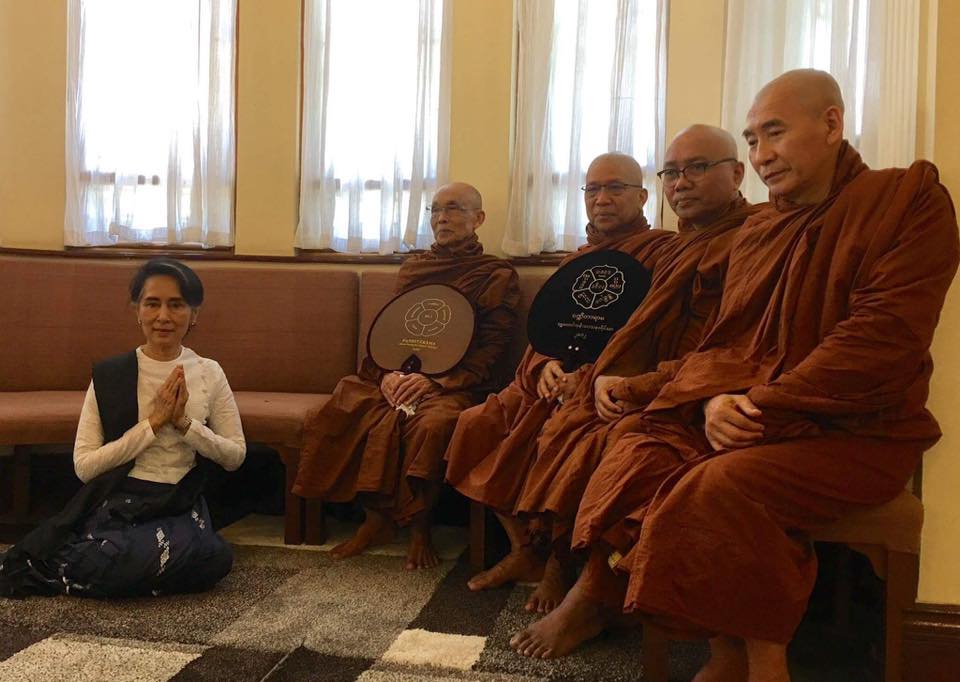








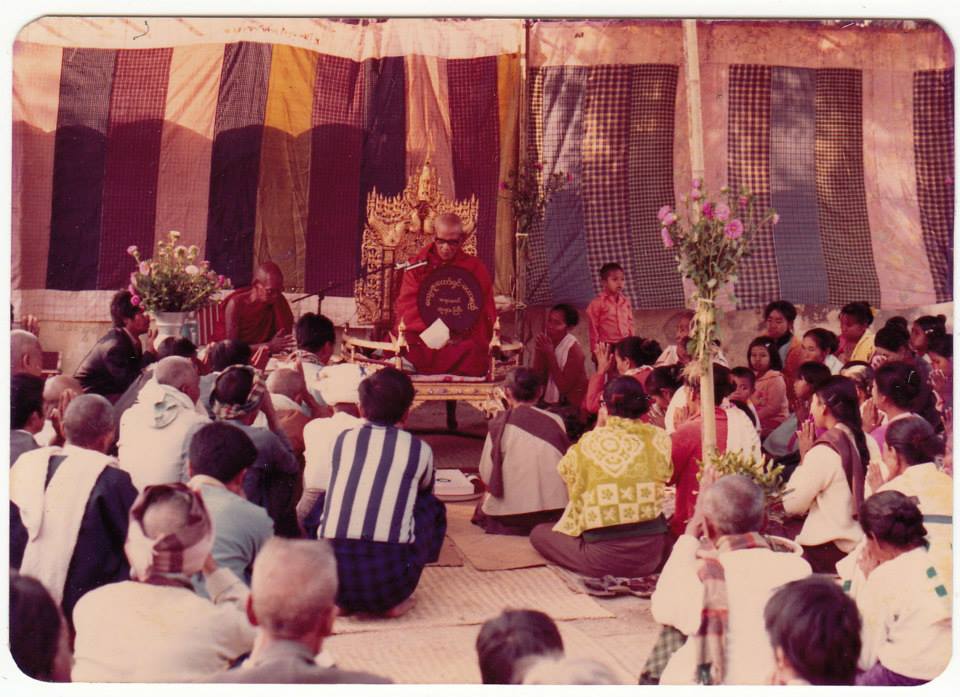





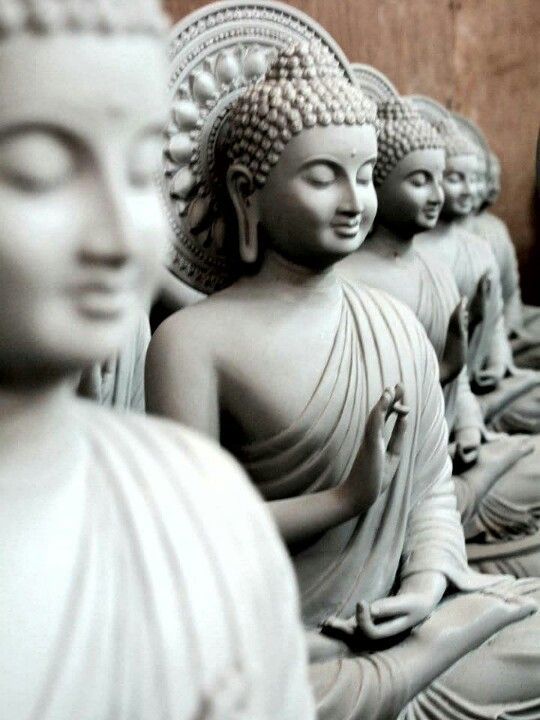
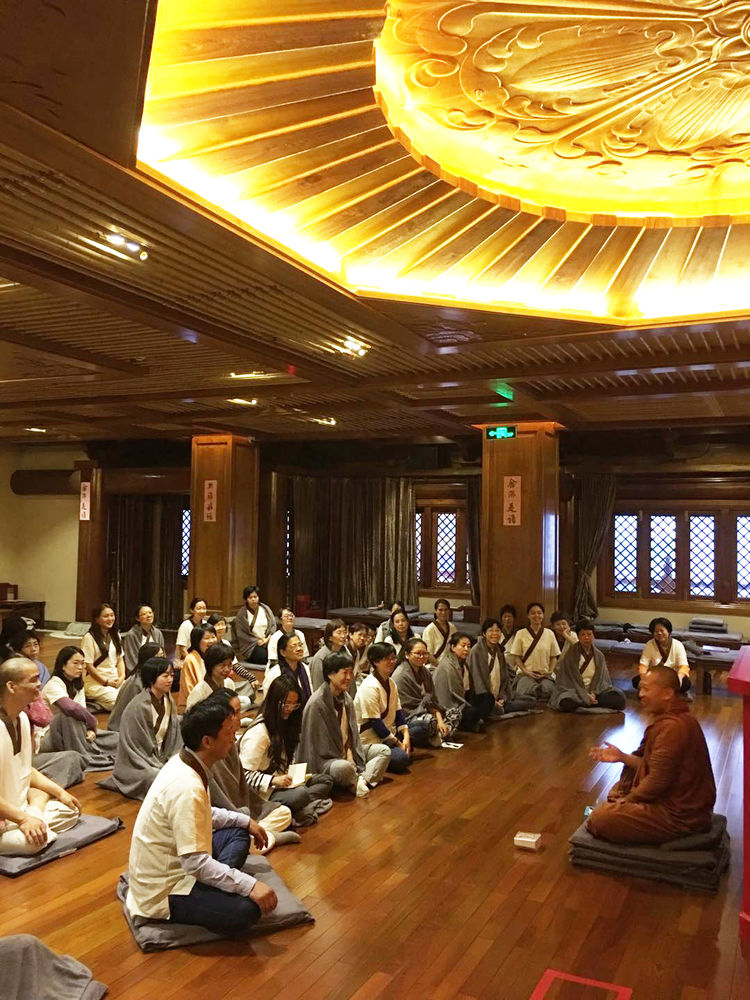




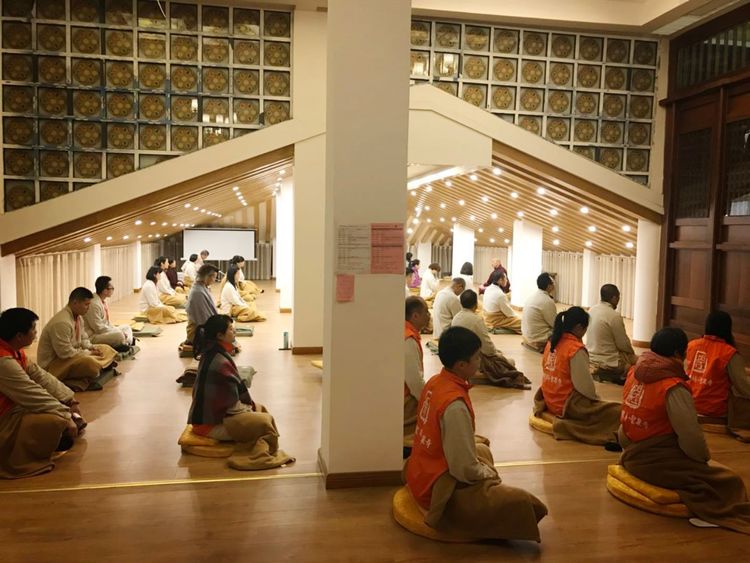
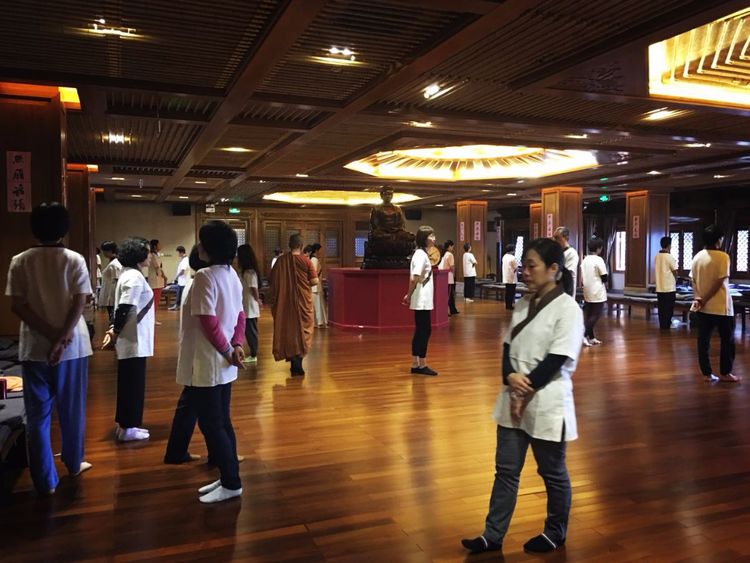
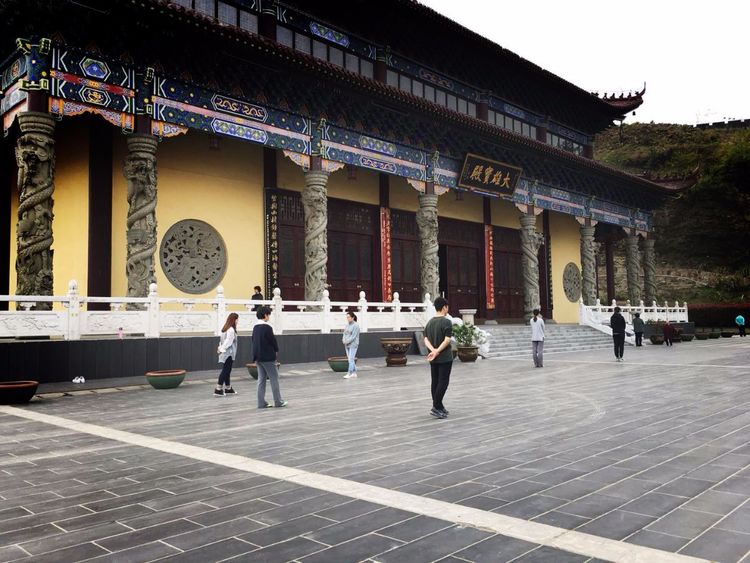
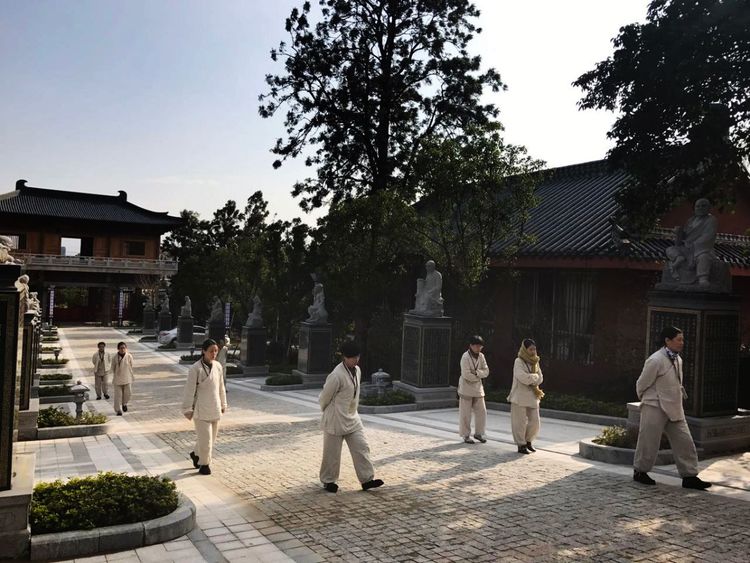



 第六次圣典结集之地——世界和平大石窟(Kaba Aye Mahāpāsāna guhā)
第六次圣典结集之地——世界和平大石窟(Kaba Aye Mahāpāsāna guhā)
 从事修订三藏佛典的工作之同时,[110]马哈希尊者也必须挑起与第六次结集相关的另一项责任。人们一般都知道马哈希尊者承担的这项任务,亦即,他作为「提问者」(pucchaka)的身分。之前曾解释过,“saṅgāyāna”和集众念诵或复审佛典有关。按一般的情形,必须检验每一部巴利佛典。就此,要彻底证明这教导确实是佛陀所说,必须询问下列这些基本问题:
从事修订三藏佛典的工作之同时,[110]马哈希尊者也必须挑起与第六次结集相关的另一项责任。人们一般都知道马哈希尊者承担的这项任务,亦即,他作为「提问者」(pucchaka)的身分。之前曾解释过,“saṅgāyāna”和集众念诵或复审佛典有关。按一般的情形,必须检验每一部巴利佛典。就此,要彻底证明这教导确实是佛陀所说,必须询问下列这些基本问题: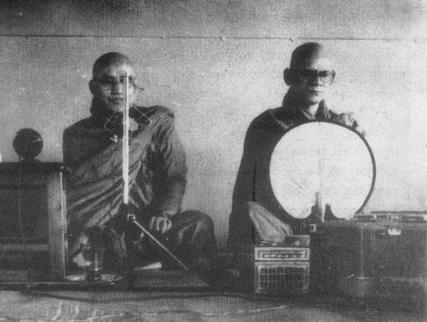 承担提问者与诵答者职责的两个人之中,寻求诵答者一事,很幸运地,容易解决,因为有三藏西亚多.维奇塔沙罗毗旺萨法师(Tipiṭaka Sayādaw Ashin Vicittasārābhivaṃsa)能够记忆并诵出所有三藏的内容。[112]这位西亚多以优异的表现,通过由佛教摄益协会主办的三藏会考的口试与笔试的所有科目。缅历一三一二(公元1950)年通过律藏(vinaya-piṭaka),一三一四(公元1952)年通过论藏(abhidharma-piṭaka),一三一五(公元1953)年通过经藏,所以他获得「持三藏者.法的守藏者」(Tipiṭakadhāra Dhamma- Bhandāgārika)的荣衔。于是,这位西亚多被结集大会的中央组织委员会选为「诵答者」。他生逢其时,值遇结集大会。
承担提问者与诵答者职责的两个人之中,寻求诵答者一事,很幸运地,容易解决,因为有三藏西亚多.维奇塔沙罗毗旺萨法师(Tipiṭaka Sayādaw Ashin Vicittasārābhivaṃsa)能够记忆并诵出所有三藏的内容。[112]这位西亚多以优异的表现,通过由佛教摄益协会主办的三藏会考的口试与笔试的所有科目。缅历一三一二(公元1950)年通过律藏(vinaya-piṭaka),一三一四(公元1952)年通过论藏(abhidharma-piṭaka),一三一五(公元1953)年通过经藏,所以他获得「持三藏者.法的守藏者」(Tipiṭakadhāra Dhamma- Bhandāgārika)的荣衔。于是,这位西亚多被结集大会的中央组织委员会选为「诵答者」。他生逢其时,值遇结集大会。







